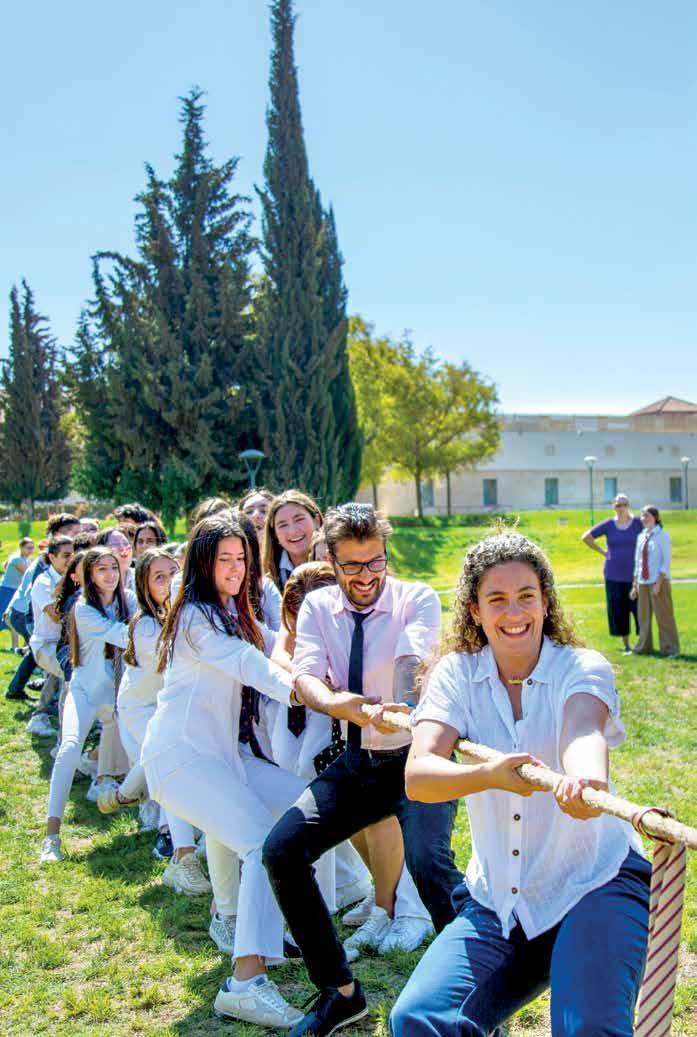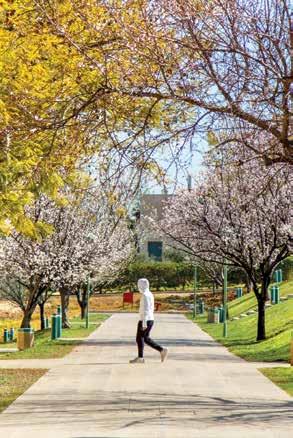
KingsAcademyJordan





KingsAcademyJOR
King’s Academy
KingsAcademyJOR


King’s Academy


KingsAcademyJordan





KingsAcademyJOR
King’s Academy
KingsAcademyJOR


King’s Academy
Middle School Shines in Student Engagement Survey
Interview with a Head of School
Project-Based Learning Grows in the Upper School
The Power of Giving
Challenging Boundaries Through Dance
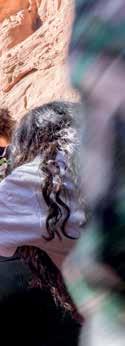
Pitching to Win: King’s Entrepreneurs Aim High
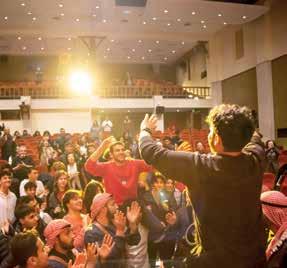
Long Time No See
From Seoul to Sand Dunes
Scoring Big Row for Funds
Building a City in the Sea
Modernity or Colonialism?
Inspiring Future Innovators
Talking about Modern Middle Eastern Art
A Universe of Opportunities
Why a Diverse Student Body is so Important
Archiving Arab Art
Wonderfully Weird
From ski slopes to waterways
Seeing the World through a Lens
Changing Tracks
Finding Balance
King’s Youth Call for Climate Action
Ala Hamdan: Four Yeses I Never Regret
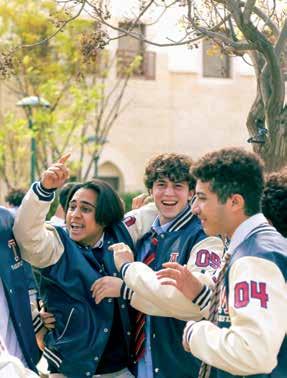

Art in the Real World
How an “Average Student” is Set to Make Waves in Neurosurgery
Artificial Intelligence In Education
Why King’s Academy is good for Jordan
King’s Disability Advocates Working for a Zero Barriers World
The Magic Makers Behind-the-Scenes
Living Her Purpose
Middle Schoolers Connect Through “Workshop”
Exploring the World through a Child’s Eyes
JMP Prepares the Next Generation
Connecting the Dots
Artists for the People
Kia Ora!
is one of the biggest issues we’ve ever produced! Perhaps this is partly a function of school getting back to normal after the two years of reduced activity due to the pandemic. But clearly, it also points to the fact that so much has been going on at King’s that we can barely keep up and cover it all. Towards the end of this year, we saw a transition in school leadership, as Peter Nilsson finished his fourth year as head of school and Penny Townsend took the helm in April. Curious about Penny? Make sure to check out my interview with her on page 4.
Last summer we had our very first all-school reunion — a beautiful event that you can see the highlights of on page 14. Throughout this year we have been celebrating 15 years of King’s in various ways, not least of which through a multitude of engaging speakers who have enlightened our community—you will find articles about those encounters peppered throughout the magazine.
Other highlights in this issue include an article about two fascinating skillbased courses being offered in the Upper School (page 6) and various pieces about the successes of our very special Middle School. And of course, our alumni stories keep getting better, as our alumni get older and do more and more interesting things with their lives.
While Beyond King’s is produced exclusively by the school’s Department of Communications and Publications (from story ideas, writing and editing to photos and design), we have been trying to increase the number of voices that appear in the magazine. I am happy to see a larger number of contributions this year, by faculty, former faculty, and alumni (and even our first student! See page 58). Looking forward to many more future contributions from our community to this magazine that is for all of you.
Vera AzarSpring 2023
Volume 11
Editor in Chief
Vera Azar
Staff Writers
Muna Al-Alul, Suhayb Al-Jawhari ’11, Vera Azar, Ahmed Khalayleh ’15
Designer
Shadi Hasweh
Contributors
Mohammad Abu Hawwash ’19, Lukman Arsalan, Meghna Gandhi, Atithya Ghai, Soha Hmaidan, Lauren Howard, George Morganis, Peter Nilsson, Ruofei Shang ’21
Photography
Sama Al Issa ’23, Shahla' Al-Jawhari ’23, Suhayb Al-Jawhari ’11, Ahmed Khalayleh ’15
Front Cover
Mural created by 7th grade students and Middle School Art Workshop students
Back Cover
Photograph by Ahmed Khalayleh ’15
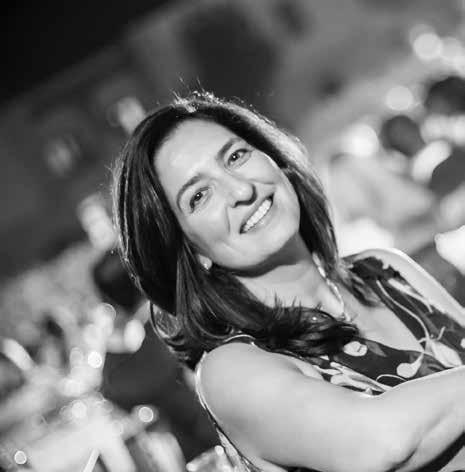
Beyond King’s is published by the King’s Academy Department of Communications and Publications.
P.O. Box 9, Madaba-Manja, 16188 Jordan tel +962 6 430 0230 ext. 1005 email beyondkings@kingsacademy.edu.jo www.kingsacademy.edu.jo
© 2023 King’s Academy, Jordan. All rights reserved. No part of this publication may be reproduced or transmitted without express written consent from the publisher.
It’s great news for the King’s Academy Middle School. The results of a recent independent survey about how engaged King’s seventh and eighth graders feel at school have come back overwhelmingly positive.
Significantly, the National Association of Independent Schools (NAIS) survey results, as identified by the data, show that King’s students are expressing the highest levels of happiness and satisfaction in their experience of school engagement.
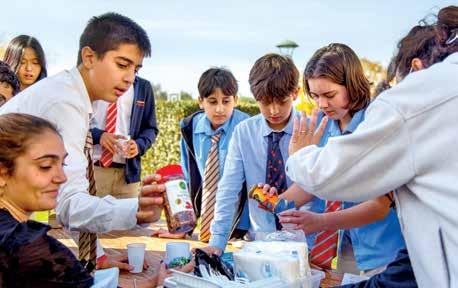
In fact, in comparison with other schools surveyed (based on the mean data of all schools), results showed that King’s students rank considerably happier with their level of engagement than students at all other surveyed schools.
The King’s Academy Middle School was invited to take part in the independent external survey to examine the level of student engagement at school. The survey was initiated by the NAIS, of which King’s is a member school, and conducted by the Center for Evaluation, Policy and Research (CEPR) at Indiana University.
In addition to King’s Academy, which was the only school outside of the United States to participate, some 3,208 students from 19 schools across 10 states in the U.S. took part in the Middle Grades Survey of Student Engagement (MGSSE). The survey focused on strengths and opportunities, as well as weaknesses and threats to student engagement at King’s Academy.
Another important finding of the survey, according to the CEPR report, was that no significant weaknesses or threats to engagement at King’s Academy were identified. In fact, the
results section on weaknesses and threats was removed completely from the report summary due to a “lack of statistically significant differences that would highlight any possible deficits” — meaning, those surveyed had nothing negative to say.
Questions in the survey that highlighted areas of strength and opportunity at King’s included the following: Whether students feel safe at school; how much their school emphasizes analyzing ideas in depth for classes, and how much it emphasizes building positive relationships with students of different backgrounds; how much their experience at this school contributes to thinking critically, applying school-based knowledge to everyday life, understanding why what they learn in school will be important, and treating people with respect.
The survey also examined dimensions such as cognitive growth through personal skill development; level of effort in academic pursuits; cognitive engagement with academic goals, future plans and aspirations;



motivation for learning; emotional engagement with the school; and positive relationships with other students and with adults in the school.
The survey results are welcome news for King’s Academy and in particular, validation for the Middle School, which follows an experiential and competency-based approach to learning and teaching by focusing student learning not on grades, but on the skills, habits and mindsets needed for success.
Student engagement has always been at the forefront of the Middle School experience. Its unique programs — such as minimesters, workshops and Engage activities — enable students to think more creatively, take intellectual risks, and to apply their knowledge in different areas and disciplines. Most importantly, in the Middle School, a great emphasis is put on community spirit, bonding and unity, and on showing kindness and care for one another — helping to make students’ experience at King’s Academy’s Middle School a tremendously positive one.
In October 2022, the King’s Academy Board of Trustees announced the appointment of Stephanie “Penny” Townsend as King’s fourth head of school. Townsend took the helm in April 2023, succeeding Peter Nilsson, who served as head since 2019. Notably, Townsend is the first woman to hold the position. Soon after arriving on campus, Townsend spent some time talking to Beyond King’s Editor Vera Azar.
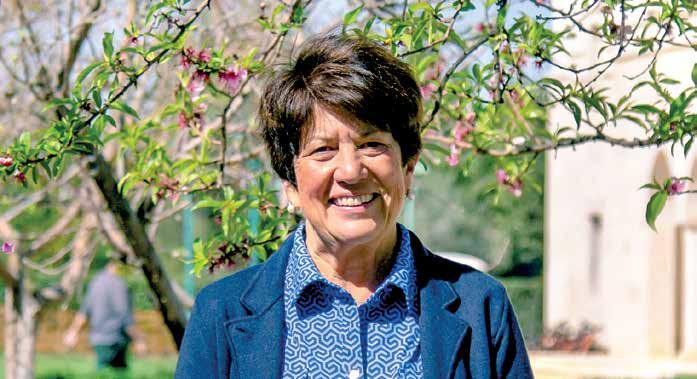
VA: You’ve worked at both boarding and day schools, but for the past eight years you’ve been at a day school. What made you return to boarding schools?
PT: Both types of schools have pros and cons, but I have found the relationships you develop at boarding school are deeper and more rewarding. Students create more school spirit because
it’s home to them. The beauty of boarding school is in the richness of opportunities. Teachers see students in other places than the classroom. Boarding schools humanize teaching because it’s a relationship-based education.
VA: You’ve only been here a short while. But in that time, what are the differences you’ve seen between
King’s and the schools you’ve worked at in the United States?
PT: In general, there are more similarities than differences. But there are some cultural differences. The kind of diversity we have here among the faculty — the expats and the locals — is different from the faculty diversity we have in the US. Also, this is a big campus, it takes students to another level, it has a scholarly stature about it because of the way the students move around campus and go into different buildings and classrooms. The fact that there is more freedom and space to move around informs how students interact.
It’s been interesting arriving during Ramadan, as that has given me another perspective on the culture. How these students manage their lives during Ramadan has been a real treasure to see, the fact that they can fast and go through the academic day. They are gritty. They have a cultural awareness that they
don’t shed when they come to boarding school. And the way the community supports it. In other words, the local culture is still very important despite this being a boarding school.
VA: You’ve moved here with your husband Mike. Is he excited to be here? Is he likely to teach, dean or coach while here, or will he play the role of first spouse to your head?
PT: No, he won’t be the queen’s consort! Mike has had a long career. He’s been an administrator, he has worked in admissions, and he was a masterful teacher in the classroom. He’s a voracious reader – he reads literature better than anybody I know. He loves students, he’s a softie, and he’d will want to figure out where he can be most useful.
VA: You’re a mother and a grandmother. Is this the first time you have lived so far away from your family? How did they feel about you taking on this job?
PT: It’s certainly the farthest plane ride from anybody! If my family wasn’t supportive, they didn’t tell me. I’ve lived abroad before and I’ve always had an adventurous spirit. My being here has also opened a whole other world to my family. They’re super excited to visit.
VA: Global citizenship is a core principle at King’s. And what more than knowledge of languages can make one a global citizen? Yet at King’s, as elsewhere, world languages often get the short end of the stick. As a former teacher of Spanish yourself, do you think we need to change that?
PT: Any university would be very impressed to get a student who speaks three languages — English, Arabic, and something else. There’s a seemingly trite expression that I’ve heard about how knowing a second or third language gives you another soul. But it is not trite. Being able to communicate in another language — even if not fluently — is a whole way of learning about the world. We need to look at our language requirement, but at this point I don’t know enough about all this to decide what we can do.
VA: King’s already has many women in leadership positions – in fact we are a majority. But we’ve never had a female head of school. What message is King’s sending out to the world by having a female head?
PT: Empowering girls is important to me. It’s good for students everywhere to see a woman in leadership. But it’s not enough to have the female leader and think we’ve got that covered. We also have to empower women across the board. I noticed a club here without girls in it, and I said ‘you need more girls’. Boys outnumber girls at King’s so I’m sensitive to that.
VA: How important is it to involve parents in decision making at King’s? And how do we keep the right balance in terms of getting buy-in while ensuring we stay true to our mission and goals?
PT: Communication is key. Parents help inform decisions, but they don’t make them, and all parents have different
aspirations for their own children. It’s a partnership but we’re the senior partners because we are the educators. At the same time, we can’t do anything without parent buy-in but we understand that we’ll never have that 100%. Parents have to understand what they’re signing up for. But if they are unhappy, we have to understand why that is to decide what we can do about it.
VA: You’re already making it clear that you love to be around the students. Do you also see yourself teaching, advising or coaching or do you think the huge amount of work you have as head of school will not allow that to happen?
PT: I can see myself picking up a Spanish course. I would love to do a walking club or take the students horseback riding. It’s good for them to see the head doing other things. I’ll probably also have advisees — I’ve always had advisees.
The appointment of Penny Townsend as King’s Academy’s fourth head of school in October 2022 brought to a close a global search effort that began in July 2022. According to the announcement by the Board of Trustees, in their search process the trustees sought input from many members of the community to have a clear sense of what King’s needs in its next leader, and how to begin shaping the school’s future.
Townsend emerged as the clear first choice of the search committee. An accomplished educator, a passionate community builder, and a thoughtful, collaborative colleague with more than three decades of experience in independent schools, Townsend has worked as a teacher, coach, advisor, dorm parent, administrator and head of school.
Townsend was most recently head of school at Ransom Everglades School in Florida from 2014 to 2022. Prior to Ransom,
from 2006 to 2014, she served as head of school at the Pennington School, a day and boarding school in New Jersey. From 1983 to 2006, Townsend served in many roles at Taft, a boarding school in Connecticut. There, she was an AP Spanish teacher, dormitory faculty, assistant girls’ ice hockey coach, head of the Modern Language Department, director of the Language Learning and Resource Center, director of the Taft Summer School, and dean of the faculty. She began her career in education as a Spanish teacher at Northfield Mount Hermon School, a boarding school in Massachusetts and her own alma mater.
Townsend received her Bachelor’s degree cum laude in history from The University of Connecticut in 1979, and her Master’s degree in Spanish Language and Literature from Middlebury College in 1986. She graduated from The Northfield Mount Hermon School in 1975.
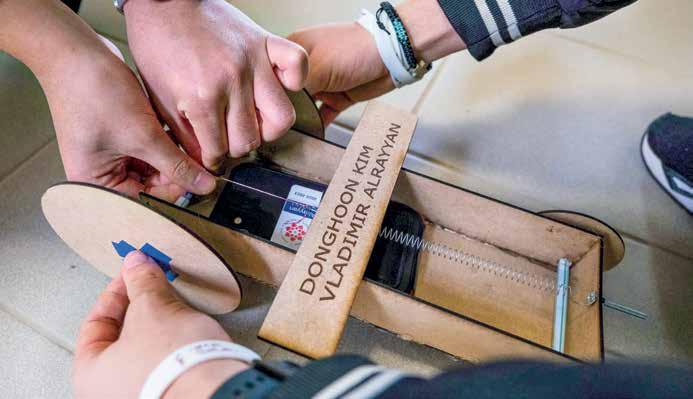
Two Capstone courses designed specifically for King’s Academy prove to be a breath of fresh air for students and teachers alike.
BY SUHAYB AL-JAWHARI '11In a world where the internet provides us with an abundant amount of information, the question arises: do we need content-heavy courses anymore? Such courses could be said to release students from their responsibility as active seekers of knowledge, and in light of King’s Academy’s motto “floreat scientia,” (let knowledge flourish), that would surely be a bad thing.
King’s Academy is responding to such questions by establishing more
courses that offer students the opportunity to use their curiosity as a driver for knowledge, and to develop the skills to harness the abundance of information to benefit their learning goals. Two King’s courses that currently fit this bill are the new AP Capstone Seminar Global H2O: Focus on Jordan designed by visiting Deerfield Academy faculty member Andy Harcourt, and the Engineering Design course designed by King’s faculty member and alumnus Mohammad Al Quraan ’10.
Harcourt, an AP Biology and science veteran who took a year off from Deerfield Academy to teach the new course at King’s Academy, has always been interested in finding new ways to incorporate other disciplines into his work. After incorporating English and history into his biology course, Harcourt came up with the idea of a pilot Capstone course, upon a request by the College Board, under the theme
of global water issues. Over two years, Harcourt collaborated with faculty members all around the United States, developing a vibrant course for Deerfield that melded interdisciplinary and global learning, research, argumentation, collaboration and presentation.
In 2021, Harcourt received a call from former colleague and then Head of School at King’s Academy Peter Nilsson, who asked whether he would be interested in adapting the course on water issues for Jordan, and to teaching it at King’s. With Jordan being one of the most water-scarce countries in the world, a course teaching youth about water security issues could not be more important, or timely.
In Harcourt’s class, students have been robustly learning and engaging with the world in the course of their studies. They have debated whether the Dead Sea should be revived, researched the water situations of countries around the world, learned about the geo-politics of the Jordan River, examined water microbes under a microscope, created podcasts on water issues, interviewed college professors for their research, met with government officials to present their findings, and shared their knowledge with students in their home countries as far away as China.
According to Harcourt, the course develops students’ skills, and the
information tags along to drive that development. “Many times [the students] are working as a team, and the synergy allows them to produce materials that are just far beyond what they could do on their own,” says Harcourt.
One student of Harcourt’s has set her heart on studying environmental science at university after taking his course. It also inspired her to dig deep into a topic not studied in class. “We didn’t learn much about pastoralism [animal husbandry where animals are released onto outdoor lands for grazing, historically by nomadic people who moved around with their herds] and its negative effect on water,
but it is something that I am currently researching on my own,” says Bana Haroush ’24. “With this course, you choose the path that you want to go on. You use your curiosity and creativity and develop your research skills. It’s an all-in-one course.”
The engaging nature of the course has helped it gain a loyal following among its students, who have embraced burrowing deep into research, and developing stronger writing, teamwork and presentation skills.
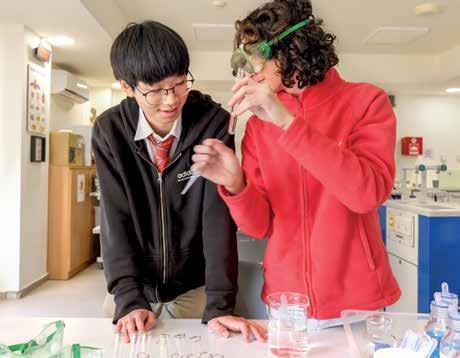
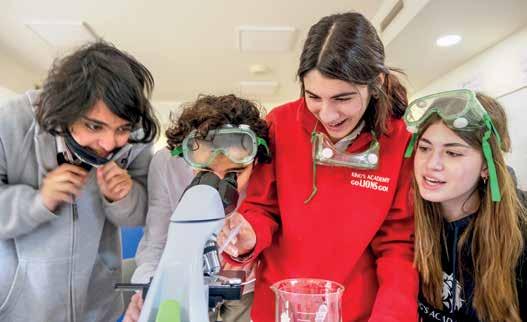
According to Brandon Winans ’23, Global H2O made him start to seriously consider the kind of future he wants. “With this course, you don’t learn about the past,” said Winans, “you learn how to change the future.”
Mohammad Al Quraan ’10, an Irbid-born alumnus of King’s Academy, is also one of the earliest graduates of the school’s Summer Enrichment Program (SEP). For over a decade, he has been returning to give back to the program that launched his journey at King’s, as a volunteer teacher and organizer for SEP. After working in geotechnical engineering consulting for a couple of years, Al Quraan found himself being called by another passion: teaching. His work in both fields motivated him to think of a way to combine engineering and education into one career.
Al Quraan set his sights on his alma mater, proposing an engineering class for Upper School students. “When I met with [former Head of School] John Austin in Boston, it turned out King’s was looking for something like that,” says Al Quraan, who was then asked to join King’s as a full-time faculty member and to develop his proposal for an engineering class into a STEMrelated Capstone course.
Al Quraan started his teaching journey at King’s as a mathematics teacher in the Middle School, which became both a playground and testing ground for the development of the
distance or by the accuracy of their claim of how far it will go. Through designing and building their cars in groups, students learn the technical basics of engineering design through testing and iterations, design by fabrication, and design by building.
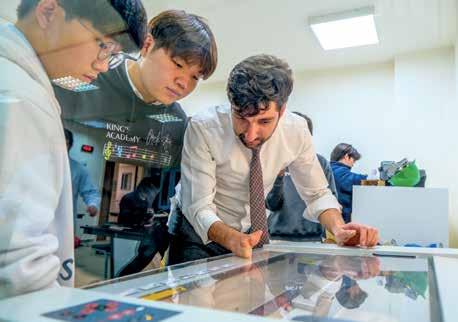
To support student learning, the school acquired machines to form a makers space, including a laser cutter, a 3D printer and a tool shed. Through the creation of their cars, students learn how to work in a team, to make multiple iterations until they get it right, and to work on programs such as Inkscape and Adobe Elements. Even if
Quraan, this is one of the strengths of the class. “They're learning so many skills, but it's driven by what they want to learn about and what they want to work with. That is when the students give you more, they give you all of their energy and their dedication because they want to work.” This year, after consulting the school’s operations department on its needs, students decided to work on creating a sustainable energy heating system.
Now in its fourth year, Engineering Design is described as one of their favorite courses by its students. Asked if planning his own projects was frustrating, Adam Zaatar ’23 replies: “This class is a breath of fresh air. High-level classes usually have core curriculums, but for this course we were able to work on our projects the way we wanted.”
Hamza Mustafa ’23 is now applying the time and project management skills he has learned through this course in other areas. "It taught me how to take on a big project and split it into digestible tasks,” he says.
Meanwhile, Taehoon Yu ’23 says he has found freedom in this course. “In class, I can express myself. I can talk about my ideas and opinions and be creative about the topic.”
engineering course. “The Middle School allows you to do a bit more project-based learning,” says Al Quraan. “There isn't as much emphasis on a standard way of assessment, so, I got to explore a lot.”
Flexibility in the classroom allowed for reiterative growth for Al Quraan as a teacher but also for the engineering class. “This flexibility taught me how to adapt to students’ abilities and needs at the same time, which is very helpful for a course like the engineering one,” he says.
As a project-based learning course, Engineering Design is split into two parts. Firstly, the students are tasked with designing and creating a car that can go a certain distance. They can build it out of any raw material, and they are graded based on the maximum the car fails, the majority of their grade
the car fails, the majority of their grade is based on their reporting of the project and the presentation that follows. They are graded on their demonstration of learning and growth, not on the outcome of their project.
In the second semester, students are tasked with tackling engineering challenges in Jordan. This allows for any topic or problem to be put on the table and to be actively addressed by students, who have access to consultants for their design, before presenting their projects at the end of the school year. Students have a small budget to purchase any necessary parts for their project, which helps them work on their budgeting and project management skills, an important part of any engineers’ professional toolkit.
The students choose the topic for the second semester. According to Al
While the implementation of these two courses at King’s has been a great success, the question of whether there is still a need for content-heavy courses still looms. How can educators make more space for project-based learning and how can they inspire students as well as teachers to be active members in learning that creates change around them?
According to Nilsson, “a school curriculum should be rigorous and relevant. It should drive students to excel, be connected to their lived experiences, and focused on the unique setting of what can only be done in a particular setting.” That is why King’s Academy will continue to seek out and support courses like Engineering Design and Global H2O: Focus on Jordan, to ensure that students are provided with engaging learning experiences that help them harness “the tools and challenges of today to develop into the leaders of tomorrow.”
You may only be a person in this world, but for someone, you are the world." This quote by
Gabriel
Garcia Marquezsums up the power of philanthropy and the impact it can have on someone's life.
Sarah is a gifted student whose story is a prime example of this impact. With a strong personality and excellent academic grades, Sarah was admitted to one of the most prestigious private universities in the region. Excited to share the news with her parents, she soon faced a daunting obstacle — the tuition fees were too high for her parents to afford. Undeterred, Sarah sought out every funding agency and philanthropist she could find, determined to turn her dream into reality. Just before the start of the university term, she received a life-changing phone call from the financial aid office: she would receive a full scholarship.
Today, 10 years later, Sarah has successfully completed her education and established her career, but she has never forgotten the hand that lifted her up. She wanted to give back, but her
income was not enough to support a scholarship. She realized, however, that even a small donation could help someone in need.

Here at King's Academy, many students have similar stories to Sarah's. Without the support of generous donors, they may not have been able to attend the school and receive the education they deserved. King's Academy was built on philanthropy, but as a young school, its endowment is not enough to sustain itself. Support is crucial to fulfilling our mission of developing and empowering students from diverse backgrounds, fostering independent thinking and preparing new generations to make a positive impact on the world.
Philanthropy comes in many forms, from volunteering and donating money, to hosting events to support the school. It is a critical way for alumni and friends to positively impact the school and leave a lasting legacy. It doesn't have to be in the form of large financial donations either — participation in fundraising campaigns, especially among alumni, is essential. Philanthropy allows the school to
experiment and innovate, and it gives students the confidence to think outside the box and develop new ideas, knowing they have support.
For philanthropists, funding is crucial to maintaining the quality of education at King's Academy and investing in the future of students who will benefit from their support. The impact of philanthropy cannot be overstated, and it is a rewarding experience for donors to see the results of their contributions. Alumni give back to show their gratitude for the opportunity to study at King's Academy, and it can be a source of inspiration and motivation for others.
As the saying goes, "when God blesses you financially, don't raise your standard of living. Raise your standard of giving". When fundraisers close a gift to the charity they represent, the donor is often the happiest person in the room. Giving back is a fulfilling experience, and at King's Academy, it is a chance to make a lasting impact on the lives of deserving students.
new dance production performed at King’s Academy marks 15 years of creative collaboration between the school and internationally acclaimed artist Yoshiko Chuma.
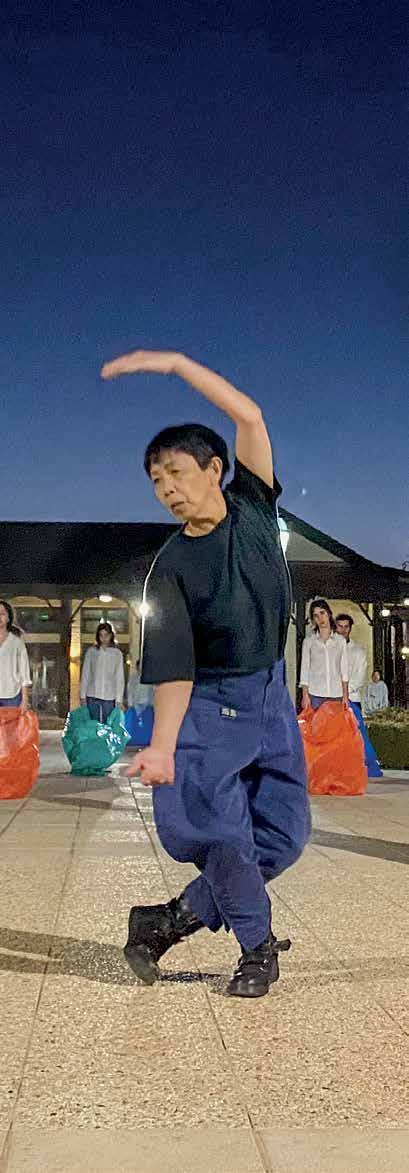 BY MUNA AL-ALUL
BY MUNA AL-ALUL
For the past 15 years — almost as long as King’s Academy’s doors have been open — Yoshiko Chuma has been traveling to Jordan to host one-of-a-kind dance workshops for King’s students. An internationally acclaimed artist and choreographer, Chuma is also the artistic director of The School of Hard Knocks, which she established in New York City in the 1980s.
Working alongside her longtime protégé and creative collaborator Ryuji Yamaguchi, King’s Academy’s dance program coordinator and dean of residential life, Chuma has been offering King’s students the unique advantage of her tutelage, as well as the opportunity to participate in one of the many dance productions the pair have created together and performed in Jordan and Palestine.
Known for producing thought-provoking work that is neither dance nor theater nor any other pre-determined category, Chuma has been described as a “firebrand in the post-modern dance scene of New York City.” Her work has taken her to over 40 “out of the way” countries and brought together over 2000 artists of every genre. Thanks to her longstanding commitment to King’s Academy over the years, some 32 international artists have followed in her footsteps and visited King’s to host artistic workshops for its students.
Chuma’s own “brain to bone” workshops at King’s have helped students acquire a better awareness and understanding of their movements, how to refine those movements and, in turn, to consider how they can develop their consciousness through movement.
“My artistic concerns are individuality, integration and reinvention,” says Chuma. “I allow artists to retain their individual existence and ask them to look inside themselves and at their surroundings to find a different path of expression.”
In their latest collaboration with King’s Academy, Chuma and Yamaguchi created and co-directed a new dance production entitled Endless Peripheral Border that was performed in January at the school with the participation of around 50 students and faculty members as well as a number of professional musicians and dancers from Amman.
A second performance of Endless Peripheral Border also took place in Amman, produced with Midan Dance Lab, at which Yamaguchi and King’s student Kenzy AlDaher ’23 performed alongside 20 professional artists at the Jordan National Gallery of Fine Arts.
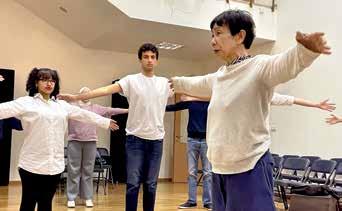
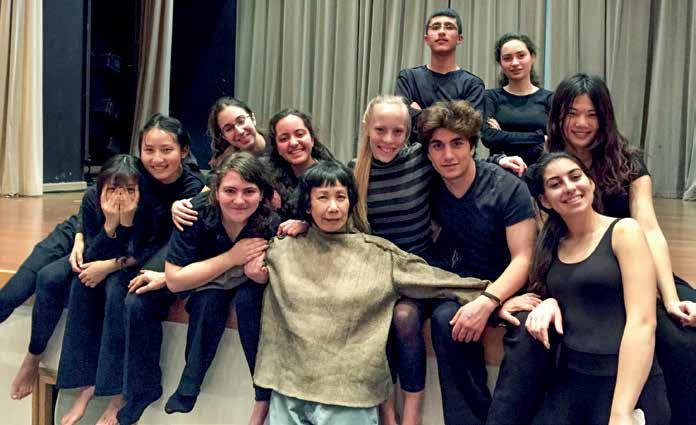
“Endless Peripheral Border can be described as a whirlwind of an experience,” says Yamaguchi. “The performance invites the audience to visualize the theme of
“Borders — physical or imaginary — separate the experiences between those on the inside, those on the outside, and those who may travel between them,” explains Chuma about the performance’s concept, adding: “I always use many props in my creations; for example, the performers used red trays as an image to deliver stories — perhaps to deliver images of war, or each person’s secret journey.”
Chuma and Yamaguchi have collaborated on some 10 productions in Jordan and Palestine that address the themes of borders, conflicts, identity and stories, with Endless Peripheral Border being the latest.
Commenting on the King’s community’s positive reaction to the production, Yamaguchi said: “It was refreshing for the audience to see us challenge conventional boundaries of performances, with the audience traveling through the campus, and by having them witness up-close performances by a diverse cast of dancers representing different styles including contemporary, hip-hop and breakdance, as well as vocalists and musicians.”
borders and their impact, with dancers performing together in a ‘choreographed chaos’ that displays the hopes and despair that our world faces today.”
Gathered in front of the Hess Family Dining Hall, where the performance at King’s started out, some 150 audience members were witness to a spectacle of 50 performers creating dynamic movements in the air by waving large colorful bags, accompanied by two professional vocalists and an oud player. The audience, led by the performers, was then taken on a long promenade across campus, eventually arriving at The Gallery, where the second part of the performance took place.
On April 13, King’s Academy celebrated the graduation of the first cohort of its students to complete an entrepreneurship program organized under the Tawfiq Fakhouri Chair for Entrepreneurship, Innovation and Leadership.
Offered as a semester-long course at King’s Academy during the spring 2023 semester, the entrepreneurship program concluded with a shark tank-like pitch competition at which 21 students divided into six teams presented their business ideas to a panel of judges.
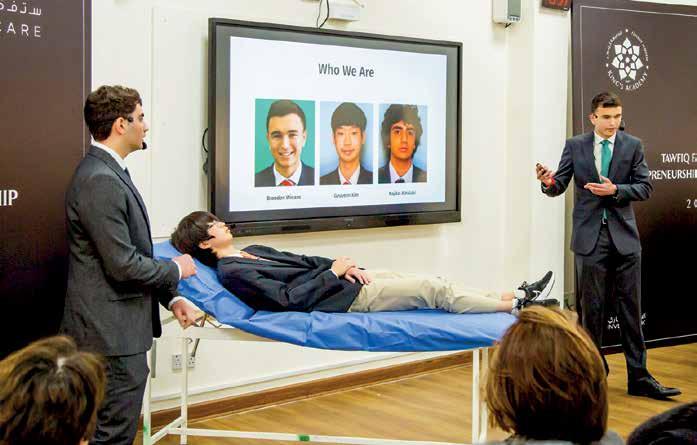
The Tawfiq Fakhouri Chair for Entrepreneurship, Innovation and Leadership was established in the
spring of 2021 at King’s Academy by sTF5 Care, a foundation that works with grassroots organizations to deliver evidence-based health and education solutions to Jordanian and Palestinian communities.
Thanks to sTF5 Care’s support, and the generous sponsorship of INVESTBANK and Orange Jordan, what started as a single co-curricular course in 2021 has since expanded into a holistic curriculum catering to the entire King’s community.
The program offered by the Tawfiq Fakhouri Chair consists of four pillars. The first pillar, the entrepreneurship course, evolved from the co-curricular into an elective course led by King’s Academy alumna Dina Shawar ’10,
currently managing director of Endeavor Jordan.
The three remaining pillars include the Entrepreneurial Thinking for Educators Program powered by Endeavor Jordan, to build the entrepreneurial mindset among King’s staff and faculty; the Entrepreneurs Club — a student-led club established to enable students to act on their entrepreneurial ideas and create handson impact; and a series of speaker sessions organized by the club.
Welcoming the participants and attendees at the opening of the pitch competition and award ceremony, Head of School Penny Townsend emphasized the importance of entrepreneurial thinking at King’s.
“You do not need me to list the challenges the next generation will face as they move on from King’s Academy to university study and beyond,” said Townsend. “The tasks at hand are daunting and they require new habits of mind — new mindsets, different skills and an entrepreneurial spirit.”
Thanking the program sponsors INVESTBANK and Orange Jordan, as well as Endeavor Jordan for providing training to King’s faculty who will model that mindset for students, she continued: “Entrepreneurship is more than a collection of courses or a new business idea. It is a mindset that inspires innovation, risk-taking and seizing opportunities. It is a mindset that has to extend across all the disciplines we teach at King’s.”
Addressing attendees at the ceremony, sTF5 Care Board Member Maram Samara Fakhouri spoke of her family’s pride in establishing the Entrepreneurship Chair in memory of her late father-in-law, the Jordanian banker and entrepreneur Tawfiq Fakhouri.
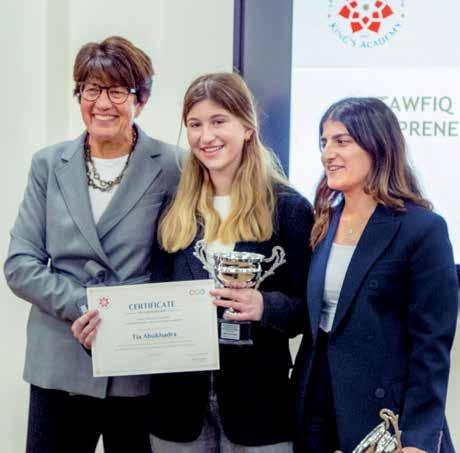
“Tawfiq Fakhouri was not just a mentor, but also a beacon of hope to all who knew him,” said Fakhouri. “He was a visionary, a risk-taker, and a dedicated leader who believed in the power of optimism and innovation. His entrepreneurial spirit was contagious, inspiring his children and many around him to pursue their dreams and make a positive impact on the world. He embodied great integrity, humility and generosity, always willing to help others and give back to his community.”
The establishment of the Entrepreneurship Chair was a fitting tribute to Tawfiq Fakhouri’s legacy, she added. “It will empower ambitious young entrepreneurs to develop their skills and become successful business leaders. We hope it will foster the same entrepreneurial spirit he embodied and inspire many others to pursue their dreams and create a better future for themselves and their communities.”
Moving on to the pitch competition, where students were able to demonstrate the knowledge and skills they acquired through the program that will help them build future ventures, King’s welcomed five external judges: Minister of Digital
Economy and Entrepreneurship H.E. Ahmad Hanandeh Rainmaking CEOMENA and Africa Abe Seksek Oasis500 CEO Luma Fawaz, Digital Health Investments and Partnerships Vice President Lana Ghanem, and Flat6Labs Program Director Tamer Al Masri.
Next, the six teams of students took turns presenting their pitch decks, which included a range of creative and inspired business ideas across different sectors including: an improved integrated UI hospital database; and under-18 financial management app; an online educational hub; an online fitness platform; a digital language learning platform; and an environmentally friendly insect protein business.
Each team was given a few minutes to pitch their business idea, followed by a question-and-answer session with the judges. Impressing the judges with their professional presentations, convincing arguments, and knowledge on all aspects of their business ideas, the students then waited with bated breath as the judges conferred to decide on the top three winning pitches.
Taking first place for their business idea were Aya AlKaraki ’23, Tia Abukhadra ’24 and Montaser Oran ’25
for Tadaros: The Educational Hub. In second place were Noor Elian ’25, Wyatt Wunker ’25, Asad Kedairy ’25 and Maria Jarun ’25 for their insect protein business idea. Taking third place for their fitness business idea, F4L: Fit for Life, were Tarek Haroun ’23, Jafar Fakhouri ’23, Yousef Taha ’23 and Ziad ElHout ’23.
The judges praised all the competitors for their remarkable work developing their startup business ideas, noting that many were ready to be incubated immediately. In addition to trophies, the competition winners were awarded cash prizes that will be used for educational and entrepreneurial purposes, as well as mentorships with successful entrepreneurs.
Most importantly, the program offered students the opportunity to foster an entrepreneurial mindset within a creative, supportive space that encourages them to learn, iterate, fail and grow; to accept failure and learn from it; to learn to be problem solvers and critical thinkers; and to navigate challenges and implement solutions in the face of uncertainty and risk — skills crucial for the success of future endeavors.
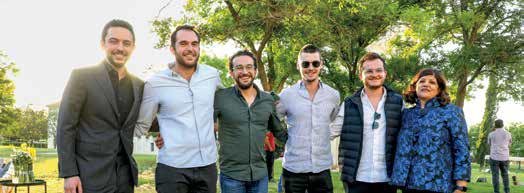
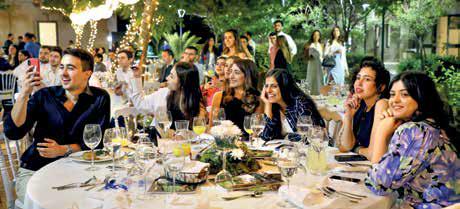
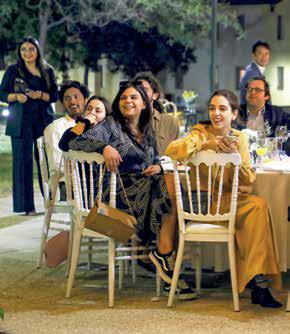 BY MUNA AL-ALUL
BY MUNA AL-ALUL
The month of May 2022 marked the ultimate homecoming, as King’s Academy invited back all of its alumni from every graduating class, from 2010 to 2021. While plans for reunions over the past couple of years were regrettably postponed due to challenges posed by the pandemic, everything came together this year, resulting in the school’s biggest reunion event to date.
The reunion took place over four days, starting with a special reception and kick-off gala dinner on campus that was attended by over 200 alumni, in addition to current and former staff and faculty, including founding Head of School Dr Eric Widmer and his wife, former Dean of the Faculty Dr Meera Viswanathan.
Widmer and Viswanathan addressed alumni during the gala dinner, recalling fond memories of King’s earliest years Head of School Peter Nilsson and Chief
also welcomed those gathered in the by faculty member Rola Jaber who took alumni on a nostalgic and often hilarious trip down memory lane with a presentation of older and more recent photos, videos and anecdotes.
Other events organized over the four days gave alumni the opportunity to reconnect with their friends and teachers, and also to make new friends from among those in the 12 different graduating classes. Nilsson kicked off the activities with a traditional school meeting in the Abdul Majeed Shoman Auditorium, where he talked about how important it was for the school to remain connected to its alumni, and about the school’s vision for growth in the coming years.
President of the King’s Academy Alumni Association (KAAA) Hayat Abu Samra also spoke to alumni about ways to keep connected, such as through two platforms created to help alumni get in touch with each other as well as to provide career mentoring. Current students entertained the audience with
dance performances, which resulted in alumni getting to their feet to join in on a lively dabkeh dance. A delicious brunch in Meera’s Garden in front of Beit al Mudeer with tasty delights provided by Blue Fig and Sugar Daddy’s Bakery was followed by the Lion’s Cup, where alumni and faculty squared off against each other in friendly but spirited competition during soccer and basketball matches, with prizes and gifts generously provided by Interbrands and Orange Jordan.
The next day, alumni had further opportunities to reminisce about their time at King’s, and to provide their own reflections and hopes for the future of King’s during panel discussions, networking “nooks,” and at a sit-down lunch reminiscent of their days as students. Visits to dorms and recreations of “weekend activities” — including open mic, karaoke, sports and hangouts — were a fun way to round out the day’s activities.
Another special dinner, this time for the classes celebrating their five and 10-year reunions (2010, 2011, 2012, 2015, 2016 and 2017), took place on the third evening at the St. Regis Hotel. On the fourth and final day, the reunion concluded with all alumni invited to a relaxing nature retreat at Mountain Breeze Lodge in Salt where they enjoyed spending time together over breakfast and fun activities.
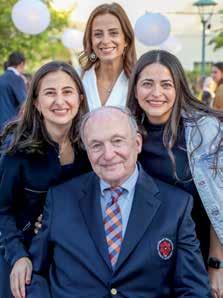


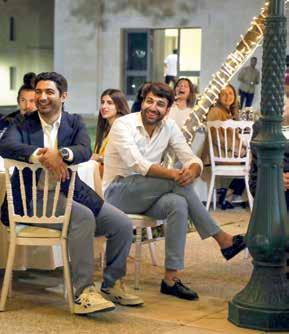
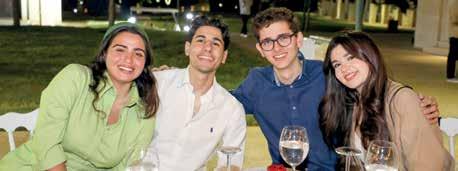
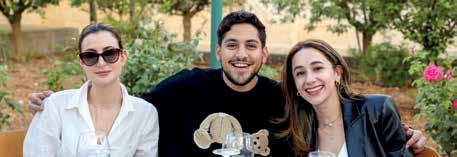

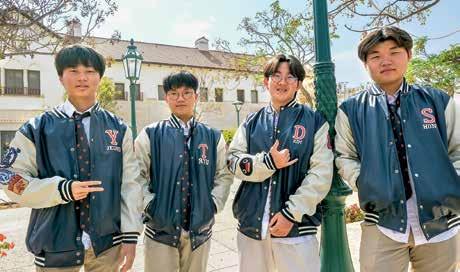 BY AHMED KHALAYLEH ’15
BY AHMED KHALAYLEH ’15
Some consider South Korea home. Others have yet to determine what home is. Some were surrounded by peers from all walks of life. Others stuck out like a sore thumb. The paths that King’s Academy’s Korean students have taken to get to where they are now could leave one’s head spinning, but their experiences add a depth and richness to the community. King’s Academy is not a typical boarding school, and these are not your typical boarding school students.
For most people, growing up is simple. You live in the same place, surrounded by the same people, with the occasional switch in schools. But for most of the Korean students, it was far from simple. While Seungming Hong ’23 and Seunghyeok Lee ’24 may have spent most of their childhood in South Korea, studying the Korean curriculum, the rest found themselves in a different country every five years or so.
Shihun Lee ’23 was born in Austria, attended kindergarten in South Korea, and continued her education in Switzerland and then the Philippines, where Yoonhoo Kim ’25 spent his first through fourth grades.
Hyeyoon “Haily” Cho ’23, Minseo Kim ’24, Heejae Shin ’25 and Seonju Ko ’25 were all born in South Korea, but within just a few years, their paths diverged drastically. Cho spent more
than five years in India, Shin spent her early school years in Dubai before returning to South Korea, while Ko bounced back and forth between Iran, South Korea and Saudi Arabia, before they all found their way to Jordan. Kim, on the other hand, lived in Syria until the war broke out, after which she moved to Jordan and attended elementary school, studying all subjects in Arabic under the national curriculum. Meanwhile, Jason Lee ’24 was born on US soil, spent six years in India, and the next five years moving to South Korea, South Africa, Lebanon and Jordan.
“I wanted to be like one of them,” says Minseo Kim, describing her early school years in Jordan, “but it was really difficult.” Being the only non-
Arab in her school, Kim never felt she could truly fit in, despite her fluency in the Arabic language and culture. “I didn’t have many friends because of my nationality.”
Students at the time brought their own lunch to school, typical Arab food prepared by their parents. Kim, on the other hand, brought in Korean food prepared by her mother, which led to unwanted attention from her peers. “Because they lacked information about where I was from, they would assume things about me and would mock my language,” she adds.
Kim later spent a year studying in New Haven, Connecticut, where she found herself surrounded by students from other backgrounds. Despite this year of respite, it would be some time before she truly felt she could fit in anywhere.
It wasn’t until she came to King’s that she felt she could finally be seen beyond her appearance and be known for who she is.
Having to change schools and friend groups so much, Jason Lee learned to become very sociable to accommodate his rapidly shifting social life. “I liked experiencing new culture, and I take it for granted sometimes, but I remember crying moving from Korea to Lebanon because I was tired of moving around too much,” he says.

As the daughter of an ambassador, Shihun Lee also learned important social skills, but for very different reasons. “I always had to go around with my parents on these official visits with diplomats. I couldn’t act like a crazy child, because I was representing my parents, who were representing Korea.” These visits, in addition to her exposure to so many cultures during her youth, forced Lee to grow up fast, developing a strong sense of empathy and an ability to communicate effectively at a young age.
Arriving at King’s, some students found that their struggles, academic or social, were due to language barriers. Hong was the first to point out that classes were much harder now that they were in English, and it would take a couple years before he was again comfortable with his academics. Despite his year in New Zealand that bolstered his English, Seunghyeok Lee echoed this sentiment, adding that the challenge was not only in relearning everything in English, but also in simultaneously trying to learn Arabic.
These struggles extend beyond the classroom, bleeding into social circles and leading to linguistic exclusion, an issue Cho is attempting to address as proctor. Cho designed a training in which proctors sit in groups, in which two or three students have an entire conversation in a language the others don’t speak, in an attempt to bring attention to the experience of international students who don’t speak Arabic.
Staying in touch with Korean culture looks different for each of these students. While some were immersed in it during their youth, others had to take extra steps to maintain their language, such as attending “Hangul Hakkyo,” a Korean language school designed for heritage speakers in foreign countries. Some relied on their time at home with
their parents, Korean church-goers, or other Korean students at their international schools abroad to maintain that connection with their language and culture.
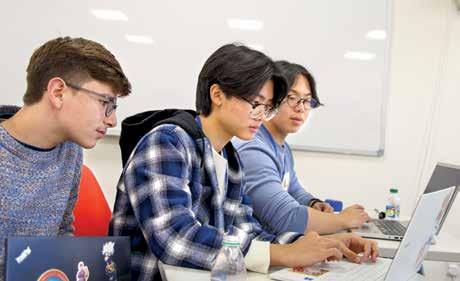
At King’s, the Korean students have each other, describing the “subculture” they have amongst themselves as being very similar to what they would experience in South Korea – albeit slightly modified. While back home students would bow to their older peers, at King’s Korean students have dropped that habit, but continue to refer to each other as “older sister/brother” or “younger sister/brother.” They can bond over Korean pop culture, stay upto-date on the latest trends, and even celebrate their culture through the
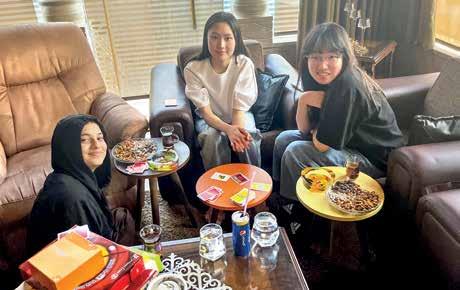
Cho designed a training in which proctors sit in groups, in which two or three students have an entire conversation in a language the others don’t speak, in an attempt to bring attention to the experience of international students who don’t speak Arabic.Jason JW Lee ’24 (center) and Seunghyeok Lee ’24 (right) in class. Minseo Kim ’24 (center) and other international students are invited to lunch by a local student’s family as part of the Al Beit Beitak (my home is yours) initiative.
school. “I felt like I bonded a lot with other Korean students during the Lunar New Year event,” says Ko. “I didn’t really know the Korean juniors and seniors, but during that week, I got to have a lot of conversations with them.”
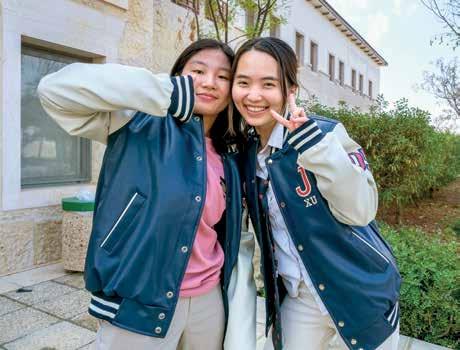
They also reflect on the differences in social dynamics between King’s and Korean schools. Seunghyeok Lee explains, “in Korea, there’s a linear feedback loop; the teacher would teach the students and the students respond to the teacher. Here I feel like the teachers try to foster a sense of debate between students.” Shin also took some time to get used to this different relationship with her teachers. “The teachers thought I didn’t like them, because I was so silent,” she says, “and when they ask me a question, I answer ‘yes’ or ‘no’.”
Understanding what home and identity mean is a lifelong journey, one that many of these students have already begun.
“In my sophomore year, I had a huge identity crisis,” says Shihun Lee. “One of the English units was on identity. Is it compartmentalized? Is it a mixture of stuff? I was confused. When someone asks me where I’m from, my go-to answer is Korea. Now I just don’t care.”
Minseo Kim says “I think I consider Jordan home. I feel the most

comfortable in Jordan. Korea’s more of a ‘cultural home’. So 80% Jordan, 20% Korea!”
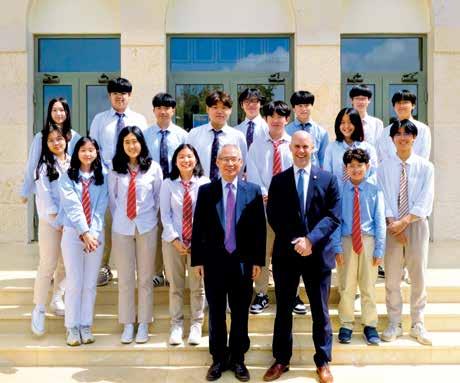
“My room in Mizan is home,” Hong says. Jason Lee shared this sentiment, adding “wherever I am in the moment is home.” Lee further explored the concept of identity, referring to his time in India. “We were doing introductions, and I said my nationality was US. When we got home my parents were like ‘why would you say you’re American? You’re Korean!’” He then concludes, “I am Korean, but I think a part of everywhere I’ve been is part of my identity.” Yoonhoo Kim agrees, “yeah, I think there’s a little bit of the Philippines in me too.”
As these students’ paths converge at King’s, they bring much more than their own cultural heritage to the community. The colorful paths that led these students to King’s — the cultures they’ve explored, the struggles they’ve faced, the lessons they’ve learned — imbue the campus with empathy, cultural understanding, and a plethora of fascinating life stories. As their paths diverge, these students will once again find themselves scattered across the globe, with Shihun Lee aiming to study international relations in the United States and Hong hoping to pursue engineering in South Korea. Ultimately, whatever path they take, they will be taking one step further on becoming global citizens.
I am Korean, but I think a part of everywhere I’ve been is part of my identity.South Korean students meet South Korean Ambassador to Jordan HE Lee Jaewan during a visit to King’s Academy. Shihun Lee ’23 (left)
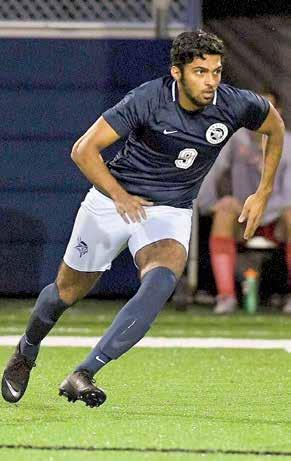
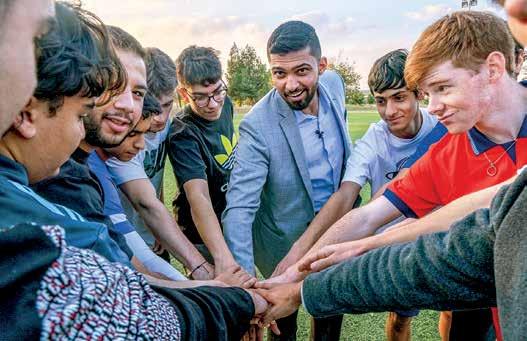 BY SUHAYB AL-JAWHARI ’11
BY SUHAYB AL-JAWHARI ’11
 When Madaba native Jawad
When Madaba native Jawad
Wleidat ’15 first stepped foot on King’s Academy’s campus as a 6th grade student at the Summer Enrichment Program, little did he imagine that his love for a ball at his feet would take him to law school in the United States a few years later.
Wleidat’s passion for football had already been established when he enrolled as a freshman at King’s in 20XX. He played for the varsity football team during co-curriculars for his entire high school career. “Coming down to the pitch, kicking the ball around, waiting for everyone to get here and to start practice,” Wleidat reminisces on a recent visit to campus. “[The football field] used to be the highlight of my time here, just coming down after a long day of classes”.
Improvement, teamwork and leadership are key components of the co-curricular program at King’s, and Wleidat soon found these values becoming a key part of his character through practice. “Matches and tournaments are extremely important. But all the hard work really happens right here during practice, during the week when no cameras are around, when no eyes are around and there's no one really here,” he says.
By the end of his junior year, Wleidat knew that he wanted to study law in the United States. But he also knew that his circumstances would not make that goal easily achievable. “I was never a 4.0 student and affording the best universities out there was going to be a struggle.”
With the help of the University Counseling Office and some of his friends who were good at creating videos, Wleidat was able to send all the universities he was applying to a video of himself at football practices and
games, defending and scoring goals. “That video was always the highlight of my interviews,” he says. “It was my ticket to the U.S. because I managed to get a full ride to play football. Football helped me get to where I am today because if it wasn't for the scholarship that I had, I was never going to be able to afford the school I went to.”
Now a commercial lawyer at QuisLex, a law firm based in New York City, Wleidat also holds a Master of Business Administration from Louisiana State University and a doctorate from Southern University Law Center. “Honestly, the biggest thing that I took away from football here was hard work always pays off. The beauty of all those lessons are that they apply to every single thing you do in life. And because of those lessons that I learned [at King’s Academy], until this day — we're talking 10, 12 years later — I still get up every morning and try to apply these lessons because that's what's really pushing me to get to keep going forward.”
Coming back to campus to support the teamSchool spirit was the order of the day at King’s Academy’s second annual Row for Funds event, a dynamic fundraising initiative that brought together the entire student body, faculty and staff for an energetic afternoon of rowing for a good cause.
Held on Commencement Lawn, students and employees were divided into four teams, named after four of the event’s sponsors, and gathered around their team stations to take turns on rowing machines for a total of 45 minutes with the goal of burning the most calories (points) for their team. The winning team that gained the most points set the minimum amount to be donated, in cash, by each of the team sponsors to the Student Life Fund.
The school’s Student Life Fund ensures that King’s Academy students on financial aid — around 43% of the student body — have access to the same opportunities available to other students, guaranteeing an equal educational experience for all King’s students. The fund covers, among other things, the cost of sitting for external examinations like the SAT, university
application fees and various extracurricular activities.



It was a festival-like atmosphere at the Row for Funds event: students and employees enthusiastically cheered on their teammates, encouraging them to keep going to raise the most points; loud, energizing music kept rowers motivated; and delicious food satisfied everyone’s taste buds as they enjoyed a picnic-style lunch in the crisp autumn air.
Not only did the whole community participate in Row for Funds this year, but coordination of the event was also a school-wide initiative with the Employee Wellness Program taking the lead and almost every department involved in some way, including the school’s Parent Council.
Row for Funds was generously supported by six sponsors, including the school’s health partners Medlabs Consultancy and GIG-Insurance, who are providing year-round support to King’s Employee Wellness Program among other school initiatives. In addition to sponsoring the event, MG Motors provided substantial support to the school, as did Del Monte, which
generously provided lunch and refreshments for the event.
Shami Eye Center, another of King’s longtime supporters, was fortunate to back Row for Funds’ winning student team! Students really put their backs into rowing, showing their determination to make sure that the Student Life Fund receives the funds it needs to provide support to their peers. Student commitment to the event didn’t stop there — the event’s sixth sponsor was the student-led initiative Talk.Heal.Be.
With the Shami Eye Center Team burning a total of 1,000 calories, closely followed in calories/points by the MedLabs Team, the GIG Team and the Talk.Heal.Be Team, each of the four team sponsors came through for the Student Life Fund, donating 1,000 JD each for a grand total of 4,000 JD, and ensuring that Row for Funds was an unequivocal success!
“Row for Funds is for the wellness of our community,” said King’s Academy’s Employee Wellness Program Manager Noor Dajani. “It creates and fosters a culture where being active is fun, giving back is a celebration, and the community bond is a treasure.”
LastNovember,theKing’sAcademy communitypulledtogetherto raise money for the Student Life Fund.

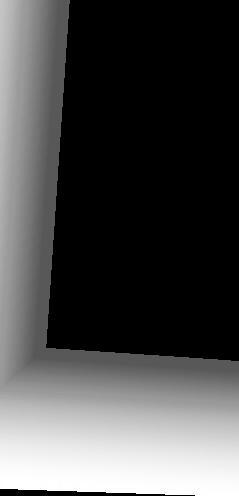
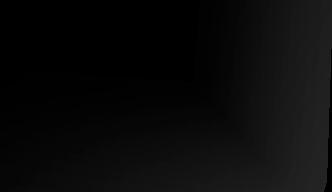
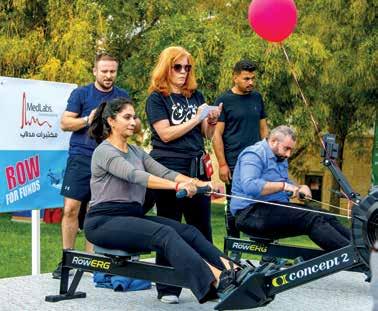


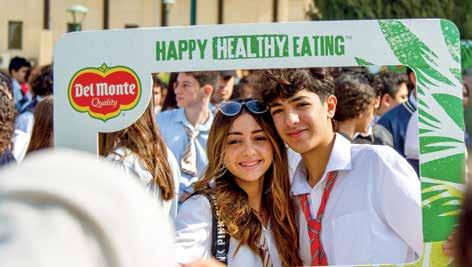
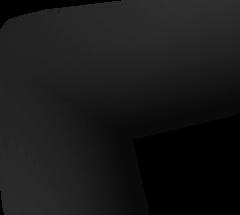



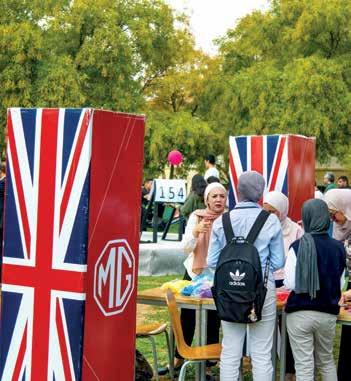

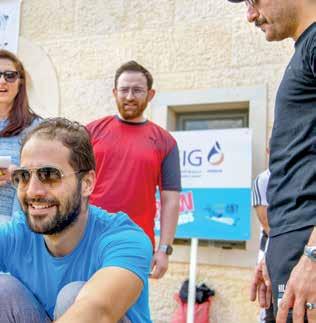


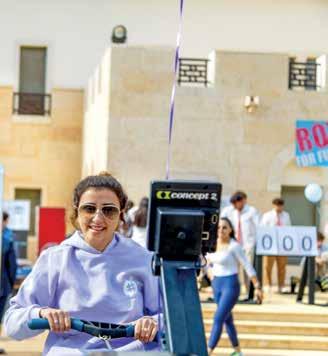

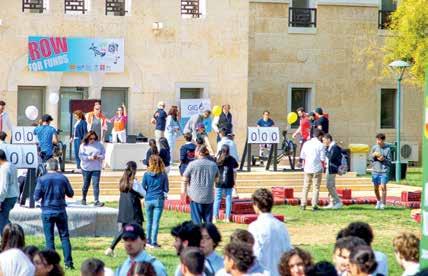
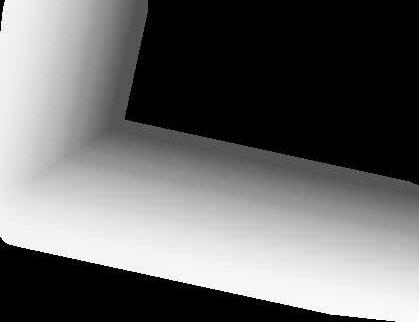
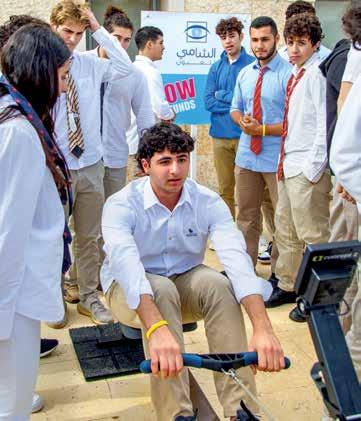



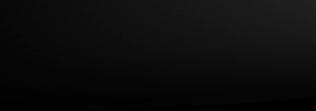







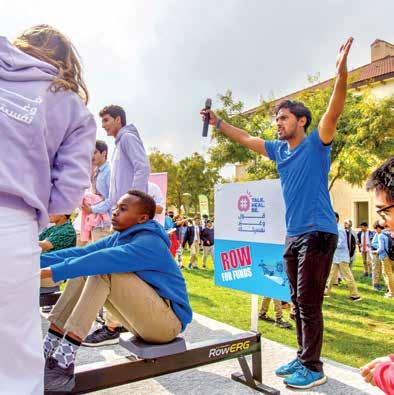
 BY LAUREN HOWARD
BY LAUREN HOWARD
For the last two weeks of the winter semester, Middle School students adopted the personas of refugees from seven countries around the world. Putting themselves in refugees’ shoes, the students’ aim was to work together to create a “City in the Sea” — a place for refugees to live in peace and harmony — as part of an interdisciplinary project called a minimester.
Minimesters replace traditional end-of-semester exams, and provide students with an opportunity to demonstrate what they’ve learned in the classroom, allowing students to implement skills learned throughout the semester including subject-specific skills, research skills and self-directed learning, according to Dean of the Middle School Zina Nasser.
“Minimesters are where we learn and educate ourselves on things
outside the regular academic curriculum,” explains Mufleh Akel ’27.
The groundwork for building the city in the sea actually began much earlier, with a group of 11 dedicated students who took a semester-long workshop in preparation to lead their peers through the unique learning experience.
Under the guidance of faculty members Gamze Keskin Pultz and Carly West, the student leaders
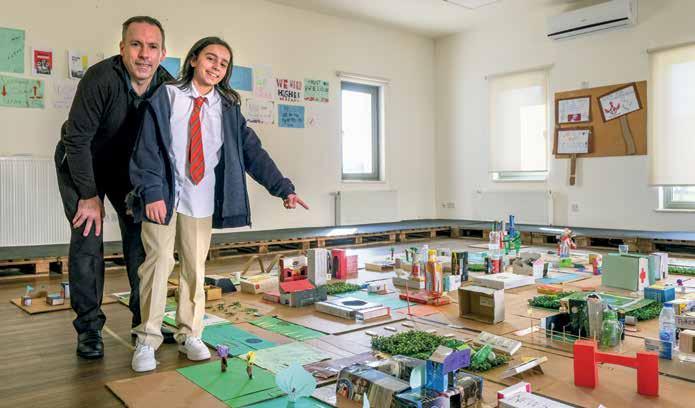
During the Middle School’s winter minimester, students put themselves in the shoes of refugees to imagine, plan and create a place that they can call home.
designed characters for their peers, assigning countries of origin, ages, and socio-economic backgrounds.
Then, in English class, all students took time to write character autobiographies, allowing them to build empathy for refugees and to cultivate personal interest in the upcoming minimester.
The student leaders researched various government structures and studied rhetorical techniques to build compelling arguments. After the presentation of government options in an assembly, the Middle Schoolers — from the perspective of their characters — voted to adopt a democratic government. Days before the minimester officially began, students campaigned to be governmental leaders and elected Jake Playle ’28 as their vice president and Hamza Sboul ’27 as their president.
“The best part of the job,” says Sboul, “is representing the community. There is no worst part, but I do have to face the challenges.”
The minimester began with a day of building — each student was assigned a part of the city to develop according to what they thought would best serve the community. Students poured over the draft of the city and, in small groups run by the 11 student leaders, identified key problems they would need to solve in the following weeks: How might the roads connect? How many hospitals, schools and apartment buildings should there be? What food would sustain the community? Did the city have a name?
Over the course of the learning experience, students engaged in daily Seek and Solve classes to further
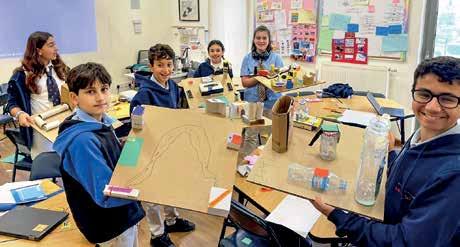
explore and solve the problems that emerged on the draft build day.

The Culture and Language class, which created a thorough legal code, proposed city names to the community. After a vote, the city was named the Republic of Arminda.
In one course, students explored how to sustain the community, and voted to have an omnivore diet and use hydroponics to farm fruits and vegetables. In another course, with the support of Andy Harcourt, a visiting faculty member from Deerfield Academy, students designed a reverse osmosis plant to provide the citizens with clean drinking water. Students designed a city plan, researched methods to keep the city afloat, and filmed and televised daily breaking news to keep the citizens of Arminda informed.
“I couldn’t pick a favorite class,” says Zaina Khan ’28 in one newscasted interview, “because both are
fun; we are solving very different problems we have in the city.”
According to Amber Playle ’27, “we get a lot of self-directed learning. We, as citizens get to make lots of decisions ourselves.”
Each day, guided by their student leaders, the “refugees” formed small groups to address problems, such as how to build a bridge and a dam to stop flooding after a national disaster, how to contain a viral outbreak and how to write a resume to receive promotions.
Next, each group presented its solutions to the community in order to build a better final draft of the city. Grappling with ideas of community needs, students spent the last day building a second model of the city using recycled items.
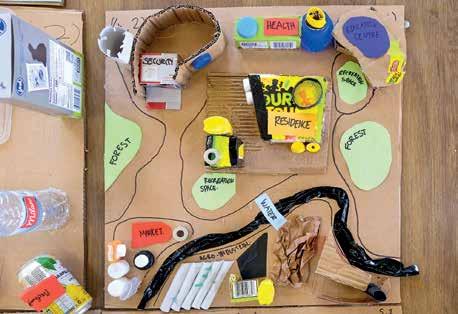
“Student presentations and student work are not the organized, polished work of adults,” explains West, “but the work-in-progress of students who are still learning how to grasp these complex ideas.”
At the “Celebration of Learning” event, a culmination of the Middle Schoolers’ learning experience, students led their parents through a tour of the completed city to explain the problems their specific classes faced and how they tackled each one.
Yara Kanaan ’27 summed up her minimester experience simply: “It was unusual, and fun!”
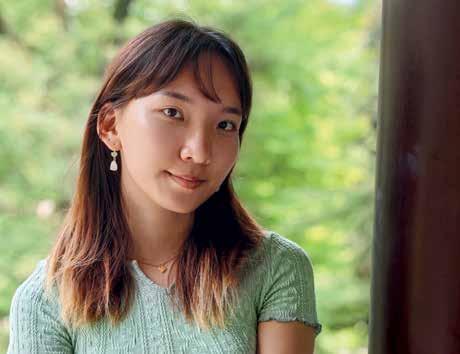
This form of Romanized Arabic did not exist until the creation and advancement of the internet. Towards the end of the 20th century, short message service (SMS), email and instant chat platforms became more widespread in the Arab world. However, since many early electronic systems could not support non-Latin scripts, Arabizi presented an alternative approach to accessing digital communication. It has also appeared as the result of English’s global expansion since many English words have been integrated into the Arabic language through Arabizi. In Egyptian Arabic, for example, the English word ‘creative’ is used colloquially as “فيتييرك” (keryeitif) and ‘message’ is “جسم” (misij).
Unlike many other language communities, a majority of native Arabic speakers, especially those of younger generations, choose to utilize the Latin alphabet to replace Arabic letters in digital communication. This phenomenon is called ‘Arabizi’, a resulting combination of the Arabic words for Arabic (‘A’arabii’) and English (‘Inglizii’). While a majority of Arabic speakers are firm supporters and users of Arabizi, many oppose it entirely, including but not limited to scholars and self-identified nationalists.
In employing Arabizi, Arabic letters are transcribed into Latin letters or numbers based on their corresponding phonemes and shapes. For example,
the letter ‘ع’, which does not exist phonetically in English, is transcribed as the number ‘3’ because of the similar shape. Sounds like ‘س’ and ‘ش’ are transcribed as ‘s’ and ‘sh’, respectively, because they are pronounced the same way phonetically. Oftentimes, Arabic speakers type words such as ‘ya3ni’ (ينعي, English meaning: to mean), ‘5alas’ (صلخ, English meaning: stop, enough), and ‘alhamdillah’ (هلل دمحلا, English meaning: thank God). However, due to regional and dialectic variations, certain sounds are not standardized throughout the entire Arabic-speaking world, rendering Arabizi loosely structured and largely based on an individual’s intuition and preference. For example, the sound ‘ق’ can be represented as the phonemic equivalent of /q/, /k/, /g/ or /a/.
Users in favor of Arabizi particularly enjoy the versatility and ease it provides. For multilingual speakers, code-switching can be difficult in online communication. Unlike oral communication, speakers are required to take an additional step to switch to a different keyboard on most digital devices. By using Latin alphabets, Arabic speakers who possess skills in other languages with Latin alphabets are able to type faster and communicate more effectively. As reported by several researchers, Arabizi is “easier and faster to use” since the Latin keyboard has fewer letters than Arabic, leading it to be considered a less time-consuming system. Users can also type out certain loan words from English such as “video”; since the ‘v’ sound does not exist in Arabic, the word would be written as ‘fideo’ (ويديف) instead.
Others prefer Arabizi for the assorted emotions associated with the different forms of the Latin alphabet. In classical Arabic, one is unable to express emotion solely through letters since there is no capitalization. On the other hand, Latin alphabets can be capitalized to express a variety of emotions ranging from anger to excitement. Those who like Arabizi find it easier to express themselves clearly and accurately in communicating via text.
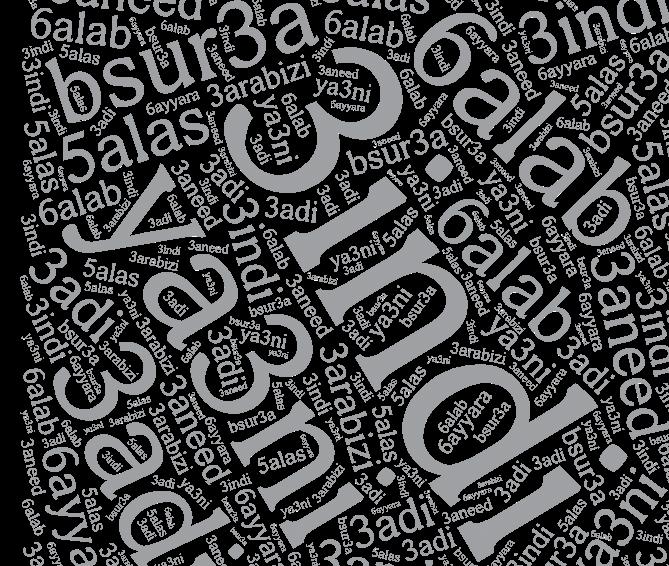
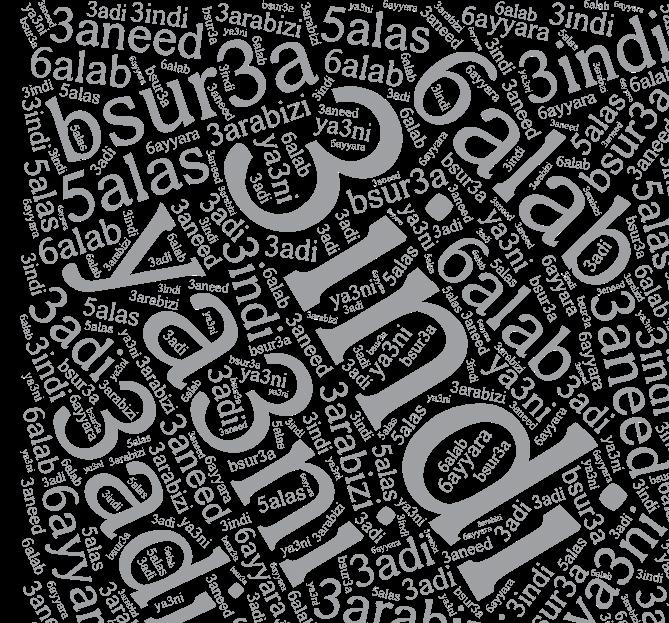
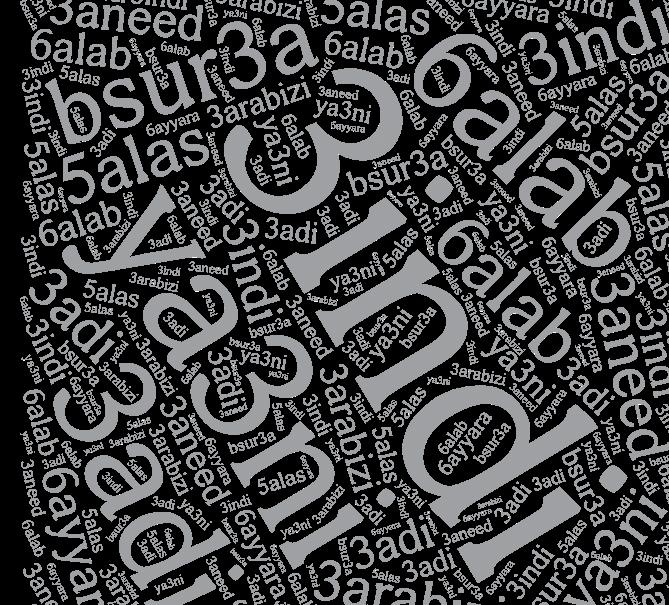
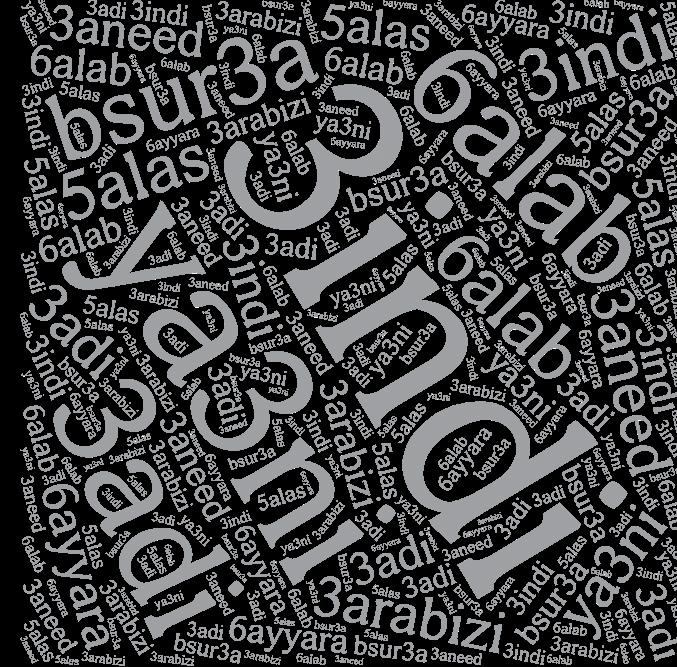
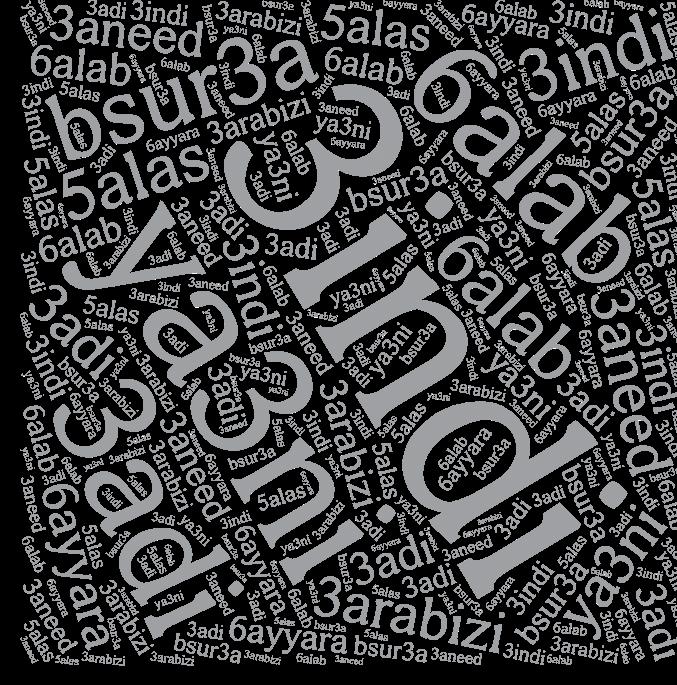
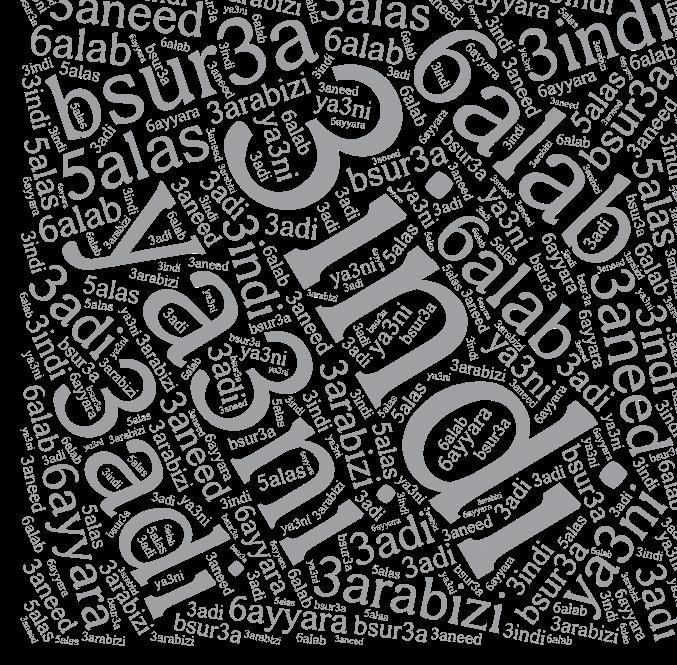
On the other hand, those who oppose the use of Arabizi believe that the adoption of Latin alphabets harms the Arabic language and, by extension, Arab identity, in multiple ways. Because of the simplified characteristics of Arabizi, Arabic’s distinct feature, ‘short vowels’, also known linguistically as diacritics, cannot be added. In the context of Classical and Modern Standard Arabic, short vowels contribute nuance to phrases and can be used as markers to distinguish words that have the same root but different meanings. Reliance on Arabizi is considered detrimental to Arabic learners as they might not be able to identify the presence of short vowels and may have difficulty assigning proper meanings to typed words.
Scholars of Pan-Arabism and Arab nationalists assert that Arab identity is strongly tied to the Arabic language. Furthermore, the integration of the Latin alphabet is viewed as a symptom of Western colonization. Some speakers report that they refuse to use Arabizi out of respect for the Arabic language’s heritage as the language of Islam and the Quran. They find Arabizi offensive to the Muslim faith and extremely inappropriate in the context of formal settings and religious practices.
The Arab region has a long history of resisting European colonial powers, particularly the United Kingdom and France, countries whose respective national languages use Latin alphabets. Therefore, Arab nationalists and others view the Latin alphabet as part of the continued representation and influence of colonizers. Additionally, many features of the Arabic language’s nuanced history and culture cannot be
practiced through Arabizi, including Arabic calligraphy. Some view the acceptance of Arabizi as an active effort to discard the Arab identity and celebrate colonial powers, amounting to “cultural treason.”
According to a study on students’ Arabic language development conducted by Director of Al-Quds Open University Ibrahim Al-Shaer, there might exist a direct correlation between the increased use of Arabizi and lower academic performance in Arabic. Although people often attribute low Arabic language performance to high internet usage, in Al-Shaer’s opinion, “mixing Arabic and English” is behind the problem. Al-Shaer’s study found out that “using Latin characters and numbers as an alternative for the Arabic script weakens the students’ spelling performance” and “writing in Arabic using Arabic characters [...] has the potential to preserve Arabic spelling competency.”
globalized, and one that is constantly in the process of adapting and reinventing itself. This identity, fueled by the power of an English-based technology, is the Arabizi identity.”
On the contrary, Dr. Lelania Sperrazza, a linguist and English language professor at the American University of Sharjah argues that Arabizi can, in fact, help students learn about multifaceted identities. She believes that “[r] ather than desiring a monocultural identity for an entire lifetime, […] I want my students to be aware that they are products of a new era, and subsequently, a new identity: one that is increasingly migratory and
To many, the integration of Latin alphabets or the usage of English expressions in people’s daily lives does not necessarily equate to disrespect for their mother tongue. Linguist and Arabic Professor at the American University of Beirut, Lebanon Dr. David Wilmsen argues that “given the fact that English is the current lingua franca and that most technology is originally in English, this blending is necessary.”
Whether one believes its existence has had a positive influence on the Arabic language or not, Arabizi is an inevitable product of the intersecting paths of globalization and technological advancement in the Arab world. Arabic speakers of any level can learn the system quickly. This flexibility allows a wide range of Arabic speakers and learners to partake in an individually customized version of Arabic with little room for error.
Ruofei Shang ’21 is studying sociocultural anthropology with minors in Arabic and film at Boston University. This article was originally published in the International Relations Review (IRR), a journal of international affairs written, edited, and published by undergraduate students at Boston University.
Those who oppose the use of Arabizi believe that the adoption of Latin alphabets harms the Arabic language and, by extension, Arab identity.”
Latin alphabets can be capitalized to express a variety of emotions ranging from anger to excitement. Those who like Arabizi find it easier to express themselves clearly and accurately in communicating via text.

Samsung Innovation Campus (SIC) is an information, communication and technology (ICT) education initiative offered globally by Samsung Electronics Co., Ltd., the South Korean multinational electronics corporation and one of the world's largest technology companies. King’s Academy is the first school in Jordan to offer the program.

In the first stage of the collaboration, software engineers from Samsung Levant’s Research and Development Center provided training and mentoring to 26 King’s students over the course of a semester. Students worked on developing core competencies such as Artificial Intelligence (AI), the Internet of Things (IoT), coding and
programming, in addition to a range of soft skills, guided by their King’s Academy teachers and Samsung mentors.
According to President of Samsung Levant Hendrick Lee, the goal of SIC is to foster talented youth, enhance their employment prospects, and help them gain practical education in technologies.
























“We are keen to give opportunities to all people, especially youth, to be involved in the IT industry,” says Lee. “The SIC equips students with the ability to recreate and apply the acquired knowledge, thereby enhancing their competency in the real-life job market and helping students to grow into wellrounded professionals equipped with robust skills that are in high demand.”
Students enrolled in the program represent a diverse cross-section of the student body at King’s Academy, with both female and male students across different grades and nationalities, who also ranged in skill level in the subject matter from beginner to more advanced. To ensure that all students benefited fully from the program, Samsung provided bespoke training to the more advanced students while providing extra support to the beginners.
“Before I joined, I didn’t know anything about Python [a high-level programming language] or how to program a robot or how programming languages work,” says Aisha Aliu ’25, who describes herself as a beginner

























Last fall, King’s Academy welcomed an exciting new collaboration with Samsung Electronics Levant that is developing students’ skills in coding, programming and robotics — Samsung Innovation Campus.Students receive awards and certificates at the Samsung Innovation Campus closing ceremony.
at the start of the program, “I’d only done block coding before, I didn’t know we could code from scratch. It was quite challenging, but actually really nice. It wasn’t just learning, it was hands-on physical tasks.”
Taking part in the SIC gave Aliu the confidence to participate in other computer science activities such as the iCode Edu virtual hackathon that took place at the end of the semester, where students worked on solving programming challenges and creating innovative new video game and web designs.
“SIC made me more interested in computer science and encouraged me to learn more, so I even joined the virtual hackathon,” says Aliu. “We used some Python in that, so having experience from SIC really helped me.”
Dana Hammouri ’23 knew she had to join SIC as she could not find computer science internships or learning opportunities in her hometown of Irbid. “I have always been interested in STEM subjects and potentially a career in IT — it’s like an open path, always evolving and developing.”
“When I heard about the program, I knew I had to join because it is a great opportunity for me to gain experience and review Python,” says Hammouri, who had some prior experience in the programming language after taking a Global Online Academy (GOA) course over the summer.
While Brandon Winans ’23 had some robotics experience from his previous school in the United States, Samsung Innovation Campus took it a step further. “I had never taken a computer science course before,” he says. “What’s so great about this course, and King’s, is you can come in with no experience and still learn so much not only from your peers but from the instructors.”
To demonstrate the skills students gained over the course of the semester, an “Escape the Maze” robotics competition was held on the last day of the SIC. Students formed teams to compete in the final competition, where robots they built and programmed were pitted against each other in a race to escape the maze in the shortest amount of time.
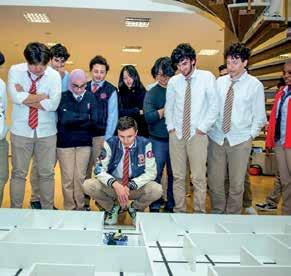
Winans’ team’s robot was ultimately the only one that made it out of the maze. “What’s so great about robotics is you come with a perfectly working code and you get there, and nothing works!” he says. “Before we started, we had to redo our code, our timing was all off, our sensors weren’t working, so we had to reconstruct the robot, reprogram it, then throw our robot into the ring and hope it made it out alive. That was the highlight of the whole experience!”
SIC involved a lot of teamwork, according to Ahmad Ali Ahmad ’24, one of the more experienced in the group and who was awarded first place in the program. “I’ve been doing programming all my life, so the mentors gave me some more advanced activities, but it was nice to have that variation between less and more skilled people,” he says. “Our instructors really drove home that if people in the team know something others don’t, we need to make sure everyone in the team understands the concept. Your work doesn’t end when you finish the program, your work ends when everyone in the team knows how the program works and then finishes the program.”
Every person in the team adds something to the work, Hammouri agrees. “Starting from the foundation, we work together to build it up using the different ideas from our team members.”
In addition to the program material, the guidance provided by the four
mentors — all members of the Artificial Intelligence team at Samsung Levant’s Research and Development Center — was “amazing,” according to the participants.
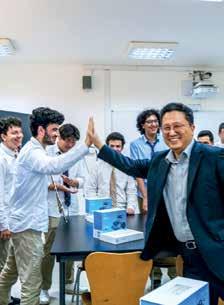
“They have a lot of experience which inspired us,” says Hammouri. “Their presence pushed us to work harder and aim higher for our future careers.”
“They were a wonderful group of instructors,” agrees Syeunghyeok Lee ’24, who was awarded third place in the program. “They would give us more advanced questions usually for people preparing for tech jobs and interviews. We also got to know a lot about other aspects of working in huge tech companies, such as security risks and other insider knowledge.”
Samsung mentor Yahia Daqour was impressed by the King’s students. “Some of them have the ability to take their skills to the market and start implementing them,” he says. “We wanted this program to attract those kids, while teaching the beginners in a way that everyone was satisfied with what they were learning.”
According to Daniel Yu, a senior professional in CSV Communications and Strategy at Samsung Levant, “Our main goal is to support students to get a job in the future, we are not a one-time campaign,” he explains. “We want to motivate students; we want to help them think about innovative approaches to solving problems in order to use that experience in the future to solve problems in the real world.”
The King’s Academy community got a tantalizing taste of the fascinating, but often overlooked, world of contemporary Middle Eastern art during a visit by the authority on the subject, Sultan Sooud Al Qassemi.
BY MUNA AL-ALULThe King’s community developed a renewed appreciation for modern Middle Eastern art following a talk by Emirati columnist on social, political and cultural affairs Sultan Sooud Al Qassemi at school last November.
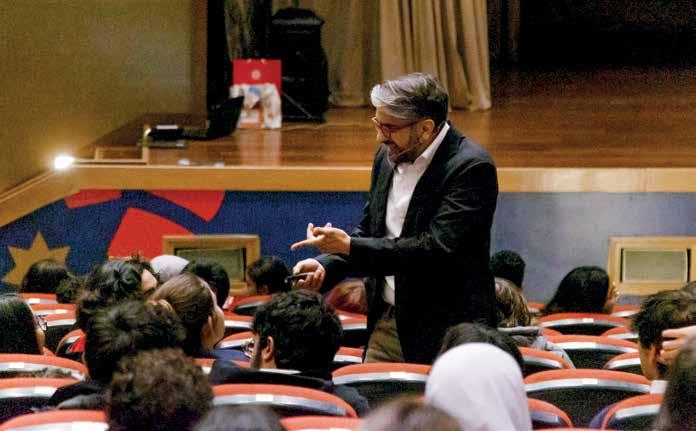
Al Qassemi was invited to King’s as one of a series of 15 guest speakers and panel discussions to mark the 15th anniversary of King’s Academy.
Al Qassemi’s articles have appeared in publications such as The Financial Times, The Independent, The Guardian, The Huffington Post and The New York Times. Highly active on social media, his tweets became a major news source during the Arab Spring, with TIME magazine listing him in the “140 Best Twitter Feeds of 2011,” and Gottlieb Duttweiler Institute ranking him 19th on the 2018 “Arabic Thought Leader Index.”
A scholar and educator, Al Qassemi currently teaches his course “Politics of Modern Middle Eastern Art” at Brandeis University, and recently joined the Harvard Kennedy School (HKS) as Kuwait Foundation Visiting Scholar with the Middle East Initiative at the Kennedy School’s Belfer Center for Science and International Affairs.
“I’ve never studied art, so I really had to teach myself what I am here to talk to you about today,” said Al Qassemi to a packed audience of students and faculty in the Abdul Majeed Shoman Auditorium. “People of my generation were not offered an education on Middle Eastern art [at school], but things are changing.”
With an infectious passion that soon spread throughout the King’s community, Al Qassemi presented a number of artworks by renowned Arab artists, guiding students on how to see and understand them.
Abdel Hadi El-Gazzar, Inji Efflatoun, Hamed Ewais, Abdulla Al-Muharraqi, Wijdan Ali, Mona Hatoum, Ayman Baalbaki, Abdulnasser Gharem and Mohssin Harraki were some of the artists — hailing from Egypt, Bahrain, Jordan, Palestine, Lebanon and Morocco — whose paintings and sculptures Al Qassemi introduced to students and helped them to analyze.
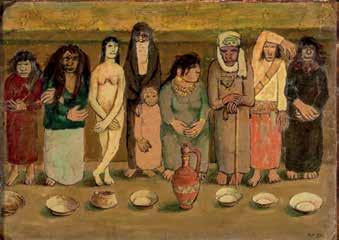
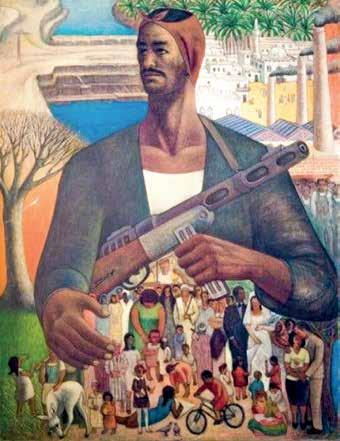
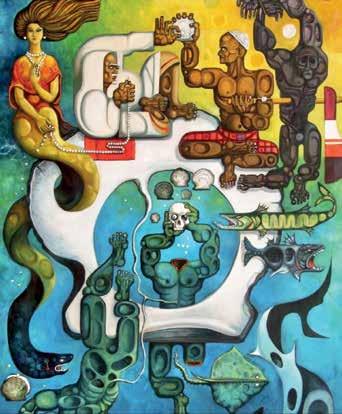
“When you go to a museum and look at artwork you need to ask these questions,” he explained, listing the five w’s (who, what, where, when and why). “There’s a sequence to follow: describe, analyze, interpret. Describe what you see first, give yourself a chance to look at the work and interpret it before you decide if you like it or not.”
With such a rich and fascinating abundance of art in the Arab region, Al Qassemi has long been passionate about contributing to intellectual development of the region’s art scene. Towards that end, he founded Barjeel Art Foundation, whose mission is to promote art by artists from the Arab world through exhibitions locally and internationally and to build a prominent and publicly accessible art collection in the United Arab Emirates. Another way he is doing it is through educating people, young and old, by means of articles, podcasts, videos, talks with guest artists such as the “Online Cultural Majlis” series, and lectures at educational institutions around the world and particularly the Arab region.
At King’s Academy, where an appreciation for the arts is more pronounced than most schools in the region, Al Qassemi’s engaging talk succeeded in lighting the flames of admiration, inspiration, and interest in further exploration of the exciting world of modern Middle Eastern art.
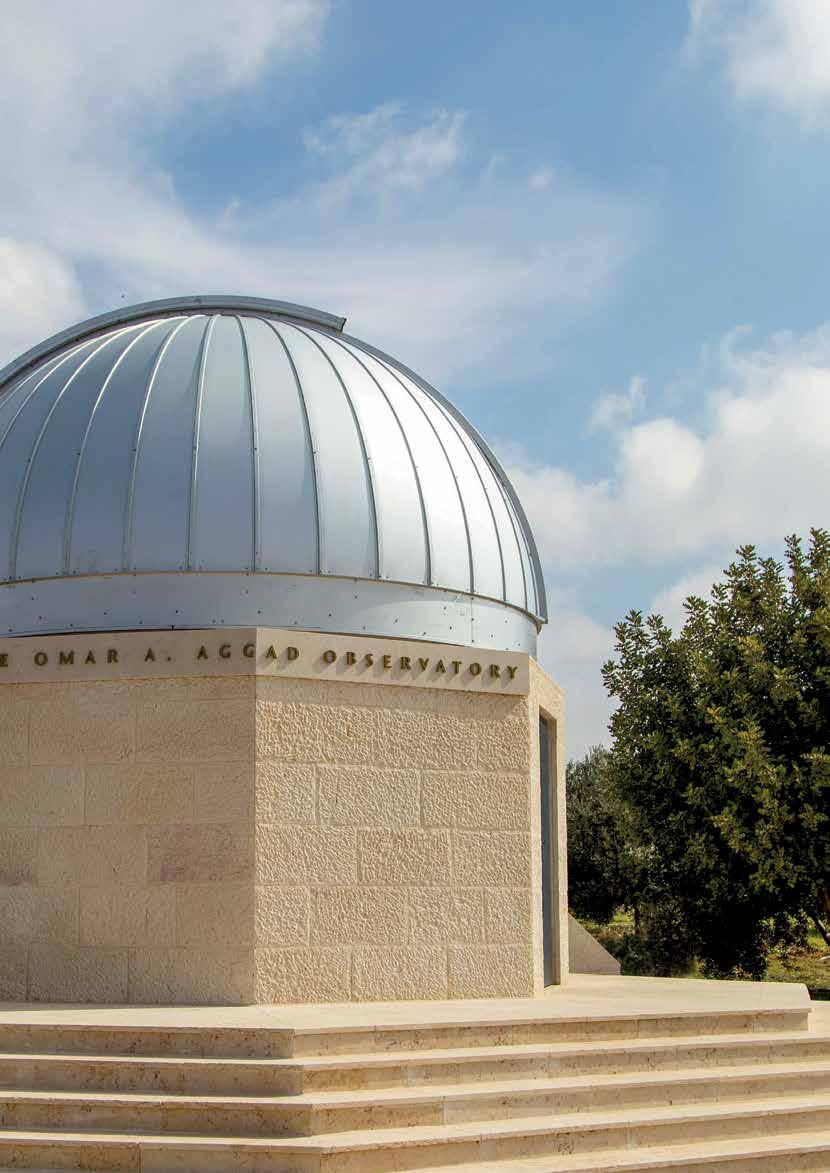 BY MUNA AL-ALUL
BY MUNA AL-ALUL
Last fall, King’s Academy held a ceremony to dedicate its astronomical observatory, The Omar A. Aggad Observatory, in honor of the philanthropic spirit of the late Omar A. Aggad. Aggad’s son Tarek, a longtime supporter of King’s Academy and former member of the school’s Board of Trustees, generously donated the cost of the observatory.
Tarek Aggad is chairman and CEO of the Arab Palestinian Investment Company (APIC) and executive director of the Aggad Investment Company (AICO), both founded by his father who was a prominent and pioneering Palestinian businessman. Aggad continues to lead diversified investments across Saudi Arabia, Palestine and Jordan.
In addition to being a King’s Academy trustee for six years, Aggad and his wife Shireen established the APIC Scholarship Endowed Fund in 2014 to support deserving students from the Palestinian territories of East Jerusalem, Gaza and the West Bank gain an education at King’s. The Aggad’s are also King’s Academy parents — their daughter Saja Aggad ’24 is a current student while Rana Aggad ’15, Layan Aggad ’18 and Thaer Aggad ’19 are King’s alumni.
“The Omar A. Aggad Observatory is another example of your extraordinary generosity to the school,” said Head of School Peter Nilsson to Aggad during the ceremony. “This gift is something you are passionate about and that inspires passion in others — from our students in the school’s Astronomy Club, to our guests from the Jordan Astronomical Society, and others all around Jordan.”
The Omar A. Aggad Observatory is located within the King’s campus and offers unobstructed views of the night sky in all directions, housed in a dome structure that shields a mounted stateof-the-art telescope — one of the most powerful in the region.
At the ceremony, Aggad noted that the observatory is an example of how
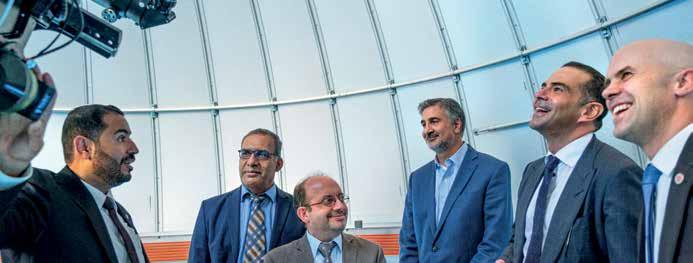
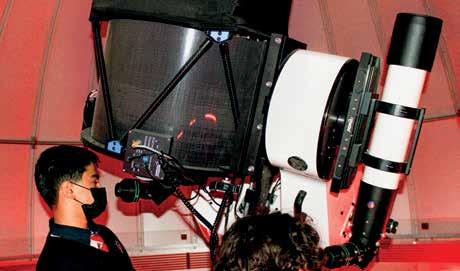
King’s Academy is sustaining excellence and investing in the education of future generations. “The observatory has been beautifully executed and standardized to global standards,” said Aggad. “It is something the students can use, and that will be a center of excellence in this region — not only in physical infrastructure but also in academia.”
The observatory provides a learning space that opens up many avenues for Jordan’s future astronomists, scientists and engineers to learn about and observe astronomical objects through astronomical imaging or astrophotography, and through producing digital images that can be used for students’ art and science research.
Members of the Jordanian Astronomical Society (JAS), the International Astronomy Center, the Arab Planetarium Society, and the Sharjah Planetarium are frequent visitors to the observatory, in addition to university and school-aged students around Jordan. Jordan Astronomical Society President Dr. Ammar Al Sakaji and Vice President Dr. Hanna Sabat both attended the dedication
ceremony, in addition to King’s Academy’s Chairman of the Board of Trustees Ali Kolaghassi, Director of Observatory Dr. Abdallah AbuShihadeh and other faculty, students and guests.
King’s Academy has already hosted multiple events that have made use of the observatory, including an astronomy symposium, seminars to mark World Asteroid Day, observations of the newly discovered Supernova 2022hrs, and Jordan’s first viewing event of the launch of NASA’s Artemis I Mission. In addition, it has become one of the five observatories across the country tasked with declaring the start of Ramadan — last year, the Mufti of Madaba used the observatory to observe the crescent moon to announce the start of Eid of Fitr.
“King’s is a school not only for the 600 students who are fortunate to attend but also for the country, the region and the world,” said Nilsson. “The observatory is a perfect example of this. It inspires and guides our students. King’s has always had a bold vision — now that vision is literally extended to the stars.”
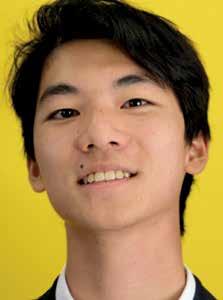
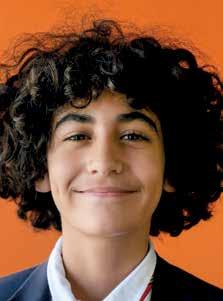 BY LUKMAN ARSALAN
BY LUKMAN ARSALAN
Institutions across the world recognize the importance of having a diverse student body in their classes, primarily because of its educational value. At King's Academy, we intentionally gather students from across 12 governorates of Jordan, 40+ nationalities, various socioeconomic levels, different religious backgrounds, and other visible and invisible diversity traits. These students hailing from diverse backgrounds live together in a safe boarding environment, where they learn to debate, argue and, most importantly, listen to one another. As author Ola Joseph said, "Diversity is not about how we differ. Diversity is about embracing one another's uniqueness."
At King's Academy, we believe that respect is a guiding principle that must permeate all aspects of student life. We strive to instill in our students an
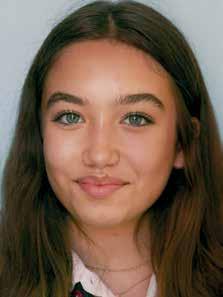
empathetic understanding of one another and a sense of respect that extends to all student relationships, including those with their teachers, families and communities. Through fostering a culture of respect, we create a learning environment where students can learn from one another and gain the skills they need to become global citizens.
The COVID-19 pandemic disrupted educational institutions worldwide, leading to the temporary closure of schools and impacting millions of students. In response, the Office of Admissions and Financial Aid at King's Academy evaluated students' noncognitive skills and characteristics,
Through fostering a culture of respect, we create a learning environment where students can learn from one another and gain the skills they need to become global citizens.
such as conscientiousness, courage, passion, perseverance, and, most importantly, resilience. As Angela Duckworth stated in her book, Grit: The Power of Passion and Perseverance, students who are resilient in the face of failure or adversity are more likely to succeed in life.
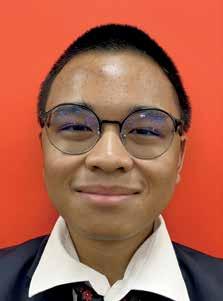
King's Academy creates a more inclusive and diverse student body that benefits all students.
Nearly 30% of King's Academy's student body is international, and the school purposefully admits Third Culture Kids (TCK) who have spent a significant part of their childhood in a culture different from their parents' culture. TCK students are often characterized as open-minded, adaptable, and able to bridge cultural differences. They are valuable cultural brokers who can help foster intercultural understanding and cooperation among their peers. Additionally, TCK students,

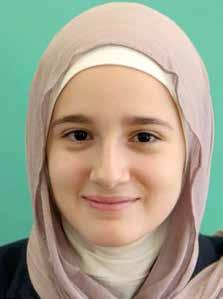
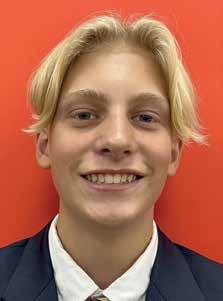
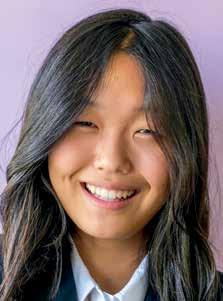
Creating a diverse classroom is essential in preparing students for life in the real world. Exposure to diverse perspectives, cultures and backgrounds allows students to develop empathy, broaden their understanding of the world, and gain the skills needed to work effectively with people from different backgrounds. By learning from people who have different backgrounds and viewpoints, students are better equipped to navigate the complexities of the world and contribute meaningfully to their communities.
A diverse student body has immense educational value. At King's Academy, we strive to create a learning environment that promotes respect, love of learning, responsibility, an integrated life and global citizenship. As the American poet Maya Angelou once said, "In diversity, there is beauty and there is strength." By embracing diversity in all its forms, we are creating a better future for ourselves and our communities.
At King's Academy, we are proud of our diverse student body and the unique perspectives, experiences, and ideas it brings to our classrooms. We believe that by promoting diversity and fostering a culture of respect and inclusion, we are preparing our students to be the leaders of tomorrow who can drive change towards a shared future of peace and opportunity.
TCK students are often characterized as openminded, adaptable, and able to bridge cultural differences. They are valuable cultural brokers who can help foster intercultural understanding and cooperation among their peers.
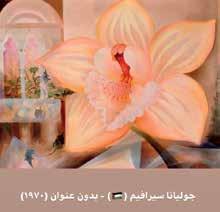
With a quick Google search, the entirety of Ai Weiei’s works can find its way onto one’s screen, complete with dates, descriptions, titles and any other information one might need. Attempt the same with Shakir Hassan Al Said, one of Iraq’s most influential artists, and one might need to do much more than a quick Google search. Resources and institutions that successfully archive Arab art are few and far between, a fact that Sara Jazara ’15 refuses to accept.
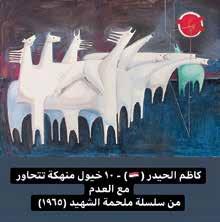
“Someone has to create this archive,” she says, “so I will.”
Jazara’s interest in art, particularly Arab art, was sparked in the classroom back at King’s, where she took AP Art History. “I’ve always loved art, and AP Art History solidified that,” she says. “Art reveals so much about culture, and I find that fascinating.” While the AP course could be considered the first step towards her career as an art historian and archivist, it was a senior elective that marked the beginning Jazara’s dedication to her own history: The Modern Middle East. In this course,
Jazara learned about the Arab world’s more recent history, including the Suez Crisis, Algerian independence, the Nakbeh, and other moments in Arab history that shaped Jordan and the region. “How did I know so much about the Roman Empire and almost nothing about what happened just two generations ago!?” Jazara says, adding, “that course definitely sparked a flame.”
When it came time to apply to universities, Jazara knew that she wanted to pursue art history, and what better place to do so than Florence,
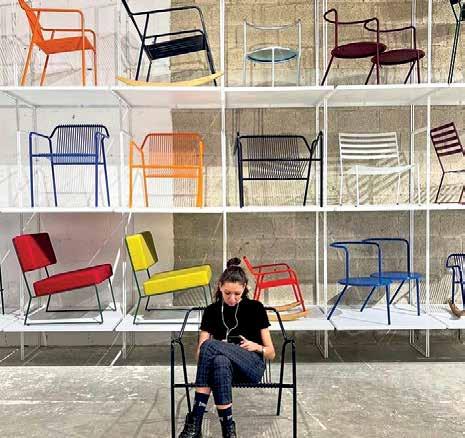
When Sara Jazara ’15 discovered that most Arab art ends up in private collections and is never seen by the public, she decided to make it her life’s mission to change that.
BY AHMED KHALAYLEH '15Sara Jazara ’15 working at Local Industries Fatigued Ten Horses Converse with Nothing – Kadhim Hayder
Italy – the Marist College campus to be specific. “It was a study abroad hub, so a lot of the students were there to experience the European lifestyle and have fun, but I was there to learn,” she adds. During her first year there, Jazara took advantage of her prime location, infatuated by the art around her, learning as much as she could. Upon starting her second year it dawned on her that she had learned almost nothing about Arab art, and the flame sparked in her Modern Middle East course ignited. She decided to take some of the institution’s “international” courses, only to find that these courses only expanded her horizon to America and China – hardly the focus of her interest.
museums and exhibitions, “private collectors in Jordan are very protective over the art in their possession,” Jazara explains. She attributes this to the possibility that Arab culture requires that one practice humility and not flaunt one’s wealth, making many collectors hesitant to do otherwise, despite the option to remain anonymous in said archive.
As her two-year fellowship with the MMAG Foundation came to an end, Jazara realized that the archiving project was a formidable undertaking. “This is going to be my life,” she says, “and while I’m looking for funding now, I know that this is eventually going to be its own institution, relying on its own funding, and making art
constitutes art to what information to document about that art had to be heavily considered. “I feel I have to unlearn everything I know, because I was trained by Western institutions to study Western art, and so the way I study and appreciate art is influenced by that.”
This discussion series was also a response to her experience with the art scene in Amman, which at times can be exclusive and elitist. “You’re either culturally elite and can speak that language, or you have enough money to be a part of it,” she explains. The art in question often revolves around issues that affect the masses, the common person, and yet remains inaccessible to the very people it represents, such as Jazara’s own grandmother. “Art has become an experience, and there are still so many barriers between you and that experience,” says Jazara.
A couple of years later, Bachelor’s degree in hand, Jazara ended up back in Amman. But graduation didn’t mean she was done with studying. Jazara’s eagerness to continue learning led her to a research fellowship at the Mohammad and Mahera Abu Ghazaleh (MMAG) Foundation, where she conducted research related to the archiving of private collections. She discovered that a great deal of Arab art ends up in private collections and galleries and is never seen by the public. “It seems we lack an archive for Arab art,” she says, which means that “Arab artists are working with very little reference.”
Jazara’s responsibility was to track down and archive these private collections, making them available for anyone to see. This proved difficult. While it is common practice elsewhere for art collectors to lend their art to
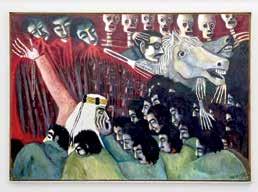
from the region free and accessible to anyone that’s interested.”
With such a big project, Jazara explains, come a lot of questions that need answers and challenges that need to be faced: “What do I even include in the archive? Do I include any art I’ve seen? What do we consider art? What do we consider Arab?”
To attempt to tackle these difficult questions, Jazara began a discussion series called “Around the Archive.” At times, these discussions got heated, such as the first couple of sessions that attempted to define “Arab” and “art,” but it was exactly these types of discussions that Jazara wanted. “I want to poke these holes, because they either reaffirm what I believe or force me to rethink everything.”
And Jazara had a fair share of rethinking to do. Everything from what
Despite having achieved a great deal with her research on private collections and her successful discussion series, Jazara still has a great deal more she plans to do before tackling the beast of an archiving project. In addition to planning a second discussion series in 2023, Jazara is working on smaller archiving projects to hone her skills in preparation. One such project is to document and archive her grandmother’s life stories and possessions. Another very exciting project, shared by Jazara with the author of this article, will remain a secret for now, as per Jazara’s request. Once these passion projects come to fruition, Jazara will be well on her way to achieving her mission of creating the region’s first comprehensive, free and easy-to-access archive of Arab art, surely making a name for herself as an art historian.
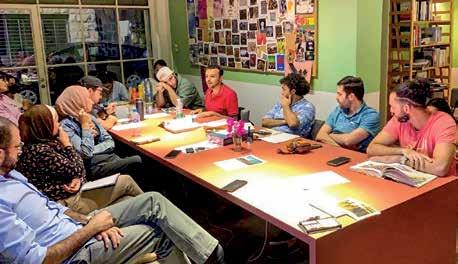 First session of discussion series, “Around the Archive”
First session of discussion series, “Around the Archive”
The fall musical LittleShopofHorrors may have been a bit on the bizarre side, but the outstanding production was a testament to school spirit and collaboration.
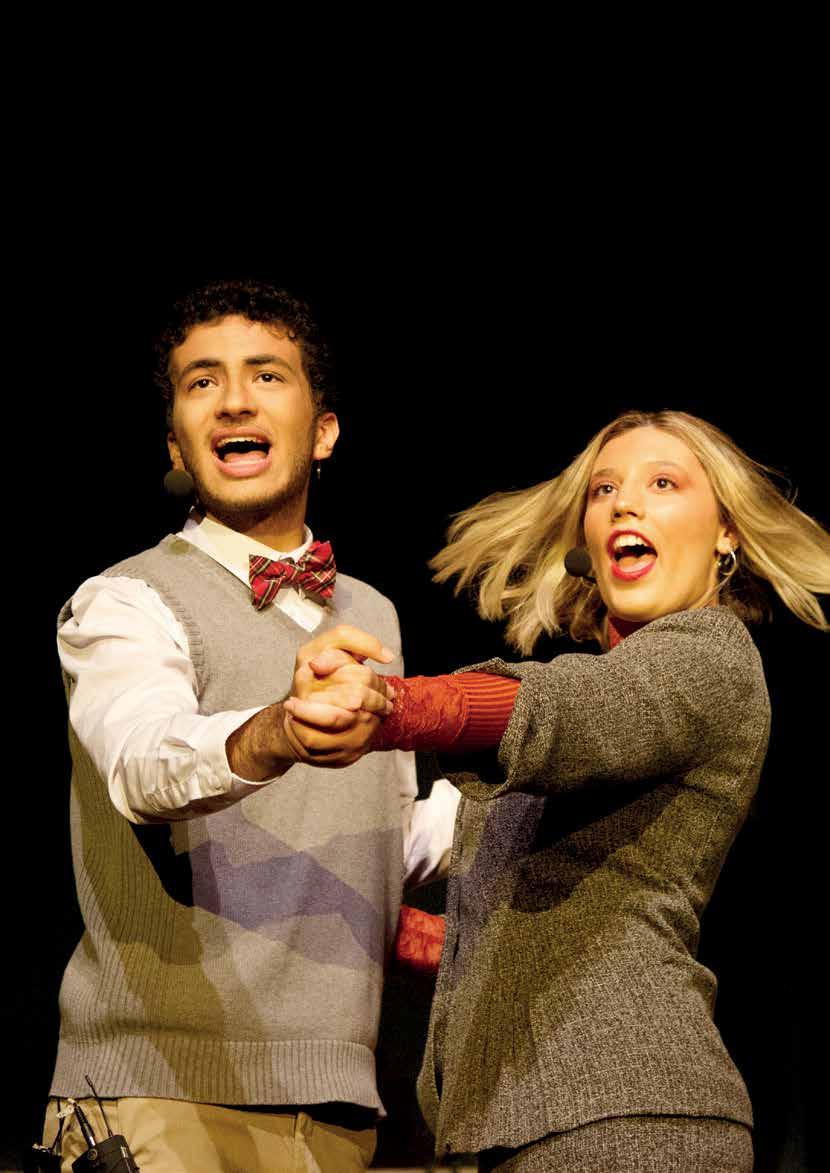 BY MUNA AL-ALUL
BY MUNA AL-ALUL
usic and energy, mystery and romance, comedy and laughter, secrets and strangeness. Little Shop of Horrors, King’s Academy’s fall theatrical production, was a musical extravaganza that literally had it all. From commanding acting performances, powerful singing and catchy tunes, to dark humor and impressive set design and audio-visual effects, led by a talented cast and crew, Little Shop of Horrors was one for the books.
Co-directed by theater faculty members Meghna Gandhi and Pieter Jonker, Little Shop of Horrors is an American horror comedy musical based on the book and lyrics by Howard Ashman, with music by Alan Menken. The plot centers on a floral shop worker, Seymour, who discovers a sentient carnivorous plant that feeds on human blood. The musical was presented through special arrangement with Music Theater International (MTI).
In what could be called an all-school production, with students, faculty and staff from all departments pitching in to bring the musical come to life, Little Shop of Horrors was performed in the Abdul Majeed Shoman Auditorium in front of delighted audiences in December.
That included the 13 students making up the cast, the 17 theater tech crew members, and over 20 production team members — not to mention dozens of community members lending their support in various ways from set production, to purchasing, costumes and makeup, the robotics team, dining hall staff, operations and motor pool.
According to Gandhi and Jonker, Little Shop of Horrors has an energy that is exciting, mysterious and captivating. It is romantic, scary, satirical and edgy, all at the same time. Most importantly, they say, it is bizarre.
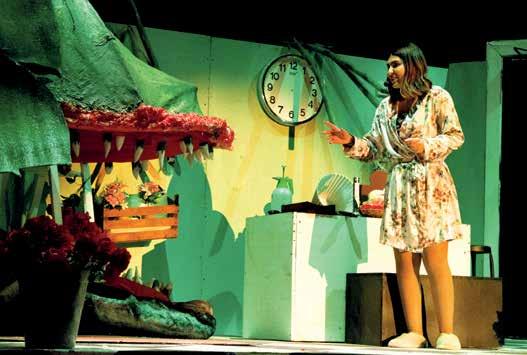
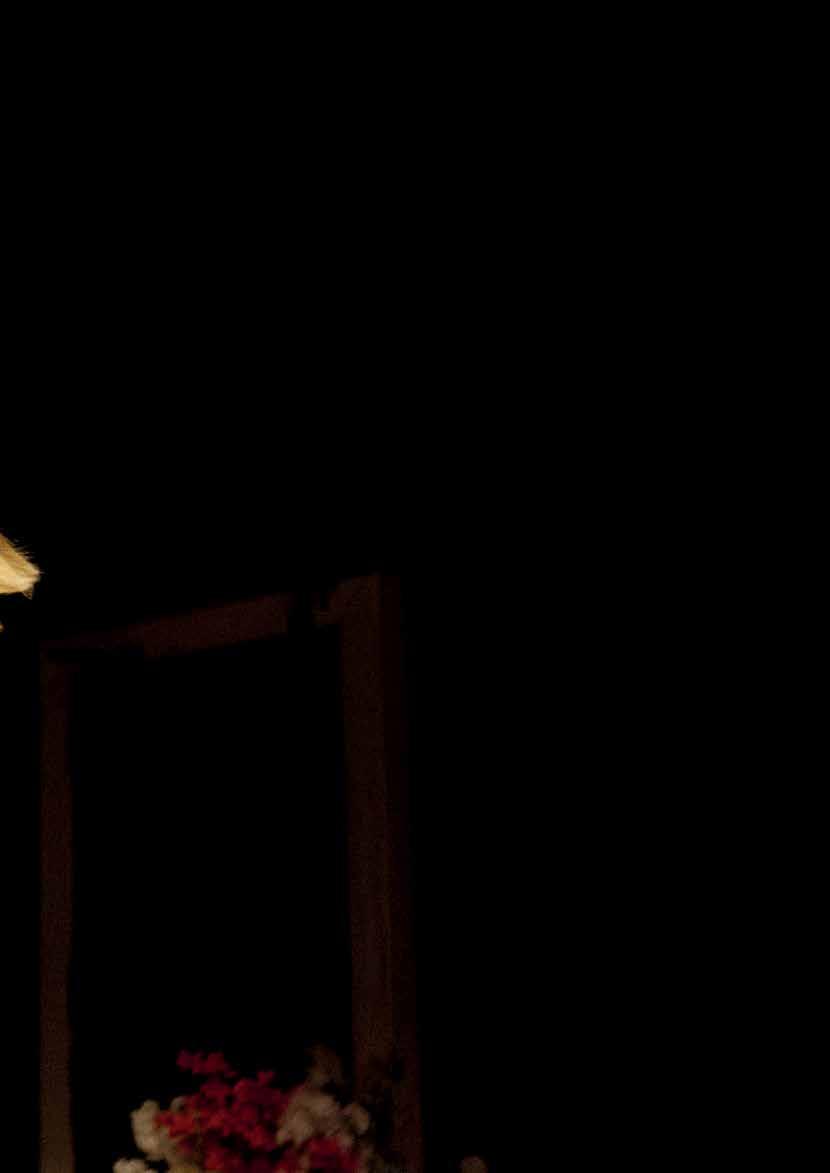
“This year we wanted a shift to something lighter,” says Gandhi about the choice of musical, following a couple of challenging pandemic years. “We liked that [Little Shop of Horrors] had so much depth but also so much lightness and the possibility of so much fun.”
Their directorial concept for the show was ‘light and dark,’ Gandhi explains. “The more we worked with Little Shop of Horrors, the more we saw the scope for this duality that defines human life. Our characters are often torn between difficult choices. As directors, this was a joy to explore with our young actors. We challenged them to depths of thinking and being that require maturity and commitment — and boy, did they lean into the challenge!”
According to Faris Kassisieh ’23, who played one of the main characters, Seymour Krelborn, the fact that the musical involved a great deal of character work was a challenge he enjoyed. “We might have been afraid at the start to go all out with our characters, but that is what musicals are all about — we had to be over the top,” says Kassisieh. “Seymour is a bit evil, but a sweet, nerdy guy too, he’s a layered character. I had to keep that in mind while playing him.”
A good performance is all about focus, believes Rand Tadros ’24, who played the spirited Ronnette. “I sing and perform because I love and enjoy it, but it takes a lot of effort. Every day you need to go into that space with complete focus and grounding, separating your personal life from the musical — but you come out of there feeling ‘wow, I needed that’ — it’s so fun and rewarding.”
The actors were put through rigorous exercises in voice, storytelling, building intention, physicality and connection, according to the co-directors, who were assisted by musical director and vocal coach Judith Goltz. “Through these exercises, our students have inspired us with their curiosity, tenacity and ability to take risks, stretching themselves out of their comfort zones on a daily basis,” says Goltz.
Being involved in the musical was a new experience for Caleb Jackman ’24, who was voice actor for the alien plant Audrey 2. “I was backstage the whole time, I sang a couple of songs, it was a new experience but a fun one,” says Jackman, who was also new to King’s Academy this year. “All my acting was with my voice — when you are on stage you can use your face and body to express yourself — I had to learn how to sound tough, critical, only with my voice, so it was a long process to achieve that.”
Being part of the production was also a great way to get to know people. “I was a new kid this year and didn’t know anyone,” notes Jackman. “Over time I grew closer to people — it’s a small, tight-knit group, and you’re all focused on the same thing, so you click.”
With a prop that was as much a character as one of the human actors, making the story come alive with a moving, talking, singing, blood-thirsty
and demanding alien plant that grew bigger with each change of scene, the people making the set come to life were just as vital to the magic of the production as those on stage.
are students and still learning. If it wasn’t for the effort and passion put forth by all the students to create something they are proud of, it wouldn’t have been the success it was.”
being a director and wanted a fully rounded view of what it takes to put on a production,” she says. “There was so much color, there were so many ideas being exchanged, and I am very proud
In addition to designing and building the four different iterations of the man-eating plant, with assistance from the school’s carpenters, faculty member and technical director of the musical Samuel Hennessy guided the student theater technicians.
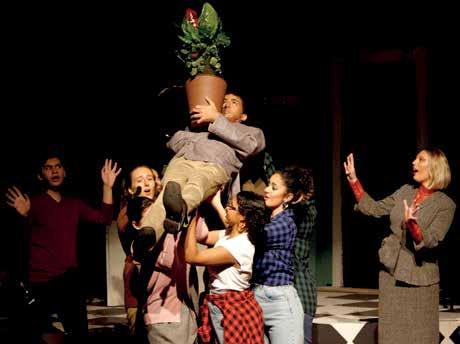

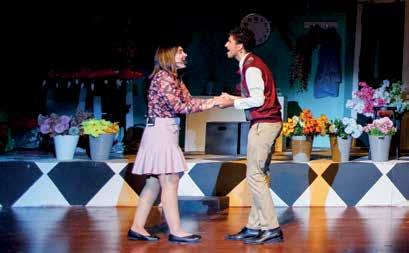
“The tech team really made me proud,” says Hennessy of the students who acted as tech directors, stage managers, lighting engineer, spotlight operator, audio engineer, runners, props master, costume, hair and makeup, and more. “They are in the shadows but put a lot of hard work to make sure these events are run well. How they not only gave up so much of their time during a stressful period of assignments, but how they have grown together and become this family of students who love tech, love helping out at school, and love each other, that is so nice for me to see.”
For Sama Issa ’23, who has worked on the last four musicals at King’s and was student tech director this year alongside Tamara Lutfi ’23, working behind the scenes on the musical is akin to putting together pieces of a puzzle.
“The details are left to the tech team to figure out,” says Issa, noting that at least half the team had little to no previous tech experience before this year. “We had to put the puzzle together which was challenging as we
As seniors, Issa and Lutfi also felt strongly that the onus was on them to train the younger tech team members well in order to pass the baton after they graduate. “We want to pass it on into good hands because we care deeply about it,” says Issa, adding: “This was the perfect show to end my musical journey on here at King’s. I have loved helping create a culture of good performances, of tech being there at all times for every performance and school meeting.”
Meanwhile, for Saja Aggad ’24 — who along with Noor Shahinbanwi ’23 was a stage manager — Little Shop of Horrors was an opportunity to see the other side of working on a theater production. “I have always been on the acting side, but I am working towards
of what we accomplished, and seeing the progression of everyone on stage and backstage throughout was amazing.”
Commending the cast and crew for their “phenomenal” work, Gandhi says: “As a teacher, this show has been a great experience as we can really trace how everyone has grown tremendously in that journey, and that is how a learning experience should be.”
“The way King’s works, the number of departments you have to work with to make a single rehearsal happen, we couldn’t have done it without everyone’s support,” she adds. “It is a King’s Academy production. The whole school community works to make it happen.”
Mr. Samuel Hennessy and members of the theater tech crew.In August 2021, Rakan Alireza ’14 tried on cross-country skis for the first time. Five months later, he had officially qualified to be part of Saudi Arabia’s first ever national Winter Olympics team.
“Being part of a large family of athletes gave me the motivation to compete and continue striving for more,” says Alireza, a longtime fitness and CrossFit enthusiast. “With cousins competing in skiing, rowing, tennis and golf, even a round of UNO can get pretty competitive in my family!”
It isn’t only his family that keeps him motivated, says Alireza, it’s also surrounding himself with a like-minded community and finding opportunities to build his self-confidence that drive him.
Unfortunately, despite qualifying, clerical errors meant that Alireza missed out on competing in the 2022 Winter Olympics. But thanks to a forwardthinking mindset, he has managed to take that disappointment in stride.
“Whatever happens, happens for a reason,” says Alireza, “God’s plan is better than mine, and I’m waiting to see where that takes me.”
His attitude is refreshing in a time where it is more common to see people boasting about their achievements on social media or looking to be part of the next big thing. Alireza, meanwhile, is just trying to do more of what he loves. These days, that means focusing on cross-country skiing and rowing.
Pursuing these two sports provides him with an ideal year-round balance, says Alireza, with winters occupied with ski training and competitions across Europe, and summers committed to rowing with his teammates.
Putting the Winter Olympics disappointment behind him, Alireza soon launched himself straight into training for competitions in the upcoming rowing season. And in December 2022, as a member of Saudi Arabia’s national rowing team, he
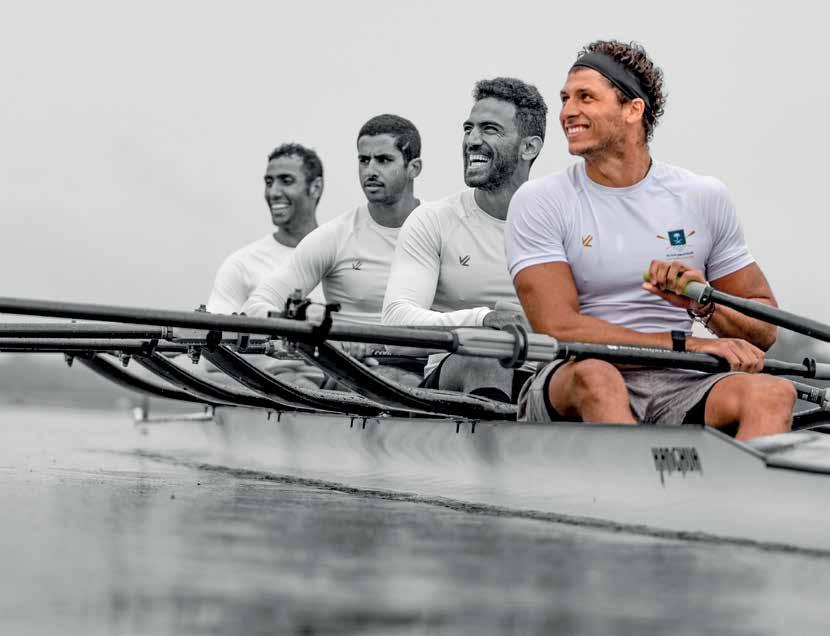
successfully competed in the Asian Rowing Games in Thailand, amongst other local and international events.
Two months later, Alireza had the chance to compete for the first time in cross-country skiing at the Nordic World Ski Championships in Slovenia.
The formula for success is simple, according to Alireza. “The goals I’ve reached are byproducts of just doing what I love.”
Other than competing, his athletic lifestyle has also inspired Alireza to begin working on a project that would make non-motor water sports more accessible in Saudi Arabia. Mental and physical health are so intertwined, he says, and he is eager to find a way to inspire people, especially younger generations, to keep persevering to achieve their goals.
Atithya Ghai is the annual giving and alumni relations officer at King’s Academy.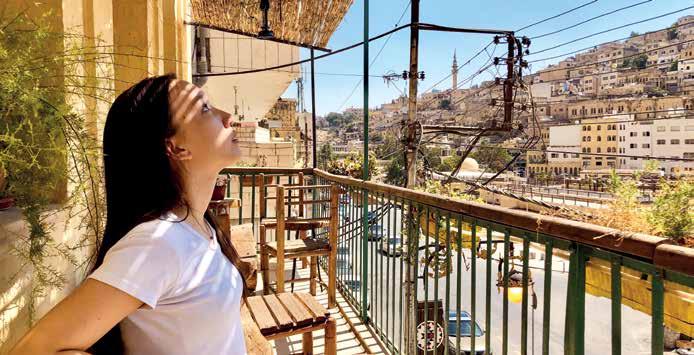
Whatever was happening on campus, you could be pretty sure to find Ruofei Shang ’21 in the midst of it. Whether as the highly involved student she was during her four years at King’s Academy, or in her capacity as student photographer for the school’s Department of Communications and Publications, the alumna left her mark on King’s — be it through the images she captured, or through her active engagement in student life. Beyond King’s caught up with Shang, currently a student of sociocultural anthropology, film and Arabic at Boston University, to see how she has kept up with her passion for photography since graduation.
You worked as a student photographer for the Department
of Communications at King’s. How has that helped you at university? As a student photographer, I was able to develop skills in multiple aspects beyond photography. I got to practice my event photography skills as I covered on-campus events and activities. It helped me develop skills such as the ability to catch the center of the room, find emotions and other tiny details. On the technical side, event photography is more unpredictable as the participants are not static like in portrait photography — the lighting of the venue could be constantly changing; the photographer does not have control over what angles are accessible.
What were the most challenging aspects of being a student photographer?
It challenged me to stretch myself photography-wise and workwise. Having to multitask while in school
helped me to be prepared for any spontaneous and busy time in life. Since the photos were handled in a journalistic manner (i.e. ready quickly to be uploaded to news or website features), I developed the habit of uploading my photos as soon as possible. That was very helpful after I started doing photography professionally, as clients are eager to see the end results. Also, student photographer was just one of my many responsibilities at King’s. At university, I stayed involved in student activism and activities, which can feel overwhelming. However, my high school experience helped me figure out the best time-management strategy for me.
How have you been developing your photography skills since leaving King’s?
I have been exploring different fields (fashion, event, portrait, travel,
wedding, etc.) and mediums of photography (digital, film and even cinematography). Although I was already very interested in portrait and fashion photography in high school, I didn’t really have the time to play around with my style and options. The summer following graduation, I took up multiple portrait photography projects with my friends in China. Then, at university, I joined the student-run fashion magazines Off The Cuff and Charcoal. Because of these opportunities, I met some model friends and started creative projects with them as well.
How has your photography work influenced your film studies?
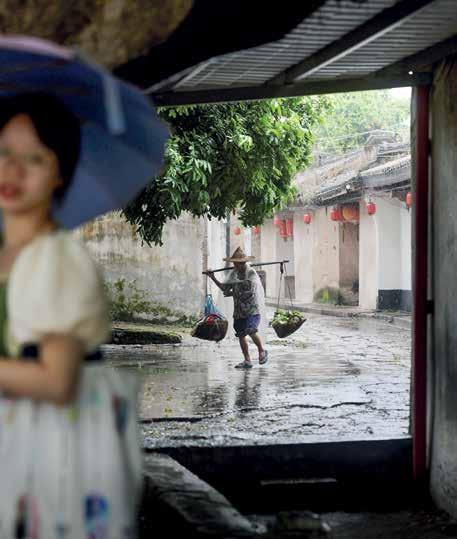
I started casually playing with film photography during my junior year of high school and the early pandemic days. I was intrigued by the medium and the unique colors that film cameras and stock produce. Instead of buying a new camera, my mom gave me one that she bought when I was a baby. I started taking film photography seriously after I returned to China. I took a lot of film photos
while traveling, especially on trips to Tibet, Miami and Puerto Rico. Now, as a film minor, I get to be on many student short film sets. Sometimes, I have the role of behind the scenes (BTS) photographer. My main role is to capture and document how our short films are made and the precious moments that people create.
Tell us more about some of the exciting photography projects you have worked on.
For Off The Cuff magazine, I was part of photoshoots under the themes Skin (fall 2022) and Renaissance (spring 2023). I enjoyed the unique teamwork experience on these projects. They start off as ideas and thesis statements, to visual inspiration boards, styling sessions and photoshoots to, lastly, the post-production editing stage. Contrary to my solitary projects, working with people from different teams on magazines gives me an insight into how larger
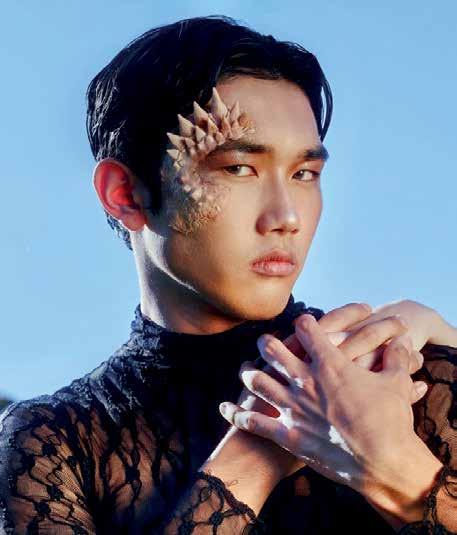
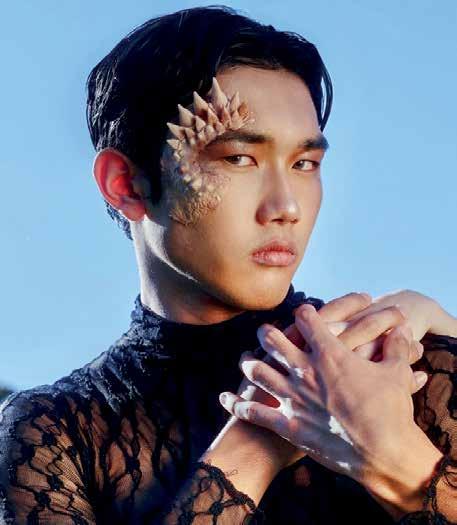
scale projects are fleshed out from beginning to end. For Charcoal, I was the main photographer for our “Yearbook” shoot, where we asked all the members of Charcoal to “be themselves” for the camera. It was so fun and interesting to see how everyone has very different styles.
What is one of your favorite personal projects?
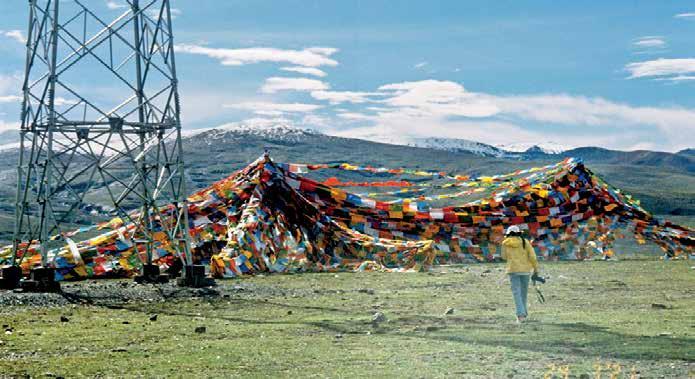
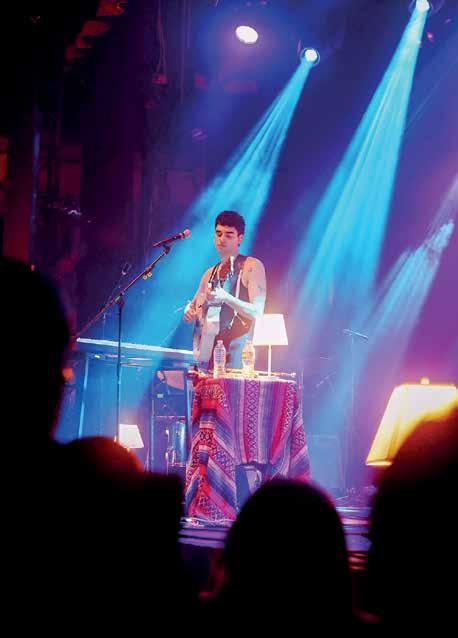
My favorite work has to be “Hong Kong Movie.” They are not necessarily the best photos I’ve ever shot, but the project is my favorite because of the story and process of the shoot. My friend Emily and I share similar experiences growing up in Hong Kong. We were having a nostalgic conversation about the café and movie cultures there and were inspired to do a Hong Kong-style, Wong-Kar-Waiinspired photoshoot. Artistically, there aren’t that many elements symbolizing Hong Kong, yet I really enjoyed the dominance of red and pops of white in the scene. I was impressed by how quickly we gathered the shoot together and I love this project for its spontaneity and personal significance.
Where can we see more of your art?
I try my best to consistently post on Instagram @ruofeinart.
King’s Academy’s oldest alumni are forging a path for the graduates that follow, demonstrating the courage to choose a path that is right for them, while sharing wisdom gained through experiences and mistakes. For one particular alumnus from the school’s first graduating class, curiosity and love of learning led him to make the leap from the world of business to that of science and public health.
After graduating from Florida International University with a degree in international business, Majd Afaghani ’10 returned to Jordan to work for Oasis500, an accelerator that aims to catalyze the entrepreneurial ecosystem in the country and region, before making his way to Kuwait to work in the same field in 2016.
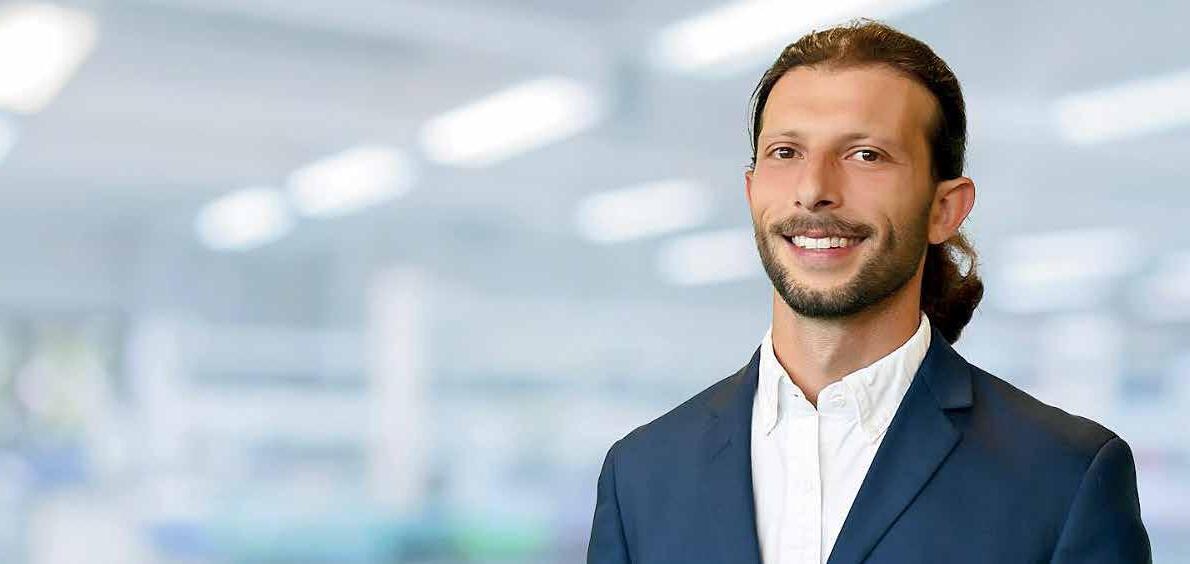
Living in Kuwait and working with university students brought to Afaghani’s attention a major public health issue, the rampant rise in metabolic health disorders, such as type 2 diabetes.
“Kuwait had the highest percentage of obese individuals in the world at that time,” says Afaghani. “The prevalence of type 2 diabetes was mind blowing. Reliance on medication to control blood sugar in adolescents and dialysis in adults was concerning.”
Diabetes is a chronic, metabolic disease characterized by elevated levels of blood sugar, which leads over time to serious damage to the heart, blood vessels, eyes, kidneys, nerves,
and the brain. Type 2 diabetes is the most common, usually in adults. In the past three decades, the prevalence of type 2 diabetes has risen dramatically in countries of all income levels. Over 537 million people worldwide have diabetes according to the International Diabetes Federation’s 2021 report.
Afaghani’s interest in type 2 and type 3 diabetes was precipitated by a personal event; his grandmother had recently been diagnosed with adult-onset type 2 diabetes and later, Alzheimer’s. “I became obsessed with the overlap between diabetes and Alzheimer’s because of my grandmother’s diagnosis,” he says.
Afaghani had always had an interest in biology. At King’s, one of his favorite — and most challenging — classes, was AP Biology. With his interest in those topics piqued by his time in Kuwait, he felt compelled to learn more about ways to prevent and treat the disease, particularly through nutrition.
Afaghani found himself at a crossroads: he could either go to medical school to further his studies or shift his focus to research instead. Realizing that he did not need to be a doctor to continue his research, in 2018 Afghani decided to leave Kuwait to start volunteering at a laboratory in the College of Pharmacy at the University of Florida, soon becoming a full-time research assistant and, within two years, a biological scientist in Dr. Martha Campbell-Thompson’s laboratory where he researched the
gut-brain axis in murine models, and the role of nutrition in metabolic, cognitive and behavioral disorders.
Today, Afaghani is the founder of Metab Health, an organization that uses education, testing and personalized medical nutritional therapy to address metabolic dysfunction, namely type 2 diabetes in adolescents, and type 2 and 3 diabetes in senior populations.
Working with youth through schools, Afaghani hopes to identify students in the early stages of metabolic health problems through testing and to help educate students on how to take charge of their metabolic health by learning about how the food they eat is metabolized, how to track their own metabolic status, and how their decisions impact it.
“Lifestyle factors can be addressed to tackle type 2 diabetes,” he says. “Declining metabolic function is reversible and preventable.”
Through his organization, Afaghani is also tackling Alzheimer’s and dementia — known by some as type 3 diabetes due to the link between insulin resistance in the brain and its declining function. He is exploring solutions for dementia among the elderly and the use of a ketogenic diet to promote metabolic flexibility.
“If you can bring more energy to the brain, you can get more neurons to better perform their functions. Thus, insulin resistance in the brain can be reduced and circumvented while improving quality of life.”
shares what motivated him to leave a career in business to tackle the global diabetes epidemic.
Leen Madanat ’15, a data and analytics consultant with a passion for movement, exercise and maintaining a healthy lifestyle, shares her journey to finding work-life balance.

fter graduating from Muhlenberg College in Pennsylvania, Leen Madanat ’15 moved to the United Arab Emirates where she quickly established a successful career in the digital transformation and data analytics field. Despite her corporate success, however, Madanat felt something was missing in her life. Realizing that her passion for fitness and wellness was taking a back seat to her career, she knew that to feel truly fulfilled she needed to make time for both.
Beyond King’s caught up with Madanat to hear how she has managed to create that ever-elusive work-life balance, not only for herself but for others.
Leen, tell us first about your career. I moved to Dubai in 2019 and began my career as a data and analytics consultant at Dubai Holding and KPMG Lower Gulf before moving to Kearney, a global management consulting firm, in 2022.
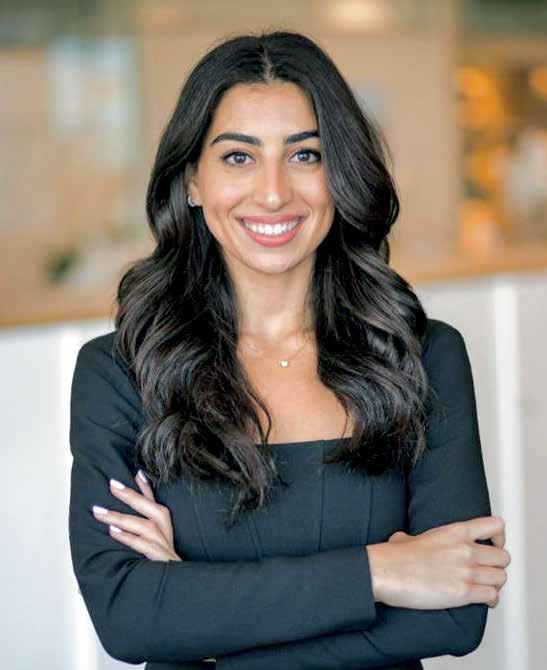
How long have you been interested in fitness and wellness?
My dedication to fitness really began during my time at King's. I was a member of the track and field team, an avid CrossFit-er, a contemporary dancer (performing alongside Mr. Ryuji [Yamaguchi] in the evenings and during talent showcases). In the mornings, you would find me in the gym at 6 am next to Dr. John [Austin] and Ms. Julianne [Puente] on the treadmill. I was also a proctor. You could say that I lived and breathed King’s Guiding Principles — particularly the one about “an integrated life”!
Building your career resulted in other aspects of your life being neglected. How did you find your passion again?
When I realized that my need for fitness and wellness was not being fulfilled in my corporate role, I decided to pursue a 200-hour yoga teacher training last year, while still working full-time at Kearney. I then began teaching yoga on the weekends and found that not only was I able to share my passion with
others, but also find balance in my busy work life.
Your pursuit of balance didn’t stop at yoga! Tell us more.
I feel that an integral part of my personality is helping to empower women and to promote gender equality. So, in pursuit of that, I am also an active participant in Kearney's Women Consulting Network (WCN) and regularly run #IamRemarkable workshops for colleagues. So far, I have facilitated over 15 workshops for 110 participants. These workshops mentor women and underrepresented groups, empowering them to speak with confidence and self-promote their skills, giving them the tools to truly succeed in their careers and their life.
What else are you doing on the fitness front?
I run a Kearney fitness initiative called Kearney Moves. This initiative
encourages employees to prioritize their health and well-being by providing resources and opportunities for exercise and movement. I am really keen on promoting physical and mental well-being, so I’m always looking for ways to improve the initiative and make it more inclusive.
It sounds as though in the pursuit of balance, your life is busier than ever!
Multitasking doesn't have to be a scary thing! It can actually lead to a more fulfilling and balanced life. What I like to call my “corporate awakening” led me to incorporate yoga into my daily life, and now I am able to share that with others through my work at Kearney and teaching on the weekends. I hope that my example demonstrates to clients and colleagues that it is possible to find both balance and fulfillment in a busy corporate career.
Bana Haloush ’24 and Ziyue Jiang ’25 are environmental youth activists helping to ensure the voices of young people — and their concerns about environmental issues — are being heard by policy makers in Jordan.
Last September, the two King’s Academy students were invited, along with other youth leaders, to participate in a high-level closed roundtable meeting with members of the Jordanian parliament to discuss “an integrated approach to climate security and sustainable development towards influencing policy.”
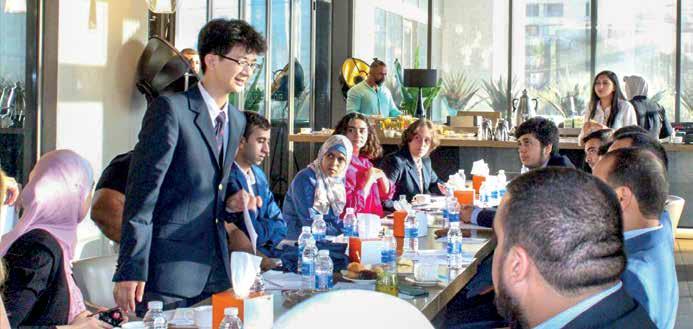
Passionate about the environment, Haloush and Jiang are both active members of the school’s Environment and Sustainability Club, and they are enrolled in Global H2O: Focus on Jordan, a new course at King’s Academy this year that explores environmental, social and economic issues associated with the struggle to acquire clean water in Jordan and around the world.
Jordan is one of the most waterscarce countries in the world, and Haloush and Jiang’s growing interest in environmental science and the country’s water issues led them to seek out a summer internship with EcoPeace where they learned more about the environmental crisis in the Middle East, and which led to their invitation to participate in the roundtable with Jordanian parliamentarians.
The roundtable meeting was organized based on the idea of “student-MP climate surgeries” — first piloted during London Climate Action Week 2019 — which aim to provide a structured platform for young people, the world’s future leaders, to raise questions directly with parliamentarians about environmental concerns.
The meeting, the first of its kind in Jordan, is a first step towards the youth leaders’ goal of connecting with government decision makers in the long-term through youth councils and localized youth strategies, and to seek
opportunities for youth to be involved in policy writing and development that affects them.
In preparation for the roundtable meeting, Haloush, Jiang and the other youth representatives brainstormed topics and issues related to the waterenergy-food nexus in Jordan and explored possible resolutions to present at the meeting that highlight more effective mechanisms and sustainable development, in addition to listing questions that they wanted to ask the parliamentarians.
“During the meeting I stressed the importance of developing Jordan’s water infrastructure and greater enforcement of measures to prevent water loss and waste, as studies show that 50% of water used in Jordan is “non-revenue” water, meaning that it is lost due to leaks, theft, illegal wells and other causes,” said Jiang, who spent his summer break assisting with research involving collecting water footprint data for different crops to help analyze the country’s water imprint.
Taking the floor at the meeting, Jiang also recommended that Jordan invest in desalination plants as well as explore the development of alternative energy sources, which he believes the country could fund by better harnessing solar energy, a resource in plentiful supply in Jordan.
“It was an enriching experience,” said Haloush about the roundtable discussion, noting that the four participating parliamentarians were impressed by the youth leaders’ level of preparedness. “We were able to ask the parliamentarians the questions on our minds, and we also learned about different aspects to these issues, such as political agreements between countries, which gave us a better understanding of how to tackle these issues in Jordan.”
The students discovered that raising awareness about the issues from both perspectives — local communities and policy makers — is also important in order to foster a greater sense of responsibility by everyone towards water conservation and protection of the environment.

In addition to learning a great deal about local environmental issues, policies and climate action, the students found that the meeting was a valuable opportunity for personal growth and development.
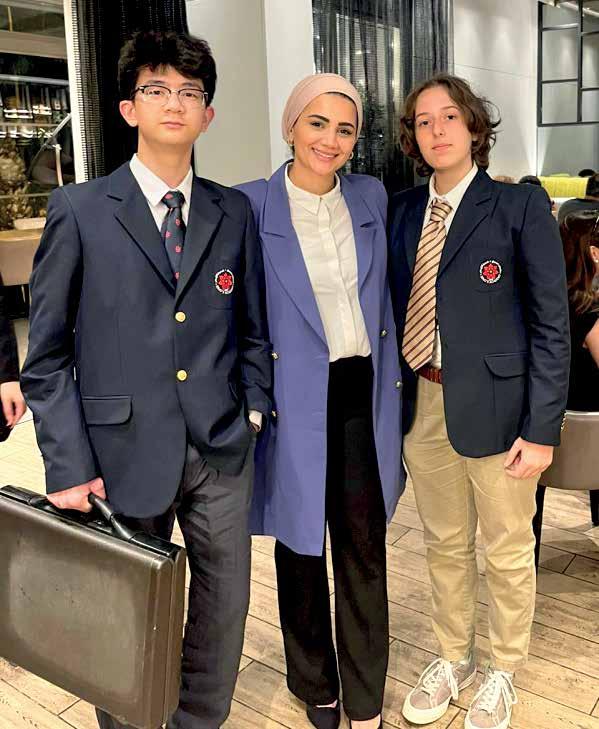
“I learned to express myself with confidence through this roundtable,” said Jiang. “I asked as many questions and gave as many opinions as I could, and my comments were appreciated by everyone.”
The roundtable was a unique platform for intergenerational dialogue, Haloush explained, one that she hopes will lead to more Jordanian youth enabled to participate in climate change actions. “In general, youth are sidelined, we’re never heard. We need to find a place to start to be heard and this was a great example.”
On the occasion of International Women’s Day, the former faculty member shared with students ways in which she has empowered herself.
BY MUNA AL-ALULAs a filmmaker, photographer, visual storyteller, activist, educator, social media influencer, entrepreneur, and mother of twins, life for Ala Hamdan can feel like a juggling act. As the co-founder of a production company, At Films, and with over one million followers on Instagram,
Hamdan certainly appears like she has no trouble keeping those balls in the air. However, the former King’s Academy faculty member is the first to admit that she struggles just as much as the next person, be it with multi-tasking, self-doubt, or the challenges of being a public figure in the age of social media.
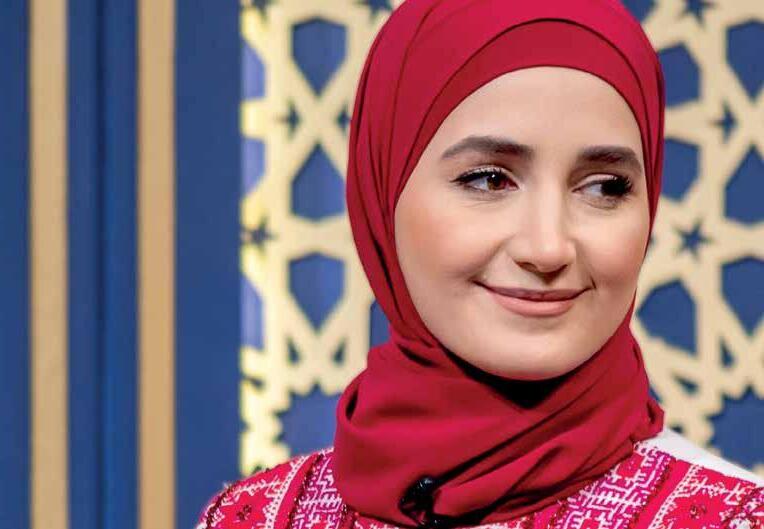
King’s Academy invited Hamdan back to school in March as one of
a series of guest speakers to mark International Women’s Day, to give students the opportunity to learn more about and hear from inspiring women in our community. In the spirit of Women’s Day, Hamdan spoke to students and faculty about how, as a woman in her field of work, there are four things she never regrets saying “yes” to.
“Women are more likely than men to not take opportunities because they think they are not ready,” said Hamdan. “But if everyone waited until they were 100% ready, they would never try anything!”
Hamdan — who has won awards for her films and photography — shared how, in 2014, she took on the challenge of creating a couple of short films for television, even though she did not have much experience producing for tv. They aren’t her best work, she admits, but she is glad she
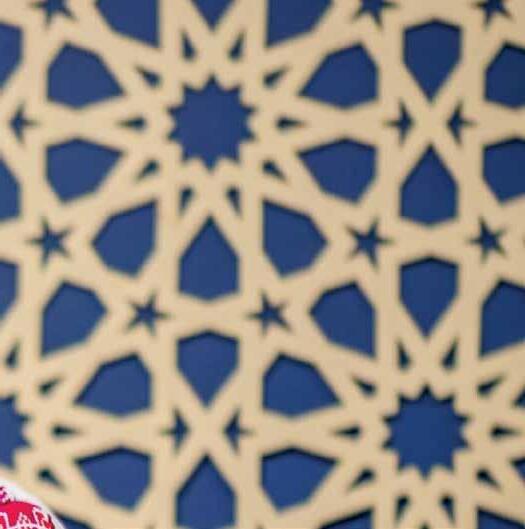
TV daily throughout the month of Ramadan this year.
With over one million followers on Instagram, Hamdan said there are many people who disagree with her online when she talks about issues such as women’s rights, Arab stereotypes and Islamophobia. “There are a lot of people who are just not happy seeing a woman, who wears the hijab, going on social media and talking about these issues,” she said, adding that social media is more critical of women in general. She realized that she needed
place. “I would rather have those discussions on bigger and better stages with audiences that want to help make the world a better place with me,” said Hamdan, who has spoken at UN Women’s WeRise event on gender equality and women’s empowerment, and joined UNFPA’s campaign #ThisIsNotNormal against genderbased violence.
Despite the challenges associated with being so public on social media, Hamdan said it was important to her to use her large platform “to give a voice to the voiceless,” even when doing that is difficult. “I have the privilege of having a supportive family, a large platform, and an understanding of both Arab and western cultures,” she said. “If I have all this, why can’t I help bridge gaps in understanding?”
One of the ways she has done that is by co-creating and doing the photography for a book called Muslims of the World — a best seller on Amazon upon publication in 2018 — that involved traveling to 14 countries over the course of a year to meet and document the lives and stories of everyday Muslims to help combat misperceptions and stereotypes. She is also passionate about giving a voice to survivors of domestic violence and raising awareness about the issue through the creation of a video series in which women tell their stories.
did them. “I try to challenge myself and take opportunities, even if I know I am not ready for them, because I know I am willing to work really hard, and to learn from that experience,” she said. She needed that experience, she explained, so that she could do better the next time. Never one to say no to a challenge, her next foray into television saw her present a live show on Roya
to choose her battles wisely, and not waste her energy trying to reason with random critics online.
“I ask myself three questions to decide how I want to spend my time and effort: Is this problem really important? Do I need to deal with it? Can my time be better spent elsewhere?”
When she decided to choose her battles, she found herself in a better
While it is tempting to try and follow all the trends on social media to quickly build a bigger following, Hamdan explained that for her, what was most successful was being true to who she is. “Don’t force yourself to do something that is not you,” she said. “I think about what I like, what causes I feel connected to, who I represent, why I am on social media. Those subjects might not make me trending, but I create content that represents me, that helps people — and that helps me grow slowly and steadily on social media.”
“Once you answer those questions for yourself,” Hamdan added, “you will find yourself making content, being creative, and furthering those causes.”
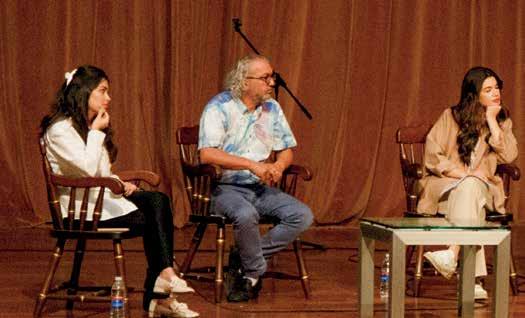 BY MUNA AL-ALUL
BY MUNA AL-ALUL
At King’s Academy, a love for the arts has infused the school’s psyche to such a degree that many non-art courses find themselves incorporating artistic elements – for example by creating sculptures in literature class, or through creative STEM projects that blur the lines between traditional learning and artistic design. It comes as no surprise then that King’s students actively seek out ways to pursue their creative passions after graduation.
In aid of that, during the school’s annual Arts Week last fall, the Department of Art, Design and Technology hosted five guest artists representing different careers and backgrounds for a panel discussion entitled “Art in the Real World” to share with students what it was really like to pursue a career in art. The discussion was one in a series of 15 guest speakers lined up this year to mark the 15th anniversary of King’s Academy.
One pressing question for many students was how to know whether to choose a career in the arts. According to Shireen Talhouni, an Amman-based choreographer, performance artist and former architect, it was her lack of passion for architecture that made her decide to switch careers.
“I was working in a big architecture firm and would look at my boss and how passionate he was about what he did — it made me realize I shouldn’t be dedicating my life to something I didn’t look forward to waking up for every day,” says Talhouni, who now creates dance-based audio-visual experiences in addition to teaching children about learning to express themselves through the medium of movement.
Similarly, King’s own alumna, actor and singer Yara Mustafa ’20, knew the arts was the path forward for her because “art was everything I
consumed.” According to Mustafa, who starred in the Netflix series Al Rawabi School for Girls, it was something her theater teacher at King’s said that helped her decide to actively pursue acting as a career. “[Alison Trattner] instilled in me that ‘you have to put in the hours,’ and I realized that I wasn’t interested in putting those hours into any other field.”
For abstract artist and activist Suheil Baqaeen, an end to his 25-year career in travel and tourism opened the door to a more fulfilling career. “I had a great art professor whose approach
to art taught me that art can heal you, which eventually led to me following my passion to teach art to refugees, to kids on the autism spectrum, and to the visually impaired,” says Baqaeen, who is also director of the Jordanian National Gallery of Fine Arts’ touring museum.
An education in the arts is undeniably important at King’s Academy, but that sentiment is not always shared, particularly in a part of the world where more traditional careers are deemed more desirable to parents and to society.
King’s alumnus Suhayb Al-Jawhari ’11 always had an interest in different kinds of art and ways of expression, but he expected some pushback when choosing to pursue a more creative career. “I asked my parents: will you be proud of me if I don’t do the things that you wanted me to do? It was a difficult moment, to build up the courage to do
Formerly an architect, it was when Rawan Alam was tutoring students that she felt the most joy in her work. Inspired by that to change careers, she found a way to combine the best of both and now teaches art and a new course on architecture as a faculty member at King’s.
“I tell my students, don’t take art and design only if you want an art profession, take art and design even if you want to study medicine, engineering or science,” Alam says. “Art is in everything, it is all around us. Art triggers something in your mind that motivates you to think: maybe I can do this in a different way.”
While King’s actively promotes art education, Baqaeen has seen the other extreme. “Our touring museum visits government schools all around the country, schools that don’t offer a single art lesson in their curriculum,”
voice, she says. “It’s about taking risks and having the courage to share with others. You find something in yourself you want to express and explore, and you find a medium that excites you and you do it.”
In Mustafa’s opinion, you will not know what you like, or don’t like, without trying it. “What’s the worse that could happen?” she asks. “You learn something new, if you don’t like it you move on. I tried AP Studio Art, but it wasn’t for me. I never expected that Lens-Based Art and Photography would be my favorite class ever at King’s.”
Pursuing an artistic profession is challenging at the best of times, and especially in the Middle East where artistic careers can be perceived negatively, so what motivates artists to keep following their dreams, students wanted to know.
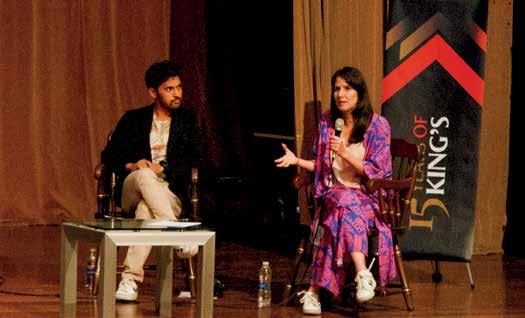
“Photography for me is a way to understand myself,” says Al-Jawhari. “It’s a tool to discover the world. My curiosity drives me to continue doing what I’m doing.”
For Mustafa, representation is what drives her. “Growing up, there was no one on TV who I felt represented me,” she says. “When Al Rawabi came out, I was flooded with messages from so many little girls and boys saying they saw themselves in my character. So, that happening for others is what it’s all about for me.”
that.” Al-Jawhari is a photographer and creative producer who has worked on multiple film productions. He currently works with King’s Department of Communications and Publications.
“I refused to stay in one lane, to do whatever we were told by society to do when we were young — it doesn’t have to be that way,” says Al-Jawhari. “Everything is designed, everything is intentionally made — so why can’t I also create something intentionally? This journey that I’m on is one of personal growth and values — that is more important to me than status.”
he says. “Art enriches our lives, so these visits really help to expand these children’s minds by introducing them to artists, artwork and even the simplest art techniques.”
Another question that King’s students were keen to know more about, was how the panelists were able to develop their own unique artistic styles.
According to Talhouni, “you need to make things just for the pleasure of making them and not worry about what it is going to look like or be.” Through that process, artists start to find their
Courage and passion are two of the biggest driving forces behind Talhouni’s motivation to keep pursuing her dancing and choreography career. “When I practiced dance in London, it was easy, there were lots of opportunities, infrastructure and space,” she explains. “When I moved back to Amman, it was a lot harder but also a lot more important to keep doing it. It is quite radical as a female to use your body as a tool for expression.”
Challenging the particular stigmas faced by women in the arts is another motivator, Mustafa adds. “Change is a big motivation. We artists are going to exist in this country, we’re going to do our thing whether it is accepted or not. That may not please everyone, but making sure our work stays out there is important because then we are changing things.”
King’s Academy alumnus and aspiring neurosurgeon Walid Salah ’13 was invited back to school as the first in a series of 15 guest speakers and panel discussions to mark the 15th anniversary of King’s Academy.
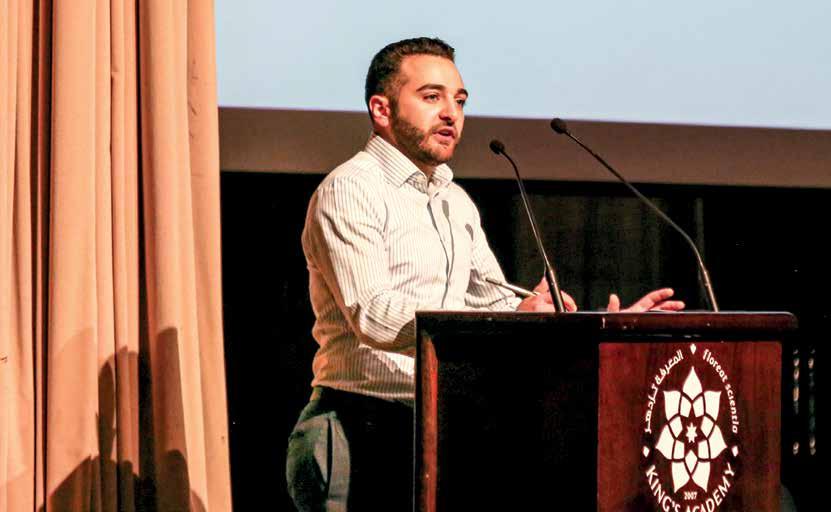 BY MUNA AL-ALUL
BY MUNA AL-ALUL
alid Salah ’13 is the first to admit that he was a fairly average student in school, content to just “get by,” as he put it during a talk to students during a special school meeting in October. Today, however, Salah is working in one of the most competitive and prestigious specialties in the medical field — neuropsychiatric/functional neurosurgery — and has completed medical school at the top of his class and in the top 5% across the United States.
But how did he go from average student to honor student? Sharing with the school community his educational and professional journey so far, Salah explained that it was lessons he learned during his years at King’s that set him on the path to success.
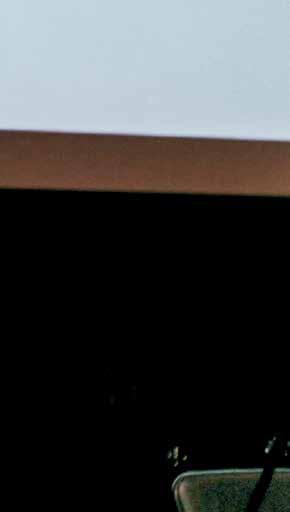
“At my previous school, before King’s, I had almost no interest in excelling academically,” he said. “When I moved to King’s it was the first time in my life that I felt privileged to
be around such intelligent and ambitious classmates from around the world. That sparked a flame of inspiration in me that I never knew existed.”
His teachers, and their “unique devotion to fostering a learning environment that was both challenging and rewarding,” also had a huge impact on his experience at King’s, recalled Salah.
“I came to King’s in the middle of my sophomore year; having missed half the year, both teachers and classmates were dedicated to helping me get caught up. That is where I learned the true meaning of teamwork and community.”
Working in neurosurgery, spending more time at work taking care of patients around-the-clock than with your own family, community becomes everything, he added.
“Working in this field can be daunting, distressing and even our strongest members can find themselves in the slumps. What gets us through these times is our community, and at King’s, they teach you very early on the importance of leaning into your community to get through challenging moments.”
After King’s, Salah matriculated at Duke University where he majored in politics, philosophy and economics. He worked as a researcher, dedicated to health care policy development and investigating novel pharmacotherapy and interventions for treatmentresistant depression and smoking cessation.
After working in that field for a couple of years, he decided to change the trajectory of his career and to go back to university — this time, to medical school. He is currently completing his fourth year as a medical student at the University of Utah, doing a year of clinical neurosurgery and neurosurgery research. He plans to specialize in neurosurgery and complete a fellowship in neuropsychiatric/ functional neurosurgery.
“People are often surprised when they learn that I didn’t get into medical school the first time I applied,” said Salah. That failure, however, only made him more determined to apply again,
and after improving his application he was admitted to one of the top medical schools in the United States.
Salah describes surgery as a team sport. “Your team is only as good as its weakest link. On every journey I embarked on I was the weakest link at one point, but I was able to develop my skills and continue to improve because King’s teaches you to seek help when you need it, whether from your peers, a faculty member, or a resource at your disposal.”
It was at King’s that he also came to learn that “getting by” was just not good enough for him anymore. “This school provides you with so many resources and opportunities that it would be a complete waste of your time if just getting by was the goal.”
Now, having ranked #1 in his internal medicine, neurology and psychiatry rotations, received honors in his pediatrics and surgery rotations, and completed medical school in the top 5% of the country, Salah is adamant that his achievements are more to do with hard work and learning to overcome failures encountered along the way, rather than having any kind of exceptional intelligence.
“The skillsets to accomplish these things came from the lessons I started to learn when I was sitting in the very seats you sit in today,” he said to King’s students during his talk. “The only limitations you have on what you can accomplish are the limitations you place on yourself. Anything and everything else can be overcome if you set your mind to it and believe in yourself.”
[King’s] provides you with so many resources and opportunities that it would be a complete waste of your time if just getting by was the goal.
 BY PETER NILSSON
BY PETER NILSSON
The release earlier this year of ChatGPT, an artificial intelligence chatbot that can summarize and converse about the near totality of the Internet, has shaken schools all over the world. ChatGPT can write term papers in seconds, summarize complex physics concepts in easy-to-understand prose, offer explanations for historical events and trace their aftermath, and much, much more. First reactions to A.I. tools like ChatGPT tend to focus on fears of cheating, but further reflections recognize the extraordinary power this emerging technology can have to advance education, to accelerate industries, and to expand opportunities for all citizens with access to an internet connection.
Here at King’s Academy, we spent the first two faculty meetings of the year focusing on what A.I. means for students and for teachers. We have shared tools to detect cheating, of course, but more importantly, we have discussed ways in which students can use this new tool to learn more and to do more.
When a teacher was approached by a student, for example, asking for a book recommendation based on two previous books she had read, the teacher together with the student entered the names of the books and asked ChatGPT for 10 recommendations that would be similar and suitable for a 9th grader.
The A.I. offered a reading list, and the teacher and student talked through the books together to identify the best choice. In a college-level research course, students were invited to ask the A.I. for directions they might take in their research. The teacher will follow up with conversations with each student about their findings. In our weekly flash fiction contest, in which students write short stories shorter than 250 words, the teacher hosting the competition
asked students to write a story using the A.I. to help write the story, and to highlight in bold the words written by the A.I. and to keep as normal the words written by the students. This allowed the student to experiment with a powerful, new, publicly available tool, and we as teachers were able to observe how students engaged with it.
Professionally, other teachers have asked ChatGPT for discussion questions for novels, creative projects
for demonstrating mastery in chemistry, or different ways to explain ideas in mathematics. They have asked ChatGPT for examples of ethical dilemmas that could be posed to adolescents. They have asked it to write songs, including chord progressions, about specific topics. It has done all these things.
ChatGPT and other A.I. technologies are not only poised to supercharge education, but almost every industry. Lawyers are testing A.I.’s ability to sort through deep legal case history and find and summarize cases that set precedents on particular topics. Newspapers are already using A.I. to automatically write press releases. Artists and creative advertising industries are using A.I. to make complex illustrations in seconds.
Like personal computers, and then the internet, and then mobile devices, generative A.I. will provide the next platform for innovation and the rapid acceleration of future workforces.


































These tools all fit into the category of generative A.I., an emerging field in which machines supplement human creativity and productivity. And while they are set to significantly support the nature of work around the world, they are also still in their infancy. A.I. makes mistakes, and sometimes egregious ones. ChatGPT has been shown to fabricate academic sources, make up quotes from novels, provide incorrect answers to simple arithmetic questions, and others. These mistakes happen because the underlying technology is still very young, not yet even a toddler. But this is the next major leap in the technology world. Like personal computers, and then the internet,
and then mobile devices, generative A.I. will provide the next platform for innovation and the rapid acceleration of future workforces.































It’s our obligation as schools to engage our students with tools like these not only to prepare them for the future they will inherit but also to empower them to shape that future. At King’s we are proud of the six different computer science courses students can take, from learning multiple programming languages to post-Advanced Placement topics in programming at a university level. Those who can use and those who can make these powerful technologies will be the ones shaping future industries. And now, this kind of technology is accessible not only in computer science classes, but also across the curriculum.
Learning still works as it always has — good questions, challenging problem solving, active and creative projects. But the tools to engage these questions, problems and programs are growing more sophisticated. It’s important for us to set clear guard rails to protect academic integrity, but it’s also important for us to create spaces where students can experiment and
explore with the most cutting edge resources. Students who can learn to master these tools will be the ones who will drive change towards our shared future of peace and opportunity.


It’s important for us to set clear guard rails to protect academic integrity, but it’s also important for us to create spaces where students can experiment and explore with the most cutting resources.Peter Nilsson served as head of school at King’s Academy from 2019 to 2023.
We wanted to find out if ChatGPT could help the Department of Communications market King’s. So we asked it to write a 300-word article about why it is to Jordan's advantage to have a boarding school like King's Academy in the country.

Jordan, a country located in the heart of the Middle East, has seen tremendous growth recent years. As part of this development, Jordan has invested in various sectors, including education. One of the significant investments in the education sector is the establishment of King's Academy, a prestigious boarding school that has become an essential asset to Jordan.
King's Academy, founded in 2007, is a co-educational boarding school that provides a rigorous academic program and holistic education to students in grades 7-12. The school is located in Madaba, Jordan, and has attracted students from all over the world. Here are some reasons why it is to Jordan's advantage to have a boarding school like King's Academy in the country:
First, King's Academy serves as a hub for international students who
want to study in the Middle East. By having a boarding school with a strong reputation for academic excellence, Jordan is able to attract students from all over the world. These students bring their diverse cultures and perspectives, which enriches the educational experience for all students. Moreover, these international students create networks that will benefit Jordan in the future as they become leaders in their respective fields.
Second, King's Academy provides an education that is on par with the best schools in the world. The school's rigorous academic program challenges students to think critically, communicate effectively, and be independent learners. Furthermore, the school offers a holistic education that includes athletics, arts, and community service. Graduates of King's Academy are well-prepared for higher education
and are equipped with the skills and values needed to make a positive impact in their communities.
Third, King's Academy contributes to Jordan's economy by creating jobs and attracting investment. The school employs hundreds of people, including teachers, administrators, and support staff. Additionally, the school attracts investment from individuals and organizations that are interested in supporting education in Jordan. This investment creates opportunities for Jordanians to start businesses and work in the education sector.
In conclusion, King's Academy is an essential asset to Jordan. The school attracts international students, provides a world-class education, and contributes to Jordan's economy. As Jordan continues to invest in education, it is essential to recognize the value that King's Academy brings to the country.
King’s Academy students
Leen Mehyar ’25 and Jood Adayleh ’25 participated in the 2023 Zero Project Conference that took place in Vienna, Austria in February, along with Head of the Learning Center at King’s, Rana Matar.
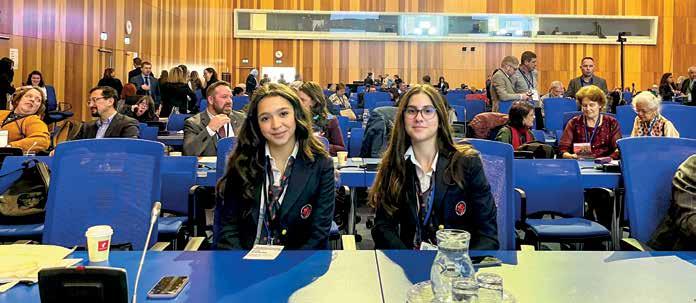
The Zero Project Conference (#ZeroCon23) is an annual disability inclusion gathering at the United Nations Office in Vienna. It brings together innovators and key decision makers from all sectors to foster partnerships, share new proven solutions, and support the international scaling of these solutions, all towards the mission for a world with zero barriers.
This year, the conference theme was “Independent Living and Political Participation, and ICT” with the aim of highlighting new and innovative solutions from around the world. Among the many forums of the conference, participants also attended round tables on topics such as innovations in mental health, projects that provide solutions for persons with psychosocial disabilities, international standards that are enabling accessible
telehealth for all, interdisciplinary connections between cybersecurity and persons with disabilities, and many more contemporary disability inclusion challenges along with the solutions that address them.
Mehyar and Adayleh were two of 15 youth from around the world selected as members of the Zero Project Youth Delegation (ZPYD). Their participation was supported by sTF5 Care, a private philanthropic venture that works with grassroots organizations to deliver evidence-based health and education solutions to Jordanian and Palestinian communities.
Among the activities, the students were invited by President of the Austrian Parliament Wolfgang Sobotka to the launch event at the Austrian Parliament, newly renovated to be made barrier-free, where they listened to the keynote address by the World Bank’s Global Disability Advisor Charlotte McClain-Nhlapo.
With a focus on self-advocacy, King’s young disability advocates were encouraged to share their stories and tell the stories of inspiring people at ZeroCon23 using various media formats to express themselves. They
also took part in a workshop to learn interviewing techniques which they then used to interview, one-onone, prominent disability inclusion changemakers from the private sector, public sector, as well as civil society, which were featured on the Zero Project’s social media platforms. Other activities included workshops on how to use tools such as humor, photography, social media, writing and more in their disability advocacy efforts.
“Being part of the youth delegation at the Zero Project Conference was an extraordinary experience,” said Adayleh. “I got to hear from people with disabilities about their personal experiences, and from people who are specialized in disability inclusion. I gained more knowledge about disability inclusion and how, by making every place accessible, we can build a world with zero barriers for everyone.”
Talking about her experience as a member of the youth delegation, Mehyar said: “One of the main things we took away from this conference was how to piece together other people's experiences in order to better understand how people react in different situations.”
Every year, the King’s Academy theater team produces one major show and several smaller productions. These events are a collaborative effort between students and faculty and an army of behind-the-scenes staff members. Over the years, certain members of the staff have become integral to the creative process. This article highlights five of those talented, committed, but often invisible members of the team.
With his buzzing energy, Abdullah AlMaaiah is everywhere on campus, doing everything, at all times. A Madaba native, AlMaaiah has worked at King’s Academy since 2008. “I first came to King’s to work in Housekeeping, but being in an educational environment made me want to go back to university,” he says. After graduating with a Bachelor's degree in Information Management Systems, AlMaaiah received a promotion.
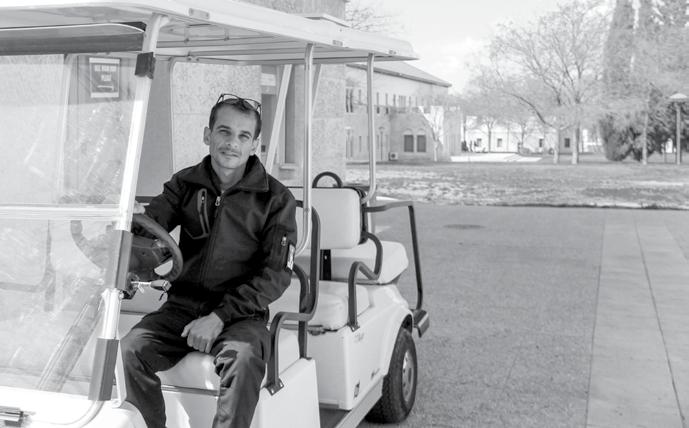
The thing that perhaps distinguishes AlMaaiah from other operations crew members is that no matter the hour, he will answer a phone call and solve a problem. It is probably why none of the theater teachers imagine doing a show without him. “Theater is amazing,” says AlMaaiah. “It is very refreshing to see something this professional done by students.” Asked what his role is for a performance, he has an immediate
answer: “Problem-solver! Ms. Ola, Ms. Alison, Ms. Jana, Ms. Meghna, Mr. Pieter, Mr. Sam — they can call me at any time, with any request, and my job is to make it happen. Preparing the auditorium, moving furniture, maintaining the storage rooms, I will do it all. My team is always prepared to support our students.”
AlMaaiah’s strength also lies in how well he knows the spaces and people
on campus. “Of course, if I can’t manage a task, I will guide them to someone who can,” he says. We can’t imagine doing a show without him. For his part, he hopes one day for a collaborative community show to happen. “Employees in many departments are very talented,” he says. “It would be wonderful to showcase these talents to our students and with our students.”
Osama Alswirki - Carpenter
Rusty hammer. Giant electrical saw. Paint buckets in 10 different colors. Wooden boards on a giant worktable. A big yellow toolbox. That is Osama Alswirki’s workshop. Situated on the edge of the campus behind the football field, this is where Alswirki spends most of his hours, that is, if he’s not out fixing a broken bed or closet. A King’s employee for eight years, Alswirki has made too many set pieces to count. Most recently, he built Audrey II, the giant man-eating plant monster for this year’s Little Shop of Horrors musical. “The easiest part about making it was coming up with the design,” he says. But then actually building the design was hard. The monster is big and when building something that big, safety has to be a craftsman's number one priority. Particularly in our case, because the handlers are students.”
He goes on to describe the big stairs he built for She Loves Me and the sense of pride and contentment he feels when entering the auditorium for the first time after the set pieces he built have been installed. “It’s not just me, as any kind of craftsman, when your work is ready, you’re very happy.”
Alswirki’s workshop becomes a hotspot for student theater technicians in the weeks leading up to the musical. Alswirki describes his happiness at seeing 15 kids at his workshop door. “Sometimes, the kids, when they come, they make quite a mess. There’s paint on the floor and five glue guns heating up and I think, Ya Allah what is happening here! But then I see these children building and sawing and painting and I know we are creating something beautiful together. At King’s, most of my work is routine: fix a bed, build a closet, repair a door. But with
the musical, I can be creative and artistic, and I get to do it with the students.”
Abdelqader Abuoqah – Tailor
“Every step in theater is an adventure,” says Abdelqader Abuoqah, resident tailor at King’s Academy. Unknown to most, in a corner of campus there lies a room full of fabric, lace, beads, thread, and a sewing machine. This is Abuoqah’s office and workshop. It is here that he has imagined and created costumes for King’s Academy’s musicals and plays over the past 15 years.
brought my family to watch Once Upon a Mattress. Unfortunately, my son was about a year old at that point and he started crying just before the show started. So, I spent the entire evening outside the auditorium. When I went back in, the show was ending and my family was getting ready to leave. But then Ms. Alison called me on stage for the credits. My family was so proud.”
Reham AlGunimat – Housekeeper
“I don’t just clean, I protect,” says Reham AlGunimat emphatically when we ask her about her housekeeping role. “I keep the stage safe. Have you
Most people associate Abuoqah with his routine work: uniforms, curtains, graduation robes. We ask him if his family knows about all the unique pieces he creates for theater. “Well, I
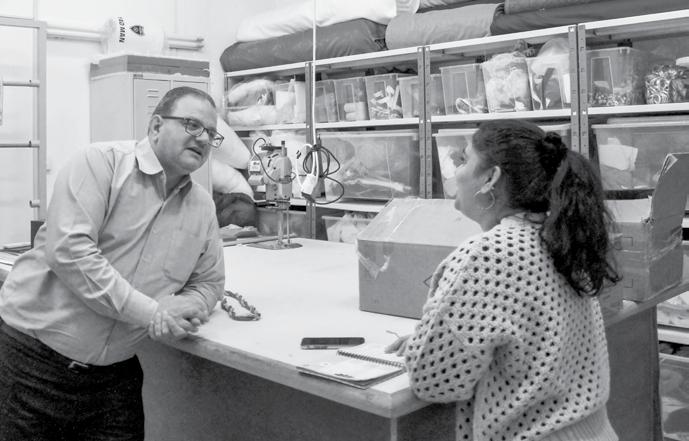
seen the pieces of wood and plastic and nails and wires that are left behind on stage sometimes?” AlGunimat has worked at King’s Academy for the past five years. One of her duties involves
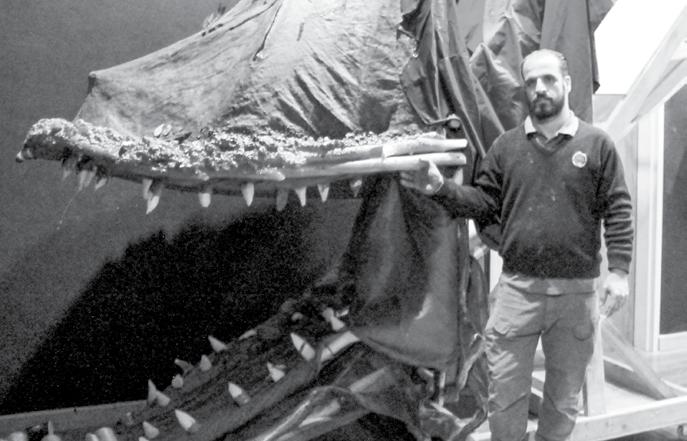
cleaning the auditorium. During performance nights, that means making daily trips into the mad world of rehearsals, set building, costume trials and lighting runs to keep the place organized.
“I am dedicated to taking care of people,” she says, “and these students are like my children. I see how hard they work on stage. I have to ensure that they are safe.”
We ask her to share a memorable story from her experience with Little Shop of Horrors. “When I am cleaning the seats and aisles, I love it when a song is being rehearsed on stage. My attention might be on the floor, but I can feel the emotions on stage. Particularly the girls! Some of the girls in Little Shop sing so well.”
Asked what message she has for readers, AlGunimat thoughtfully replies: “At the heart of all work should be integrity and dedication. I am dedicated to our students. When I clean the costume and make-up rooms upstairs, I always say an encouraging word to the actors who are getting ready. I think it motivates them.”
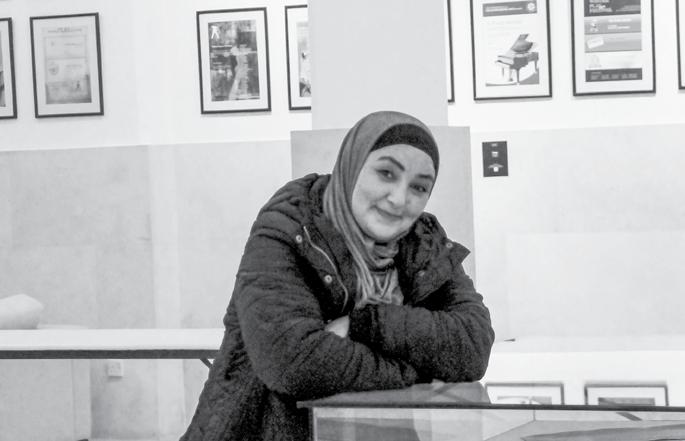
Rehearsal is in progress. Action. Direction. Tension. We hear the sound of the golf cart whizz past. We smell the hot shawerma and tea. We see platters of gooey chocolate chip cookies appear. All is well with the world.
Whether you realize it or not, food is a crucial part of the theater-building
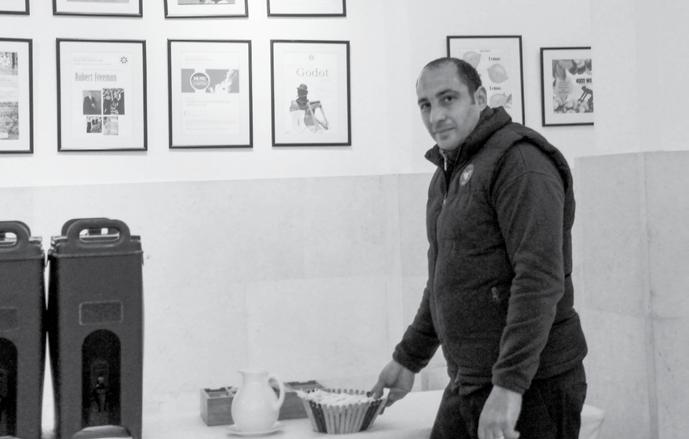
process. Hungry children do not good actors make! Feeding students the right thing at the right time ensures the right kind of focus, energy and often,
motivation. Bringing the theater team’s food dreams to life is Lawrence Salaitah, a member of King’s dining hall team for the past 13 years. Asked about his work with the theater team and he immediately smiles. “All events are fun. They give me a chance to interact with students and teachers. But one thing about the musical really amazes me. When I see the students in the evening, they’re all singing and dancing and being different characters. The next morning, they’re in classes, excelling in academics, behaving normally. It’s bizarre.”
Salaitah likes being organized. “I know your rehearsal only has a 15-minute snack break, so I cannot be late delivering the food.” What does he enjoy most about being part of the musical? “The celebration meals,” he immediately quips, referring to the post-show dinners. “The kids are so happy, everyone is congratulating each other, and then they come eat the pizza and the cake.”
Unfortunately, Salaitah has never watched a show in the school auditorium. “There is no time, we’re busy preparing for the next event when you’re on stage. But maybe next year, if the students send me a special invite, I will come watch.”
I used to go to the Balad [downtown Amman] with the stage managers and find hidden shops that had the exact fabrics we required. Then I finally start creating the costumes. I always want to make sure that each character shines.Reham AlGunimat Lawrence Salaitah
Currently working as a consultant data analyst with the World Bank and PwC, Farrah Matalka ’11 is also the founder of the Giving Joy Foundation, a non-profit organization that helps to empower people to achieve their dreams through volunteering and fundraising efforts.
Addressing freshmen and sophomores in the Abdul Majeed Shoman Auditorium, Matalka shared with them how her journey as a social activist began during her time as a King’s Academy student when she was involved in various community engagement and volunteering initiatives.
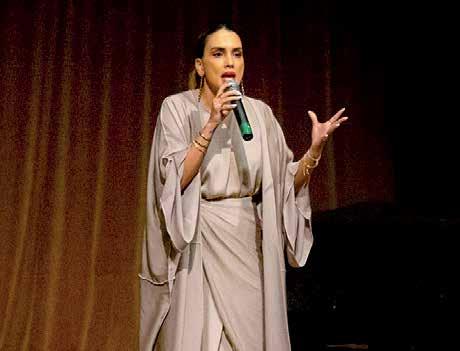
She described how a volunteering trip she took to Ghana when she was 15 years old inspired her to find her purpose, by empowering people to change their lives through education. That experience started her on her humanitarian journey, she said, and led to her eventually starting an initiative called Bringing Joy by Giving Joy on social media that rallied the local community to volunteer and to raise funds for people in need in Jordan. Through the initiative, the community came together to raise funds for a wide range of cases where they could make a difference, such as funding scholarships for cancer patients, building houses, and paying for surgeries, to name a few.
Matalka said that the initiative led to her meeting His Majesty King Abdullah II, who praised the use of her platform to engage people in volunteerism and empower people with education, and who suggested she create a foundation to expand on that humanitarian work.
“I had a full-time job as a data analyst and was doing this initiative on the side,” said Matalka. “I was thinking: how will I manage if I create a foundation? But His Majesty told me to believe in my purpose.”
That purpose, she explained, is to empower people through education. “I work on training and education initiatives in order to empower people, because it is sustainable and has long term effects.”
By sharing online the work she does, Matalka hopes to demonstrate to others that a small amount of effort can make a big impact, and encourage more people to participate in volunteering initiatives.
Social media can have its pros and cons, she added, but it is a powerful tool when it is used for good. “We have helped and empowered so many
people just through a social media platform,” Matalka said, noting she has grown her platform on Instagram from 2,000 followers when she started out to over 600,000. “To date, over 20,000 students have gotten into college and received scholarships. Those students graduate and give back in their own way.”
Matalka encouraged King’s students to believe in themselves, not to be afraid to try new things, and to step outside of their comfort zones. “Keep exploring, keep experiencing, keep trying; you have to be outside your comfort zone to understand yourself better — you have no idea how much it will change you,” she said. “Keep engaging in new technologies, keep networking, and don’t let anyone tell you that you can’t do something.”
King’s Academy alumna Farrah Matalka ’11 was invited back to school in March as one of a series of guest speakers lined up in recognition of International Women’s Day, to share with students how she found her life’s purpose.
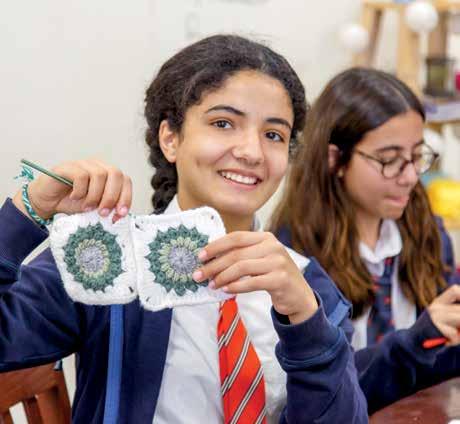 BY GEORGE MORGANIS
BY GEORGE MORGANIS
Since the Middle School opened its doors in 2016, Workshop has come to define this special part of King’s Academy. Workshop offers fresh opportunities for students to learn more, connect more and bond with each other, according to Dean of the Middle School Zina Nasser. These opportunities vary, from learning how to invest in the stock market, a workshop affectionately known as “Bulls and Bears,” to crochet, digital music-making, debate, and graffiti and street art.
In crochet, students have been learning the fundamentals before moving on to more complex stitches. “After mastering the basics, students have the chance to delve into their creative side and crochet whatever their minds can think of,” says faculty member Tala Adawiya. Adawiya, who learned how to crochet during the pandemic, sees her workshop as a chance for students to develop a growth mindset. “I became an avid crocheter as an adult, so I always try to inspire my students and remind them that failure is a part of picking up new skills and mastering those skills.” From plushie hedgehogs to cat-shaped bookmarks, students have found the workshop to be a great stress-reliever and source of pride. “I enjoy crocheting a lot because you get a feeling of satisfaction when you complete a project or a basic step,” says Maysoon Gaddh ’28.
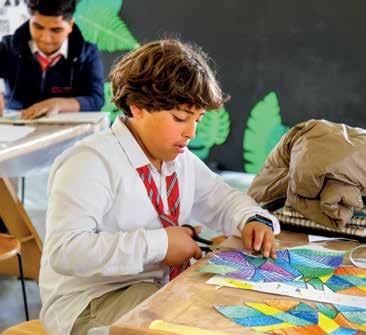
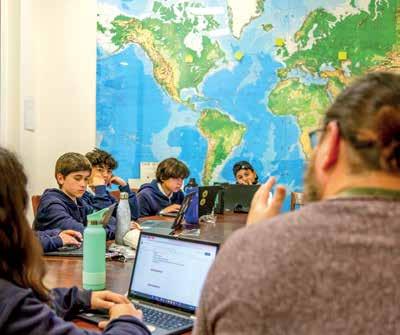
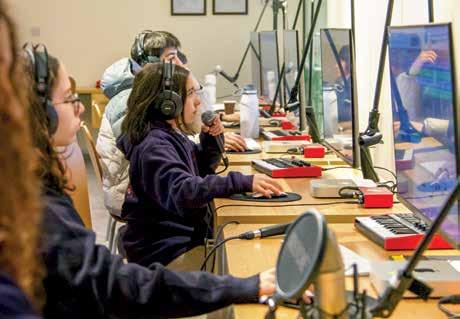
Another creative workshop that students have embraced is digital music-making. Using a purposebuilt digital music studio, students have been transforming songs into remixes, creating their own beats, and publishing their work. “There are many things that I love and enjoy about the digital music-making workshop,” says Leda O’Rourke ’27. “We are learning how to make song beats, the various components of songs, the instruments and skills used, and how to add our own personal style. One amazing thing about the workshop is how creative we can be, and how we can put ourselves into the music.”
The arts also feature prominently in Workshop. In the graffiti and street art workshop, students begin by learning about different types of street art, such as stickers, posters, murals and graffiti, and conclude by spray painting two murals. “This has been a great opportunity and I find it very inspiring to learn about other street artists and techniques,” says Amber Playle ’27.
Tying each of these workshops together is an embrace of a teaching and learning methodology that has come to define the Middle School at King’s, one centered around developing a growth mindset, stepping outside of their comfort zone, and connecting with each other. “Workshops truly represent what the Middle School is all about: letting your creativity and curiosity shine through,” concludes Maysoon Gaddh ’28.
Students have also been challenging themselves in the skills of analysis, synthesis and listening through debate, another new offering this year. “In our modern world, we are so used to just having our own say from behind a screen that we forget to listen,” says faculty member Pieter Jonker. “Suddenly an open debate becomes an educational space where young minds challenge other young minds and conversations develop that are no longer just about proving a point, but also about gaining new perspectives.” Though students are encouraged to gently disagree in this workshop, in this instance, students wholeheartedly agree with Jonker. “The aspect of debate I have enjoyed the most is deeply thinking… these skills are also the same skills that will help me in my future, opening up a whole new range of things I can do for a living when I grow up,” says Hanna Issa ’27.
BeyondKing’s caught up with former CRLA-English teacher Philip M. Carr-Harris to learn more about his recently published children’s book, IRememberMyEighthBirthday , and life since leaving King’s.
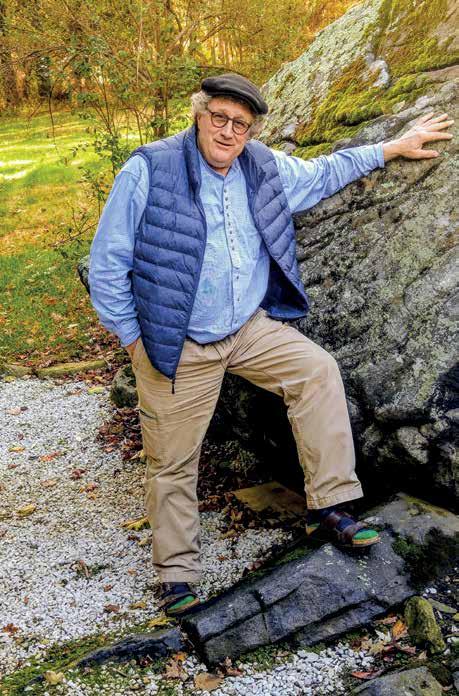
Where are you now?
I live in the southern Berkshire Mountains in Northwest Connecticut. I ended up here because the late MacGregor Robinson, former dean of admissions at King’s, grew up here and he was sure it would be a good place for me to retire. He was right. It is affordable, within two hours of each of my four children (and seven grandchildren) and is surrounded by natural beauty.
What have you been doing since leaving King’s?
I reconnected with Meg, a longtime girlfriend, and we have been together here for the past four years. We both entertain our children and many others — including several King’s alumni who sometimes help me at the woodpile (thank you Khalid, Omar and Ruiqi). We enjoy being able to share meals and conversation with our guests. That last sentence was an invitation to others who might like to visit — please come, you are welcome!
I rehabbed a small barn into a ‘mancave’ and so have a place to study, write and tutor. There are so many books that I haven’t read. Time is short. Presently I’m working on some essays on the intersection of literature and religion. It’s a hobby. I enjoy the work and have had a few things published.
This is the second children’s book I have written. The first was for my (then) younger nephew and niece. I took pictures of old French puppets and marionettes that I found in a museum in France, woke them up, and had them speak to Elliot and Livia. I printed the pages myself. They still read it!
Recently, I published “Diary of a Midwife: The Last Week of English Class. Reflections on Teaching and Learning”. It comes from my experiences at King’s and is based on the fictional idea of students choosing and conducting the last week of their English classes based on five themes of the year that they found to be worth remembering. It is written in a Socratic discussion style and is based on the texts I used for 12th grade English at King’s. It is not meant as a record of what happened as much as a way of summarizing key ideas that were discussed, how they were discussed, and how classic English Literature (British and American) comes up against Arab (and Asian) culture as this presents in 17- and 18-year-olds. I so much enjoyed my time with these students that I suppose writing the book was simply an act of devotion.
Since my seven grandchildren are all under age six, I wanted to write something for them that was more than a young child’s picture book, a story that they might appreciate as they got a little older.
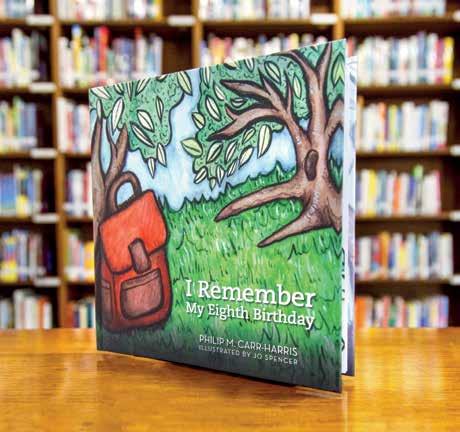
What are the particular challenges of writing a children’s book?
The challenge of any story is to get the reader out of their present time and place and into another setting. Good writing picks you up and seats you on a moving something or other and off you go, and you don’t really know it until you do but by then you’re somewhere else. So, it’s about how to sustain this movement. Writers do this with words.
The challenge for young children’s literature is to get the words and images to dance. Not sure how well I did this. One of the risks I took with ‘Eighth
Birthday’ was not to have a name or a picture of the child-narrator. As the reader follows this child on an eighth birthday adventure, there is no indication if the voice is of a young girl or boy. I wanted to do this because I thought more young people could find themselves in it. Once there’s a Marguerite or a Sami, the story changes.
I still call three of my former King’s students, Hamlet, Huck, and Marlowe, because each one said that they were these characters when we studied them.
How do you get into the mind of a child to write something that will spark their imagination?
I have been surrounded by children my whole life. I am always interested in how they see and describe and interpret their world(s). You know that phrase, ‘seeing (or hearing) something again for the first time?’, that is the child’s perspective. No filters needed. So, I try to imagine the sort of innocence that creates awe and mystery and ponder and curiosity and uncertainty… aspects of the way a child negotiates the world. Doesn’t that child have a home in all of us? Have you listened to a young child lately?
Where did you get the idea to write about an eighth birthday?
Age eight is a magic age. Oh, it could be seven or even nine, but at eight years, most young people are losing their wings (angelic innocence). It is a moment to recognize and celebrate as it is the beginning of transformative maturity. Maturity doesn’t only mean the testing of boundaries, what is understood in some negative worldviews as the start of human sinfulness, no, more positively, it is a time when the world gets bigger. From eight years old, we begin to see complexity in the world. Our senses develop, we begin to question, to wonder, to think for ourselves, to begin our trek.
Your protagonist goes on an “odyssey” — why did you choose that storyline?
Yes, and the subtle references to the places and persons of Odysseus’s journey from Troy to Ithaca, reinforce this. Again, at eight years old, we begin to explore the unknown world around us — on our own — and one of the discoveries is that things can also be symbols. Another is the realization that we have a history and a future, and we are in transit!
King’s Academy alumni and faculty members reflect on the origins, growth, values and future of the Jordan Model Parliament (JMP), one of the school’s — and the kingdom’s — most unique forums.
BY MOHAMMAD ABU HAWWASH ’15At face value, the Jordan Model Parliament (JMP) might seem like just another rendition of the Model United Nations (MUN) style of conferences. But a deeper look yields some surprising and inspiring revelations as this conference is setting an ideal version of what political life in Jordan should look like.
A noble royal vision, an empowered group of teachers, and an enthusiastic collective of students came together in 2013 in the first rendition of JMP. At the time, JMP was an experimental forum on the sidelines of a King’s Academy Model United Nations conference. Head of the Department of World Languages Shaden Al-Salman, who was involved in the creation of JMP,
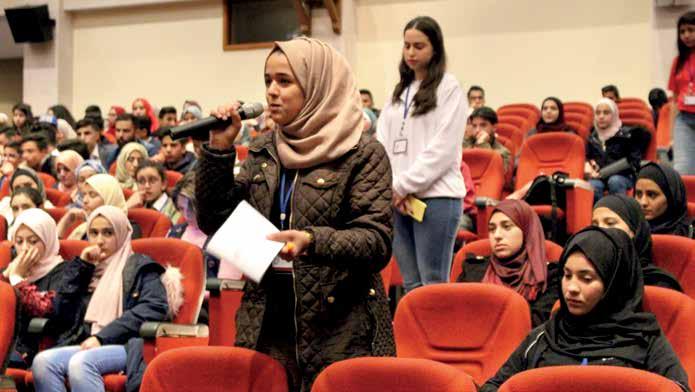
noted that this initiative came about following a meeting between His Majesty King Abdullah II and former King’s Academy Head of School John Austin.
During the meeting, King Abdullah outlined his vision of a democratic Jordanian society where informed public discourse is the norm. To realize that vision, more opportunities had to
be made available to young Jordanians who want to learn how to analyze policy, organize politically, and practice the art of oration. Ultimately, the goal is to “provide an opportunity for students to exercise problem solving, critical thinking, and to formulate and present solutions,” says Dr. Al-Salman.
The participants of the first forum “saw an opportunity and they took it,” says Abdulrahman Jamjoom ’15, who was one of the organizers. Indeed, in 2015, that forum transformed into an annual nationwide conference. Within a decade, thousands of young people had participated in JMP.
The success of the 2013 experimental forum motivated the King’s Academy administration to provide the resources needed for a JMP conference that would be independent from the school’s MUN program. Around 100 participants from 15 schools met in 2015 — the first official stand-alone conference. The second conference, which took place in 2016, tripled in size, bringing together 300 students from 20 schools around the country. That year also marked the first JMP Middle School conference.
With more public and private schools joining the program, the 2017 conference ballooned in size, attracting 500 students from 80 schools, under the leadership of Amr Almghawish ’17.
The largest JMP conference, however, was in 2018. Under the helm of Ramsey Abdelrahim ’18, the conference was divided into two sessions, in the fall and spring, with over 800 students participating.
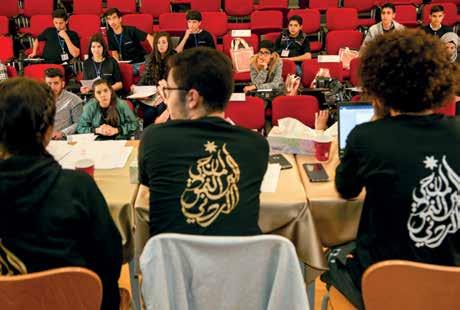
Working with such a large number of people from multiple schools required organizers to train their “soft skills,” says Abdelrahim. “You need to be diplomatic, you need to be friendly, you need to be honest. You learn a lot about your work ethic when working on JMP.”
“The biggest challenge was how to scale the number of students but maintain the quality of the conference,” says Abdelrahim.
Key to this success is the extensive training provided to all participants, who are required to attend three training sessions where they learn
parliamentary procedure, practice public speaking, analyze policy problems, and discuss ways of respectfully disagreeing with others.
Within a decade, over 2,500 students from across Jordan and beyond have participated in the annual event, significantly elevating their critical thinking, oratory, and analytical skills.
JMP is notable for breaking socioeconomic barriers, bringing together students from public and private schools, as well as schools operated by UNRWA and the Jordanian Armed Forces. It also incorporates international students as delegates, organizers and photographers. In fact, students from the United States, South Korea, China, Saudi Arabia, and elsewhere have played a role in JMP’s success. Among those international students is Jamjoom, who took part in the conference from the onset in 2013. Jamjoom, who also organized MUN conferences while he was at King’s, emphasized the importance of debate in the Arabic language. There was no MUN-style conference in Jordan that was held in Arabic back then, and JMP filled that gap. “It was a proud moment to see that,” he says.
JMP demonstrates what political life in Jordan can be: vibrant, professional and inclusive. Any person who attends the conference will be pleasantly surprised by the quality of debate and
the wise conclusions that these young debaters and (hopefully) future parliamentarians come to.
When reflecting on what JMP means for her, Dr. Al-Salman explains that it is “a vision of the future of the youth’s role in parliaments, especially Jordan’s. I wish that our Jordanian parliament were as active as JMP.” Former King’s faculty member Fatina Al-Ahmad, who was also involved in organizing the first experimental forum, attributed the success to the organic development of the conference. “I think this gave it much more strength because it felt like something that was not dictated,” says Al-Ahmad.
As JMP grows from strength to strength, its impact will be more powerfully felt in Jordanian society. If it continues to expand at its current rate, the conference will grow beyond the confines of King’s Academy where it has been successfully incubated for a decade. The challenge will be how to maintain the standards and values that make it special, even as it enters new spaces.
Currently, the Jordanian Ministry of Education supports the conference by liaising with schools that wish to participate in JMP. Other ministries, such as the Ministry of Parliamentary Affairs, can also play a key role in developing JMP further by establishing a direct link between it and the real Jordanian parliament. For example,
the ministry could present the policy solutions from each conference to Jordanian lawmakers. Another way to develop the program further is by creating an internship or training program at the parliament and senate for JMP participants.
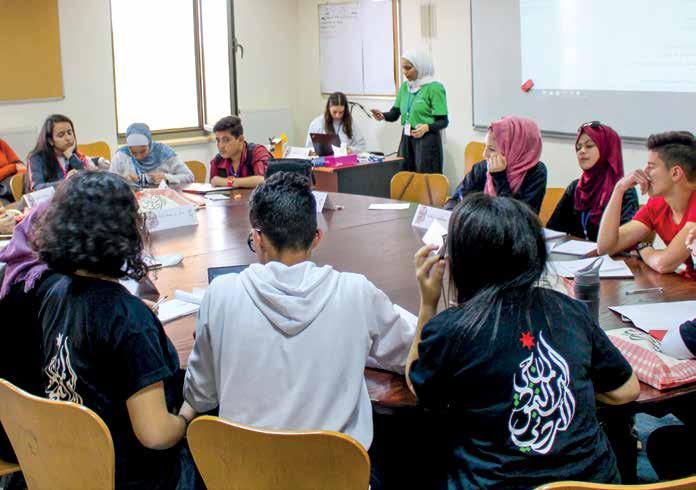
It is an unfortunate fact that the Jordanian parliament has a very low approval rating among the Jordanian public, with recent data from the Arab Barometer suggesting that less than a fifth of Jordanians trust their parliament as an institution. Reflecting on this fact, Al-Ahmad notes that “if you turn on the television and watch the real Jordanian parliament, it is still the same shouting — what I am hoping is that this young generation that has now learned how to talk to each other, to listen, to look at a different point of view, can actually slowly become part of the (parliamentary) leadership.”
To realize His Majesty’s vision and the shared national dream of a democratic Jordanian society where civil discourse is the norm, JMP must continue to fulfill its mission and train the next generation in leadership,
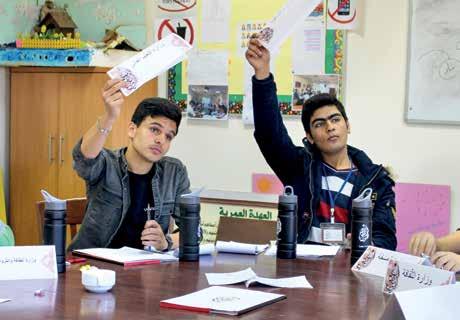
management, creativity and sensitivity when tackling complex problems. For that to happen, administrators must allow students to continue to take the lead, create a collaborative environment for student organizers and teachers and provide the needed resources to empower them to maintain the conference’s standards and values.
Mohammad Abu Hawash ’15 participated in the first Jordan Model Parliament. He studied international politics at Georgetown UniversityQatar, and has a Master's degree in public administration from Central European University. He is a research and communications officer at the Jordanian Embassy in Washington, DC.
Imoved to Jordan in August 2021 to teach theater at King’s Academy. Prior to that I had spent most of my life in Mumbai, India living with my grandparents, parents and brother. Home to me has always been defined by family and familiarity — three generations living together in one apartment, waking up to a busy kitchen filled with the aroma of morning tea, animated conversations at family meals, and chatter around the television in the evenings.
Beyond home my sense of familiarity came from my city, Mumbai. Defined by vastness, Mumbai is a huge, crowded, noisy, hectic, passionate and stimulating city, one that is full of history and contrasts. It is cradled by the sea with her ever changing moods. It has a constant lingering smell of salt in the air, dramatic highways and serpentine streets, color and chaos and spice and dreams. And in it, one is never alone.
I chose to move to Jordan but the move turned out to be a shock to my being: Not being able to escape to the water every time I was sad or angry or just needed a walk on the beach. Conversations in Arabic I just could not make sense of. The mana’eesh, the makdoos and the mujjadara. Everything was unfamiliar.
Festivals were the hardest. In India we celebrate several major festivals from July through November. I would see Instagram photos of my family and
friends and I would be filled with deep joy. But I didn’t know how to share it with people who were so unfamiliar with the very reason for my joy.
By the time Diwali came around in October, I had two choices. To succumb to my struggle and discomfort and loneliness and spend the festival quietly without any celebration, or to create a sense of celebration in my new surroundings. I gathered all the strength and spirit I had inside of me and reminded myself that Diwali was about the victory of light over darkness. I said to myself “before homesickness attacks me, I will attack homesickness.”
I cleaned my little apartment in faculty housing, bought marigolds, put out lamps and made colored rangoli patterns on my doorstep. I dressed up to work every day donning my silk kurtas, saris and shiny jewelry to class.
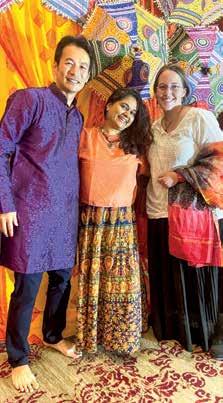
It was a disaster. Everyone around me was rushing about to give an assessment or grade an assessment. I missed the physical celebration of getting together and creating color and light. But more than anything I missed the spiritual energy — the pause from daily stresses to focus on light, hope, strength and family.
But in that moment of feeling alone, I did something. I sent out a mass email to the entire faculty inviting them to join me for dinner at an Indian restaurant to celebrate Diwali. I thought at least two to three people would show up and I would have my little Diwali party.
That evening some 20 members of the King’s Academy faculty dined with me in Amman. From my neighbors who saw me every day to colleagues with whom I had barely had a single conversation all semester. From teachers in my department to spouses of teachers. From those who loved Indian food to those who were slowly and carefully trying it for the first time. The evening was glorious. There was chatter and laughter and stories and smiles and a shared festive energy full of joy and celebration as we gathered around a large communal table and broke bread… and kebabs and tikka and naan and lassi and gulaab jamun.
And in that moment, I realized I had been looking for the wrong thing all along. I didn’t need familiarity to make this place home. I just needed connection — genuine human connection. I think once that paradigm shift happened inside me, I became a better person. I started to listen more. I approached my surroundings with curiosity instead of expectation. I met some of my colleagues’ families. I started learning Arabic and was excited to discover so many shared words and to make meaningful connections between what I speak back home and the language of my new home. I knew that it was important to share even if people had no clue what I was talking about. And that’s the beauty of making connections — once they start, they just grow.
When theater teacher Meghna Gandhi first moved to Jordan, she was overcome with homesickness, until she landed on the secret to making it feel like home.
GANDHIMeghna Gandhi with faculty members Frances Jones and Ryuji Yamaguchi at a Navratri celebration in Amman.
Since leaving King’s Academy, two of the school’s most creative faculty members have embarked on a bold new path that aims to bridge the gap between art education and communities where art is often overlooked, and to empower women and girls in underprivileged communities through the medium of art education.
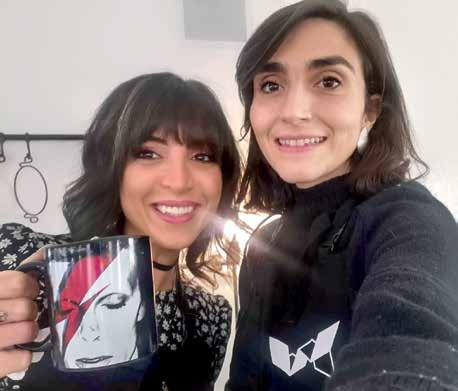
During her seven years at King’s Academy, Laila Demashqieh taught visual art in the Upper School and was the much-loved class dean for Grades 7 and 8. Rand Abdul Nour headed the Department of Fine and Performing Arts (since then renamed the Department of Art, Design and Technology) during her five years at King’s, in addition to teaching AP Art and other visual art courses. In 2019, they launched their grassroots art initiative Alolbah (meaning “the box” in Arabic). Beyond King’s caught up with Demashqieh and Abdul Nour to learn more about Alolbah and the work they are doing.
Laila and Rand, tell us more about Alolbah.
Alolbah is an initiative focused on empowering underprivileged communities, with a particular focus on women and girls, through the medium of art education. Our approach involves providing a simple and intuitive art kit, which is accompanied by a series of workshops aimed at breaking down
barriers to creative self-expression. Our kit includes a variety of tools to produce fine art pieces, along with an illustrated manual that guides, inspires and teaches participants the techniques and principles of art.
What inspired you to found Alolbah?
We had a discussion about the education system in Jordan and the lack of emphasis on art education. Despite research showing the positive effects of art on cognitive skills, problem solving and creativity, it is not being given
proper attention. This is particularly true for public schools, where art education is all but nonexistent.
We began brainstorming various solutions, which led to the creation of Alolbah. Through this project, our hope is to normalize art and to have it become an integral part of communal development, thereby indirectly supporting national efforts to modernize and redefine approaches to education. By incorporating art education, we hope to promote a more holistic and well-rounded approach to education in Jordan.
Two former King’s Academy faculty members have launched an art initiative that aims to bring art back to the people.
Why is there such a lack of art education within the national educational system?
Primarily, it is due to the lack of priority given to it. Jordanian artist and art historian HRH Princess Wijdan Ali has been a strong advocate for art to be a part of the curriculum, but its inclusion has been intermittent.
We are committed to changing this situation and have plans for various initiatives. Our immediate focus, however, is on reaching out to more women, who can then spread their knowledge of art to others. We aim to make art accessible to everyone, particularly women, girls and children.
Why is it important to target women and girls specifically?
Women and girls play a leading role in the family unit in suburban and rural communities. By empowering women with a tool like Alolbah, they could become intermediaries in the education process, passing along knowledge gained in workshops to their children and other mothers in their communities, thus creating a healthier and more creative society. Alolbah is designed to be adaptable for beginners of virtually any age, giving mothers an opportunity to find their own artistic voice and to steer their children’s energies towards creation and problem solving.
How many people have you reached with Alolbah so far?
Since our launch, over 500 women in communities across Jordan have attended our workshops. Their experience with Alolbah has been overwhelmingly positive. Participants tell us that it has helped them tap into their creativity and develop new skills. One woman told us that it helped her find her voice and gave her courage to express herself authentically. We are seeing firsthand the power of art to facilitate social cohesion and agency.
What does an Alolbah experience look like?
Alolbah provides workshops that are designed to teach individuals how to utilize the Alolbah box and train others

on the art education curriculum. The initiative's primary focus is to empower and equip women with the necessary tools to become ambassadors of art education in their communities.
How do participants go on to become “ambassadors for art education”?
Through our program, attendees are encouraged to share their knowledge and experience with others in their communities, whether it be with family members, friends, or through developing their own creative projects and initiatives. We believe that by empowering our participants with the tools and confidence to become advocates of the arts, we can create a ripple effect of knowledge and creativity that extends beyond our workshops and into the broader community.
What are some of the challenges you have faced?
One of the main challenges has been funding Alolbah. We receive support from individuals who purchase the art kits, and we have received two grants from Fulbright that have helped us develop and reach more communities.
In addition to Alolbah, we hear that you have been involved in other interesting projects. Tell us more!
Laila: I remain active in the art world, teaching, and developing my own artwork. I have participated in several group exhibitions and created various commissioned pieces.
Rand: I have also been designing and decorating sets for film and TV. I have worked on local, regional and international projects, including productions for Netflix, Legendary, CBS, Lionsgate and Marvel!
You worked together for years at King’s Academy. What impact did that have on the work you are doing now?
Rand: My work at King's fueled and inspired my work now. I was exposed to the most influential teaching methods and strategies, paired with generous resources, and collaborations with the best teaching minds. It is an unfortunate truth that only a few private schools in Jordan offer significant art education, and I felt that it was my duty as an educator and artist to make sure that more people are exposed to the benefits of art creation. At King's, Laila and I bonded over art and shared the same enthusiasm towards social change, which led to us co-founding Alolbah.
Laila: At King's, I was fortunate to develop valuable connections and collaborations with individuals like Rand. King's also has an excellent professional development program that helps teachers expand their knowledge and develop innovative teaching skills.
Where can we learn more about Alolbah?
You can visit us on Instagram @alolbah.art.
As Salwa Manaja moves with her family to New Zealand, where her maternal family is from, the King’s Academy community bids her farewell — or as they say in Mãori “kia ora” (hello, goodbye and thank you).
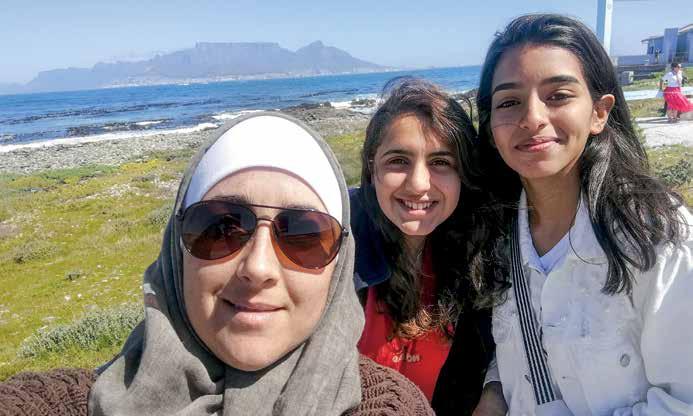 BY MUNA AL-ALUL
BY MUNA AL-ALUL
With 16 years at King’s Academy under her belt, head of the Round Square Office and director of the Summer Enrichment Program (SEP) Salwa Manaja is part of the school’s fabric. A founding member of the school, she was there to welcome the first cohort of SEP students before the school officially opened its doors. Manaja, her husband Baraa Salah — a fellow longtime King’s
employee — and their three children depart both King’s and Jordan in search of new adventures in New Zealand, which is from where Manaja’s mother — and author of Married to a Bedouin — Marguerite van Geldermalsen hails.
Just before they left Jordan, Beyond King’s spoke to Manaja about her plans for the future, her memories of the early days at King’s, and her work developing SEP and Round Square into pillars of the school.
looking back to 2006, how did you wind up at King’s?
I had just moved back to Jordan from Australia, and I was about to start looking for a job when I was offered to join the Summer Enrichment Program (SEP) as a counselor. It was the very beginning, before the school had even opened. When SEP ended, Dr. Meera Viswanathan offered me a founding fellow position, along with eight other founding fellows, all of whom were from the United States.
What were the early days like?
We had a lot of meetings, planning everything from the uniform to what dorm life would look like, expectations, guidelines, schedules, requirements. Most of the time I was just a listener/ observer because I did not have that [international private school] experience, but what I offered was the Jordanian perspective and input from my government school education and University of Jordan education. I could tell them, for example, what happens during Ramadan, this is what they eat, this is what schools in Jordan are like.
The campus has grown a lot, in number of people, buildings…and trees! The trees had just been planted and it was kind of arid, we didn’t have grass in 2006. It was a very small close-knit community, I could name everyone who worked at the school then.
What early experiences stand out in your memory??
I remember doing a lot of home visits for the SEP students who came. We visited students all the way down in Mu’tah in Karak, all the way up in Bani Kinana in Irbid, as well as in Amman. I remember visiting Hamzeh Al-Qudah ’10’s family at his home, as well as Mohammad Sarhan ’12. We don’t do those home visits anymore.
SEP means a lot to you, doesn't it ?
SEP is a huge part of why I am at King’s, and why I’ve been so passionate about bringing students from all around Jordan, especially those from less advantaged backgrounds, to King’s, providing them with this opportunity, even if it’s just for the two-week summer camp and they don’t join King’s afterward. To me, SEP is helping to sow a seed in them. Sometimes we see the fruits of that, and sometimes we don’t, but I like to believe it is there in all of them and has come to fruition in many of the students.
What was it like raising your family at King’s?
King’s is their home. We were living on campus when my eldest son Jawad was
born. He went to the daycare at King’s. Then he’d go to school in Madaba and come back and spend afternoons and weekends on campus, and we’d come for events like Thanksgiving. So, for them, King’s is a second home. And this year Jawad was at the Middle School at King’s. Maybe he’ll come back one day as a teacher!
How has King’s changed over the years?
The school doesn’t feel new anymore — and I feel really old! Because of the culture and the traditions that have already been built, nowadays we are tweaking and fine-tuning things. Yes, we are still coming up with new solutions and systems, but now if something is new you’d really notice. Back then, everything was new, we didn’t have a culture back then, it was up to us, and mainly the students, who drove that culture with their passion for things. Things they were passionate about kept on going. The pride for King’s is something I see in our students now. We didn’t have that the first couple of years because we were just starting out.
As your career at King’s has progressed over the years, what would you consider some of your biggest accomplishments.
In 2010 I started working with Tessa Fairbairn on Round Square. With Tessa’s leadership, passion, guidance and mentorship we were able to bring Round Square to King’s. We hosted a number of smaller conferences in 2010 and 2011 with people coming from different parts of the world such as South Africa, India, Bangladesh, Pakistan etc., and hosted the big international conference in 2014, in addition to running service projects.
Why is the Round Square program so essential for King’s students?
Round Square and community engagement are very important and we needed to make sure King’s students had the opportunity to participate, initiate, and be engaged in those endeavors. Not just “service” as we feel service is kind of a one-way thing. We wanted our students to understand
that when you are engaging with the community, you are getting something in return, something that you are learning about.
You’re learning compassion, you’re learning empathy. These are skills that are not necessarily taught in the classroom. So, it is important to provide these experiences for students.
Through your work you have helped build a huge number of connections with local and international organizations. Tell us about that.
Building connections is an essential part of our work. When I first joined, no one had heard of King’s Academy. So, it was difficult starting this relationship with many organizations that hadn’t heard of us yet, and that didn’t know how to involve students in their endeavors. Now we have a huge network of community partners with whom we work, from local and grassroots to international organizations, and for diverse causes from environment, cancer, and the rights of persons with disabilities, to refugees, orphans and the elderly. And we’re still building on that because you are never done.
What are you going to miss most about King’s?
What I appreciate and love about King’s is the support that we provide to each other. This shows most in times of difficulty, but also in times of happiness. Everyone reaches out to you when something happens in your life, the community comes together and supports you.
Also, the mission of King’s is unique to Jordan and the region, and part of that uniqueness is the diversity. Meeting people from different backgrounds, countries, experiences, this is what makes it so special and different. I am going to miss this in New Zealand because I will probably be the only Arab wherever I end up working. I’m thankful for the opportunity to have met all these people and have these experiences because it opens up horizons and creates connections.
The King’s Academy community was deeply saddened upon learning in December of the tragic and untimely loss of a beloved member of its family, Charlotte Billingsley ’20.
In 2018, Charlotte left Berkshire School in the United States to study at King’s Academy where she was enrolled in the school’s Arabic Year program. Charlotte was a much-loved student and friend who demonstrated a great deal of kindness and warmth for her fellow community members. She was passionate about learning new languages, exploring new places, and meeting new people.
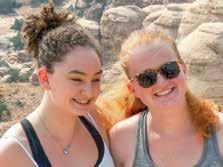
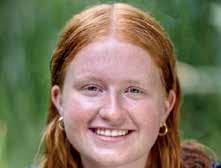
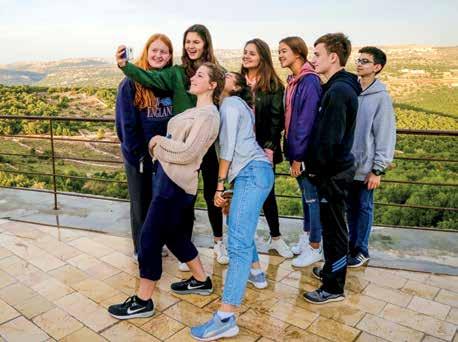
A talented and accomplished student, Charlotte had been pursuing a major in physics and a minor in Arabic at Bowdoin College. In the fall of 2022, she had returned to Jordan for a semester abroad to continue her Arabic studies. Helping others was deeply important to her, and she had spent time volunteering in Jordan, teaching English to Syrian refugee girls. She had also spent time with HM King Abdullah II, a family friend, and his family. King
Abdullah has described her as “a wonderful and thoughtful person who touched all of us.”
Charlotte’s loss is deeply felt, and she will be greatly missed.
Some of her friends and teachers share memories and words of farewell.
Lina Samawi, former Arabic Year Program Director
I vividly remember when I first met Charlotte in 2018. We had organized a reception for international students and their families in the Safwan M. Masri Courtyard, and Charlotte was one of my Arabic Year students that year. She was smiling graciously as she met the many new faces, and she told me a few minutes later how nervous yet excited she felt about living in Jordan. Not many days following that encounter, Charlotte immersed herself in the experience. She was a shining light in class, in the dorm, and on trips. Her kindness and sense of humor could not have been missed by anyone. Her passion for the Arabic language and culture was infectious; her eyes especially lit the moment she realized she understood a challenging grammatical rule!
Charlotte and I stayed in touch after she left King’s. She was excited to share with me that she was taking Arabic classes at Bowdoin. She knew I would be proud of her, knowing that she continued learning Arabic — and I was!
Charlotte's passing is a great loss, not only to her family and friends but also to the King’s community and to everyone who met her. Her bright spirit and love for learning will be deeply missed. I will always remember her as a brilliant student and a beautiful soul inside and out. I feel honored to have been a part of her journey and I will always treasure the memories I have of her in my class. Rest in peace, habibti Charlotte.
Hanae Yoshida ’20
Charlotte and I were in the Arabic Year program together, as well as in Dr. Ethan’s advisory group. She made such an impact on my King’s experience with her kindness, sweetness, hard work and resilience. She was always so open-minded and willing to try new things. I know how deeply she loved Jordan and learning Arabic. I miss her. I send all my comfort and support to her family in the wake of her sudden loss.
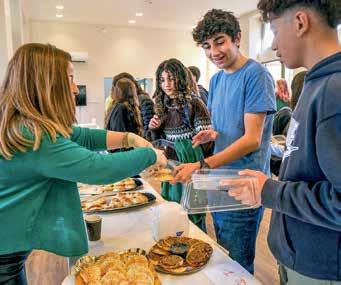
King’s Academy parents organized their annual Winter Holiday Bake Sale in December. The Parent Council’s events committee led organization of the event, and parents of all grade levels got into the giving spirit by baking, making and donating an array of goodies for the school community to feast on. The Parent Bake Sale raises funds for the school’s Student Life Fund (SLF), which ensures that students on financial aid have access to the same opportunities available to other students, guaranteeing an equal educational experience for all King’s students. The fund covers, among other things, the cost of sitting for external examinations like the SAT, university application fees and various extra-curricular activities. This year’s bake sale raised over 2,500 JD (US $3,524)!
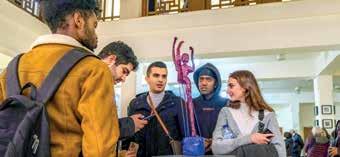
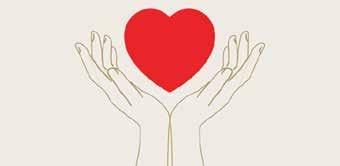
In November, the Advancement Office thanked employees for their generous philanthropy towards the school. Continuing what is an annual tradition at King’s, this year employees donated double the amount that was raised during last year’s Faculty and Staff Appeal. Additionally, the number of employees participating in the appeal this year impressively quadrupled. Contributions to the Faculty and Staff Appeal go to support scholarships at King’s.
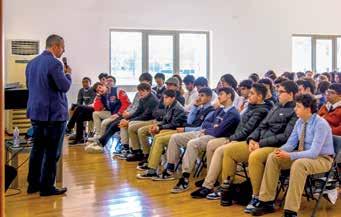
King’s Academy hosted its annual Career Day in February where Upper School students had the opportunity to hear from professionals representing a wide range of fields and industries, including medicine, psychology, engineering, architecture and interior design, finance, law, media and public policy, technology, hospitality, business and marketing, and film production. Coordinated by the University Counseling Office (UCO) and Advancement Office, participating professionals led question and answer sessions during panel discussions to give students an indepth look into the industries.
The Advancement Office organized a silent art auction in December to take place the week of the school musical, A Little Shop of Horrors. During the silent auction, 15 pieces of stunning art created by current students or alumni, ranging from paintings, photography and sculptures, were put up for auction, with proceeds going to support the fine and performing arts programs at King’s Academy.
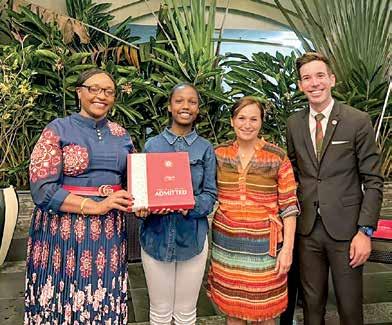
This year, King’s Academy welcomed five new students from Rwanda, the first of their nationality to enroll at the school. The students were selected during a visit to Kigali, Rwanda by the Office of Admissions and Financial Aid and the Advancement Office. During the visit, King’s representatives met with the Rwandan Minister of State Gaspard Twagirayezu and Minister of Education Valentine Uwamariya to discuss how education can be a pathway to cultural diplomacy and understanding. This visit followed a meeting last year between His Majesty King Abdullah II and Rwandan President Paul Kagame in Aqaba during which they discussed ways of enhancing cooperation and goodwill between the two countries.
In February, Yousef Taha ’23 and Salma Baniamer ’24 spoke live on Ro’ya Television’s Helwa Ya Donya program about Jordan Modern Parliament (JMP). King’s Academy hosted its annual JMP conference earlier that month under the theme “Today’s Voice, Tomorrow’s Echo.” Around 350 student parliamentarians, representing 20 public and private schools around the kingdom, participated in the conference, where they discussed and proposed solutions to some of the country’s most pressing issues.
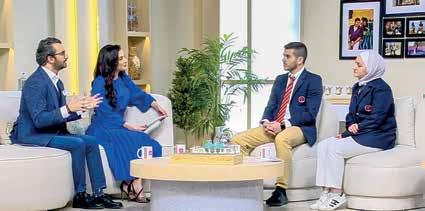
King’s Academy’s Arabic Year (AY) students embarked on an unforgettable trip to Egypt during spring break. The students immersed themselves in the rich culture and history of Egypt, where they took a three-day cruise of the Nile River and learned about the country’s ancient civilizations during visits to temples and tombs at impressive historical sites including Aswan and Luxor. They also visited museums and places of worship in old Cairo, learning more about the country’s recent past. The visit provided students with an opportunity to practice their Arabic language with locals during everyday interactions, enhancing their skills as well as cultural understanding of the Arab world.
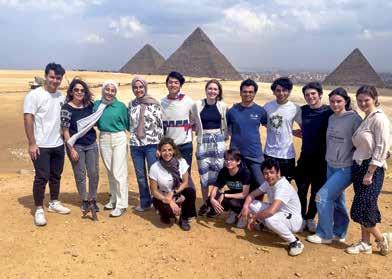
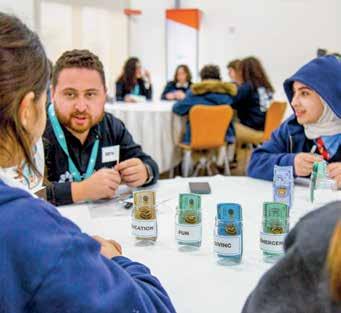
King’s Academy hosted a MONEYSMART financial literacy bootcamp, powered by Rise by Bank al Etihad and organized by Eventa, to coincide with Global Money Week, which is observed from March 20 to 26. Upper School students participated in engaging discussions with 10 experts from Bank al Etihad on 10 money topics: money tree, needs vs wants, budgeting, wealth, banking, credit card vs debit card, idea to business, financial goals, leveraging, and identity protection. “Our goal is to educate students at this age in order to empower them for the transition from dependent teenagers to independent young adults — before they head to university and have to manage their own money and budget,” said Dana Adawieh from MONEYSMART.
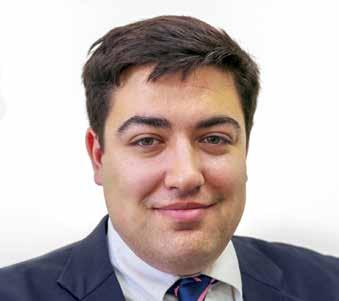
Faculty member George Morganis was awarded the Fowler Merle-Smith Scholarship to attend the summer 2023 session at the American School of Classical Studies at Athens, a sixweek program of study of Greece and its major monuments, and to deepen understanding of the country’s landscape, history, material culture, and literature from antiquity to the present. Morganis, who teaches humanities, was also the recipient of the Gulamerian Scholarship in 2022, which provided funding to attend the Classical Summer School at the American Academy in Rome. “I’ve long been interested in the ancient world and challenging our students to put themselves in the shoes (or sandals) of ancient peoples,” said Morganis
King’s Academy CrossFit launched its first fitness competition in February, sponsored by Vy Health Club, with the goal of testing students’ physical and mental stamina, endurance and strength in a fun environment. Nine teams participated in the competition, organized by students in the school’s CrossFit co-curricular and Noor Dajani who is a CrossFit L3 Certified Trainer in addition to co-curricular coordinator and employee wellness program manager at King’s. Each team was made up of one female and one male participant who worked in pairs to complete a series of workouts. The top three teams were awarded prizes from Vy Health Club, and KABS Fit Factory helped fuel the competitors with a supply of Pandy Protein Bars.
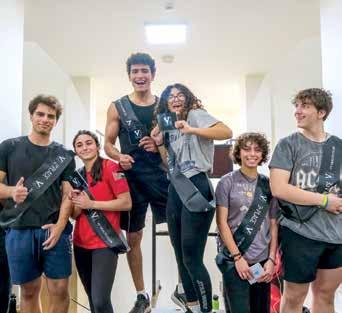
This year, to mark the school’s 15th anniversary, King’s Academy organized a number of events in addition to a series of guest speakers who were invited to share their career and life experiences with students.
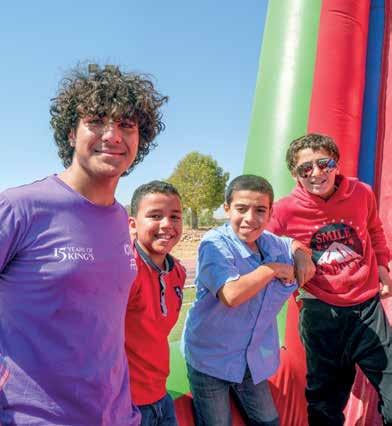
In September, King’s Academy hosted King’s Fest, its annual charity festival. King’s Fest was the first in a series of events marking the school’s 15th anniversary, and as a charity event, symbolizes the importance of service to the King’s community. Over 500 King’s community members, including students, employees, families and friends, showed up to make this year’s King’s Fest the biggest and best one yet. Organization of the event was led by Nadine Fanous ’23, Faris Hmaid ’23 and Tawfiq AlAlami ’23 with the support of more than 80 enthusiastic student volunteers. King’s Fest combines a day of fun and community with civic responsibility, with the ultimate aim of raising money to support the renovation of an underprivileged local school undertaken through the senior’s annual service project. This year, Al Qadisieh Boys School — the oldest school in Madaba — was the recipient of the renovation works, and this year’s King’s Fest also garnered the support of a generous supporter, Shehadeh Twal, who made a sizable contribution to the charity initiative in memory of his late father Shehadeh S. Twal, a native of Madaba.
In October, King’s Academy welcomed Dr. Ghassan AbuSittah, a British-Palestinian award-winning plastic and reconstructive surgeon and one of the world’s leading specialists in craniofacial surgery and trauma related injuries. Abu-Sittah shared with students his educational and professional journey that includes three fellowships in pediatric craniofacial surgery, cleft surgery and trauma reconstruction. Currently based in the United Kingdom, Abu-Sittah previously headed the Division of Plastic and Reconstructive Surgery at the American University of Beirut (AUB) Medical Center and co-founded and became director of the Conflict Medicine Program at AUB’s Global Health Institute. In addition, Abu-Sittah has volunteered as a war surgeon in conflict areas and has published extensively on war injuries.
His work in conflict areas led Abu-Sittah to the realization that experience — even decades of it — is not automatically converted to expertise, and that systems need to be put into place to help experts pass down their knowledge to others. Abu-Sittah described how he was
able to set up a program at the AUB to research the effects of war on health and to treat children with war injuries, using that research and the learning opportunities gained from treating patients to train a second generation of surgeons in those skills.
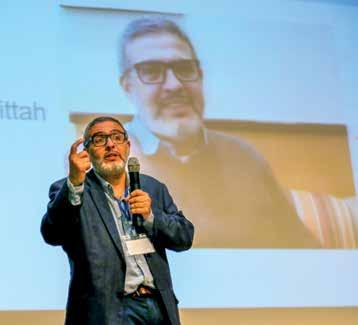
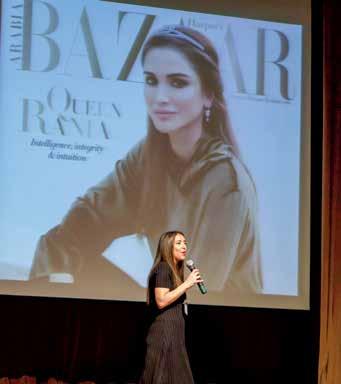
In December, King’s Academy welcomed Mohamad Haj Hassan, founding partner and board member of Akhtaboot and Jawaker. Haj Hassan shared with students the educational and professional journey that led him to starting up two successful online businesses, the recruitment site Akhtaboot, and card game app Jawaker. Speaking about what motivates and inspires him as an entrepreneur, Haj Hassan shared: “I always had an itch to create, to do something that I could lead myself. I wanted to build a creative space — coming up with solutions to problems has always been something that drives me.” The event, supported by Orange Jordan, also falls under the umbrella of a new initiative launched this year at King’s Academy by sTF5 Care — the Tawfiq Fakhouri Chair for Entrepreneurship, Innovation and Leadership. The initiative aims to enable King’s students to practice entrepreneurship and learn the technical and interpersonal skills needed to build startups from industry professionals.
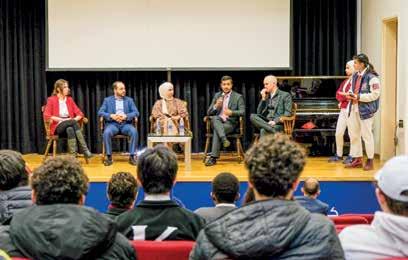
In February, King’s Academy hosted a panel discussion entitled “Empowering the Next Generation: Technology in High School Education” with four guest speakers who discussed how technology will impact the future of education. The panelists included Afnan Ali, founder of Eureka Tech Academy who was named Arab Entrepreneur of the Year; Ala’ AlSallal, founder and chairman of Jamalon and CEO of MadfooatCom; Farah Kasih ’11, investment manager at AHLI FINTECH and a King’s Academy alumna; and Osama Abdulhadi, engineer and current King’s Academy faculty member.
Throughout March, King’s Academy marked International Women’s Day, which falls on March 8, with a line-up of inspiring female speakers to share their stories with students. One such speaker was Dina Saoudi, co-founder of Seven Circles, an investments and consulting agency, and Seven's World, the philanthropic arm of Seven Circles. Saoudi is also the co-founder of Empowering through™, which she describes as “a new breed of social enterprise bringing together representation from all stakeholders — aid agencies, private and public sectors, academia, impact funds, and civil society to work together to support individuals with economic and social empowerment through a series of projects, programs, and initiatives.” Talking to students about Empowering through™, Saoudi shared how the success of the initiative’s first project, a book entitled Empowering Women through Cooking, led to its replication — and the creation of various parallel projects — in over 20 countries, helping to showcase the stories of thousands of women.
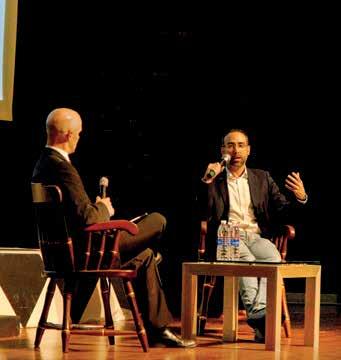
NAIRUZ AL AJLOUNI
Since graduating from King’s Academy, Nairuz has been pursuing his passion and leading a fascinating and eclectic career in the world of performing arts. The past couple of years have been particularly busy and productive for him. In 2021, Nairuz joined Amman’s performing arts school Stardust Academy as a creative director and teacher. Nairuz is also currently working on a conceptual sonic exhibition with the working title "Naseej - Sound of Fabric" which explores the sounds and the processing of fabric and which highlights the stories of laborers in marginalized communities. “I will always owe King's Academy my gratitude for nurturing my creative side, teaching me how to embrace what I am good at, and for providing me with the richest grounds every person of talent would ask for,” says Nairuz. “King’s will forever be my home — my alma mater.”
JERIS ABUHOURAN
Jeris is based in New Jersey and is currently a Doctor of Medicine (MD) candidate at St. George’s University School of Medicine.
HASHEM AL HADID
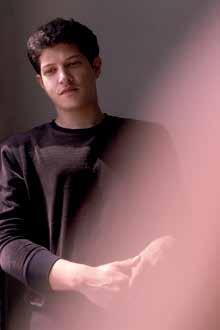
Hashem graduated from Utica College in New York in 2013. He has been based in Sweden since 2018, where he works as a group senior auditor at Volvo Group.
HAMZA ZAIDAN
Hamza is currently based in New York, working as a vice president at Morgan Stanley, the global investment banking company, where he has worked for the past four years.

TALA BARAKAT
Upon graduating from Bryant University with a business degree in 2015, Tala packed her things and moved to sunny South Florida and has been there ever since. She is now a business recruiter at Chief, a startup and private membership network focused on connecting and supporting women executive leaders. She is also working on starting a non-profit with her sister and fellow King's alumna Jude Barakat ’12, to give back to Arab communities.
HAMZEH QUDAH
It is officially Hamzeh’s third year back at King’s Academy. He teaches 9th grade history and 10th grade Islamic studies, and is a success and support mentor for King’s students who have come from a national curriculum background. He is enjoying his first year as house head of Mizan, and is still the best table tennis player around!
LAILA SALAMEH
Laila graduated from Oglethorpe University in 2015 with a Bachelor’s degree in business administration and economics. She spent a couple of years living and working in the United States before returning to Amman in 2017. Laila now works in human resources management.
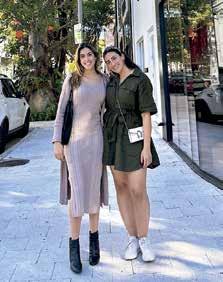
SEEMA SAMAWI PETERS
FAWAZ HOURANI
After graduating from Stanford University with a Bachelor’s degree in management science and engineering in 2014, Fawaz traded the West Coast for East. He has lived in New York for the last nine years, where he is now an investor in early-stage technologies.
FAISAL KAWAR
Faisal graduated from Yale University with a Bachelor’s degree in engineering in 2014, and is now back in Amman working as a nonexecutive director at Kawar Group, a leading investment and operational holding company.
GHAITH ODEH
Ghaith has been working at Bank ABC Jordan as a financial crime senior officer since 2021, and is enrolled in an online postgraduate diploma program on financial crime compliance. He has been based in Amman since graduating from Newcastle University with a political science degree in 2016.
Seema obtained her Master’s in systems engineering from George Washington University, and her Bachelor’s in computer science and music from Smith College. In 2021, Seema got married to Jeffery Peters in Vermont, and since then they have been enjoying traveling together, including to St. John and St. Thomas in the Virgin Islands where they explored the nature, wildlife and petroglyphs, and to Florida, where they went deep-sea fishing and visited a turtle sanctuary. Currently based in picturesque New Hampshire, this past winter Seema certified as an alpine senior ski patroller and ski patrol instructor, and she is currently in training to receive her senior medical certification.
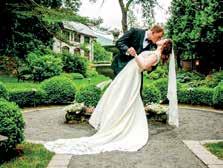
QXHNA TITCOMB
Qxhna is based in North Carolina, working as a business development manager at Amazon Web Services.
SALEH VALLANDER
Saleh graduated from Lund University in 2016 with a degree in medicine. He has recently published two new books on neuroscience and personality entitled The Neurobiology of the Enneagram and The Enneagram, The Myers-Briggs, and the Brain.
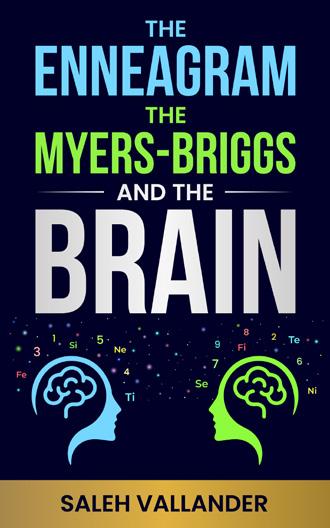
OSAMA SBEITAN
Based in Florida, Osama is pursuing a Master’s in business from Nova Southeastern University, with a focus on innovation. He is also building SGI Inc. in his role as CEO and founder.
JUMAN TABBALAT
Juman is based in Amman, where she is the head of social intelligence analytics for the MENA region at Ipsos, a multinational market research and consulting firm. She graduated from German Jordanian University in 2018 with a Bachelor’s degree in industrial engineering.
MUHANNAD ABBASI
After completing medical school at the Royal College of Surgeons, Muhannad attended Northwestern University for a research fellowship in the field of cardiac imaging and advanced heart failure. He completed his internal medicine residency at the University of Nebraska Medical Center. Last July, Muhannad began his training in cardiology at Mayo Clinic.
RANEEM ALDROUBI
Raneem graduated from the University of Surrey in 2017 with a Bachelor’s degree in law, and has since been living in the UK.
AWN AL-HADEED
SAMIA AWAD
Samia completed her Master’s degree in international management and marketing from the Royal Holloway University of London in 2019. She’s currently based in Amman and working as a social media community manager and digital advertiser at Bidaya Marcom.
DINA HINNAWI
Dina completed her Bachelor’s degree in economics from Concordia University in 2018.
ZAIN KOSSOUS
Zain completed her Master’s degree in sustainable architecture and landscape design at Politecnico di Milano in 2021. In 2022, she completed her first renovation project at the Mujib Biosphere Reserve Chalets at the Dead Sea, before traveling to ecovillages in Italy, France and Spain to learn about eco-construction, renewable energy, the five dimensions of sustainability, and music therapy. She is currently working as a media, communications and space manager at the Northern Lights, an eco-school farm establishment in France, where she has also started an Erasmus for Young Entrepreneurs program.
MAY ZGHYER
May expects to complete her Master’s degree in international relations from Liverpool John Moores University this year. She is also currently working as an associate project officer at the International Organization for Migration (IOM) in Washington, D.C.
KARIM AL-HADDADIN
Karim graduated In 2016 from the University of Bath with a Bachelor’s degree in civil engineering. He has lived and worked in London since graduating, and has recently started a new position as a consultant at Boston Consulting Group.
MAHEERA HUSSAIN
Maheera is currently pursuing a Master’s degree in global human resource management from the University of Portsmouth. She also works as the recruitment and talent development lead at Halsen Solutions.
Awn graduated from the University of London with a Master of Laws in commercial and corporate law followed by a Master’s in security studies from University College London. Following his university years, Awn began the process of qualifying as a lawyer in Jordan. He passed the Jordanian Bar in 2021 fully expecting to continue a career in law. However, he was offered the opportunity to work in the Office of His Majesty King Abdullah II at the Royal Hashemite Court. Two years later, he is still honored to be in this position, serving his country and finding ways to improve the lives of his fellow Jordanians.
EMRAN LALLOW
Emran has been pursuing a Doctorate in mechanical engineering at Rutgers University since 2017. He is all set to graduate this year!
FARIS NAFFA
Faris graduated from Brigham Young University with a Master’s degree in accounting in 2018. After working at Deloitte for a few years, he is now a director at FTI Consulting in Washington, D.C.
TAMARA NASSAR
Tamara is based in Jordan, where she works as an associate editor at The Electronic Intifada, an independent online news publication focusing on Palestine and related issues.
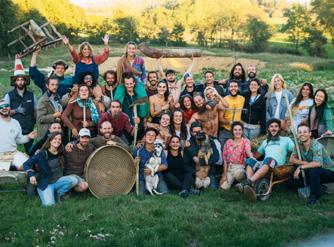
BRANDON NAVON
Brandon graduated from George Washington University in 2019 with a Bachelor’s degree in international business. He currently works at Capital Bank of Maryland.
SAIF SAMAWI
Saif is based in London where he works as a transformation consultant at Accenture. He graduated from the University of Surrey in 2021 with a Master’s degree in innovation management.
MOHAMMAD ABUAISHEH
Mohammad completed his Master’s degree in mechanical engineering at the University of South Florida in 2021. Despite being accepted to pursue his Ph.D. in nanotechnology, he
decided to gain some industry experience first. He is currently working as a senior product validation engineer at Cummins Inc. in Indiana.
JALIL KHOURY
Jalil graduated from Northwestern University with a degree in Economics in 2019. After three years in Chicago, Jalil can now be found in New York City where he currently works as a senior associate at JPMorgan Chase & Co. If you bump into Jalil on the streets of NYC, feel free to challenge him to a game of basketball or chess, he will agree to both!
supporting neurodivergent students and children with disabilities. She is also training to become a child psychotherapist.
TALA HALASAH
Tala is currently based in London and works at Deloitte as an assistant manager.
KARIM ITANI
Karim graduated from Dartmouth College in 2020 with a Bachelor’s degree in computer engineering. He is now based in New York City and works as a software engineer. Karim attended the alumni reunion in New York last July!

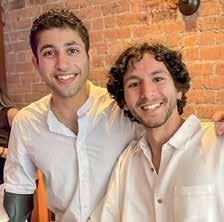
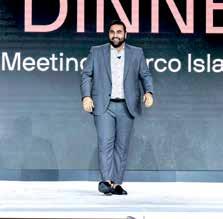
YOUSSEF AL-MUGHRABI
Yousef graduated from Emlyon Business School in France with a Master’s degree in data science in 2022. He is currently based in Paris, working as a data analyst at Contentsquare.
AHMED AL-NABHANI
After graduating from Western Michigan University in 2022 with a Bachelor’s degree in finance, Ahmed moved to Florida where he is working at Fidelity Investments as a customer relationship advocate.
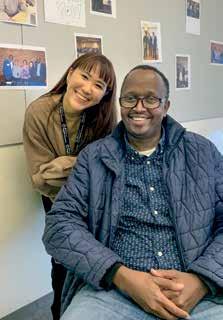
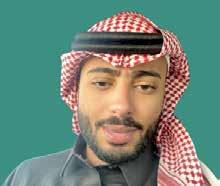
RANIA HAMOUDEH
Rania completed her Bachelor’s degree in pharmacy from the Hashemite University in Jordan, and now lives in Germany.
EUN JUN
Eun graduated from Boston University in 2022 with a Master’s degree in curriculum and teaching, and MA initial teaching license in Arabic. She currently works at the Boston Public Schools’ Office of Multilingual and Multicultural Education, providing support to multilingual students and their families.
HATOON MUSHASHA
Hatoon is currently based in New York City, where she works as an investment strategy analyst at Wellington Management. She graduated from Dartmouth College in 2020 with a Bachelor’s degree in engineering.
NATALI SALAYTAH
Natali graduated from Allegheny College in 2019, where she majored in biology and psychology. She is now based in Michigan and works as a clinical scholar at Ascension.
FARAH SINOKROT
Farah graduated from King’s College London in 2019 with a Bachelor's degree in international relations with a focus on the Middle East. She recently joined the Jordanian Prime Ministry as a senior associate in the economic unit, serving under the deputy prime minister for economic modernization.
OMAR ZAKARIA
Omar graduated from Purdue University with a Bachelor’s degree in industrial engineering in 2019. After living in Washington, D.C. for the last few years, he moved to Philadelphia earlier this year to work at Boeing as an industrial engineer.
HAREER AL-QARAGOLIE
Hareer obtained her Bachelor’s in English and psychology from Queen’s University in 2021 followed by a Master’s in childhood studies in the psychosocial and psychodynamic fields from the University of Essex in 2022. She is currently working as a multidisciplinary therapist in a special education school
AISHA MALHAS
Aisha completed her Bachelor’s degree in computer science and psychology from Georgetown University in 2019.
YOUSEF MUFTI
Yousef graduated from the University of Middlesex with a degree in innovation and business development. He is currently working at KPMG in Riyadh as an investment consultant where he leads government investment engagements. In addition, Yousef founded BXL (bxl.sa), a consulting and investment firm focused on ESG and impact investing.
MARIAM SOUDI
Mariam graduated from Georgetown University in 2020 with a degree in international politics with a concentration in international law. She is now based in Barcelona, where she works as a research assistant at the Institute for Integrated Transitions.
ADAM ABADILAH
Adam graduated from Ryerson University with a Bachelor’s degree in business management in 2021. Since graduating, he has worked at TD Canada Trust, where he is currently a financial advisor.
MAYA ABDULQADER
Maya is currently based in Berlin, where she works as a headhunter at PCN. She graduated in 2021 from Bard College in Berlin with a Bachelor’s degree in economics and politics.
YAZAN AL-ASAD
Yazan studied international economics at the University of British Columbia which he graduated from in 2021. He now works in Toronto as an enterprise operations manager at Uber.
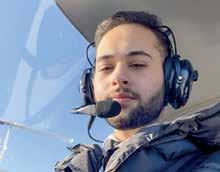
SULAFA ALKHUNAIZI
Sulafa graduated with a Bachelor’s degree in communication and media studies, and international studies from the University of St. Thomas in 2021. She currently works as a reporter with Arab News in Riyadh.
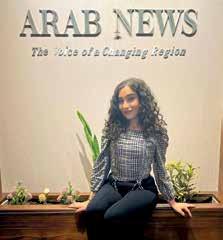
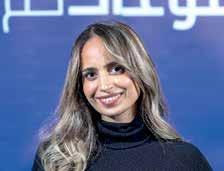
LULWA EL SAKET
After graduating from George Washington University with a Bachelor’s degree in biological sciences in 2021, Lulwa is now pursuing a Master’s degree in genetic counseling at the MGH Institute of Health Professions in Boston.
HELENA HAMDAN
Helena has been living in Germany since graduating from King’s in 2017, and is currently pursuing a Master’s degree in sustainable resource management at the Technical University of Munich. She also works at FERNRIDE as a people and culture intern.
SAMIR IJEILAT
Samir graduated from the University of Sussex last year with a Bachelor’s degree in law. He is now based in London, working as a trader at Samuel and Co. Trading.
LEEN QUTEINEH
Leen graduated with a Bachelor’s degree in law from King’s College London. She is still based in London, where she works as a trainee solicitor at Linklaters LLP.
DINA HALASEH
Dina graduated from the University of Surrey with a degree in psychology. For the past two years, she has worked as a Human Resources community manager at Madfoat.com, a fintech epayments company, at Jordan’s Entrepreneurial and Innovation Association (JEIA).
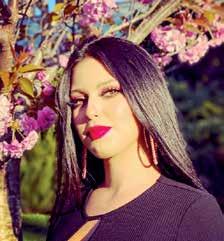
JEEDA ALNABER
Jeeda is currently based in Florida, working as a production and logistics manager at Custom Earth Photos. She graduated from Florida Institute of Technology with a Bachelor’s degree in mechanical engineering in 2021, followed by a Master’s in business administration in 2022. Jeeda attended the first all-alumni reunion on campus in May 2022!
HILANA EL-MEKKOUSSI
Hilana graduates this year from the University of Pennsylvania where she has been pursuing her Master’s in bioengineering and biomedical engineering. She currently works full-time as a research specialist at the Institute for Diabetes, Obesity, and Metabolism at the Perelman School of Medicine, University of Pennsylvania. She is already looking forward to pursuing a doctorate program and has begun applying.
GHAZI ABUKHADRA
Ghazi is currently pursuing a Bachelor’s degree in computer science at Boston College.
ABDULLAH ABUOMAR
Abdullah has been studying at the University of Rochester since graduating from King’s in 2018. He recently completed his Bachelor’s degree in bioengineering and biomedical engineering in 2022, and is excited to complete his Master’s degree in the same fields this spring!
TALAL AL-AZZAM
Talal is in his final year of his undergraduate degree, studying architectural engineering at Carleton University in Ottawa.
ZAID KAYAL
Zaid is expecting to graduate this year from the University of West of England with a Bachelor’s degree in business and management.
RAFE’ ZOU’BI
Since graduating from King’s, Rafe’ has been pursuing his Bachelor’s in medicine from Cardiff University. He is also working as a healthcare support worker with the Cardiff and Vale University Health Board.
SELINA ALMASARWAH
Selina will be graduating from Skidmore College this spring with a Bachelor’s degree in computer science. She is thrilled to be joining Bank of America’s Global Technology Analyst Program as a data analyst in North Carolina after graduating.
ZAID HASAN
Zaid is currently pursuing a Bachelor’s degree in aviation at Mount Allison University in Canada. After many hours of hard work, and the challenges of trying to balance university work and flight college training, Zaid finally got his pilot license. He will soon complete 200 hours of commanding flight time, which will allow him to work as a commercial pilot anywhere in the world — and fulfil his childhood dream of becoming a pilot!
Hilana El-Mekkoussi ’17 Dina Halaseh ’18 at a work event. Zaid Hasan ’19 takes a selfie in the sky.AYAH HUSSEIN
Ayah is all set to graduate from Ozyegin University in Istanbul this year with a Bachelor’s degree in hotel management.
DARIO POMAR AZAR
Dario is enjoying his final year as an undergraduate student at the University of Edinburgh where he is studying law, but finding it difficult to believe it has passed by so quickly! This semester, he will be completing his dissertation on Islamic law and Palestinian national resistance. Next year, he hopes to move to London to sit for the bar exams.
HADEEL SHWWA
Hadeel is finishing her junior year of environmental engineering at Smith College where she has been involved in environmental engineering research of aquatic systems for the past year. She is currently in the process of coauthoring a paper on findings from intensive research conducted over the summer. This past winter, Hadeel interned at the Jordanian Ministry of Environment in Jordan, focusing on wastewater management and policy.
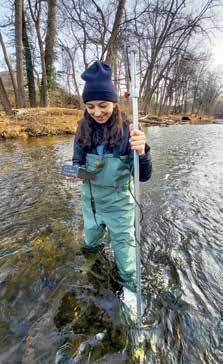
HEND ALZEER
Hend is currently based in Amman, where she’s pursuing her Bachelor’s degree in medicine from the University of Jordan.
NADINE JARRAR
Nadine is currently a junior at Emory University and is set to graduate in 2024. She is on a pre-med track, majoring in neuroscience and behavioral biology.
SALAM KARADSHEH
Salam is a junior at the University of Pennsylvania in Philadelphia, where he is double majoring in computer science and economics. He was able to attend King’s special Class of 2020 Commencement ceremony that took place last May on campus!
OMAR KARZOUN
Omar is currently a third-year student at Royal College of Surgeons in Ireland (RCSI) - Bahrain, pursuing a five-year medicine program.
FANAR AL-DERZI
Fanar is currently a sophomore at the University of Exeter, studying engineering and entrepreneurship. He attended the all-alumni reunion at King’s in May 2022, and helped out by organizing the alumni football tournament during the weekend activities!
LAYAN ALKASAJI
Layan is a second-year bioengineering student at New York University Abu Dhabi. She is currently pursuing undergraduate research focused on designing and fabricating microtubing for bioimaging of zebrafish. The aim of this research is to provide a better understanding of the effects of cancer drugs on zebrafish and ultimately contribute to the development of new and more effective cancer treatments in humans.
SHIYOON LEE
NEDAA’ ALAWAWDEH
Nedaa’ is studying applied physics and engineering at Wellesley College in Massachusetts.
SEIF ALBREIZAT
Seif is currently studying at Al Hussein Technical University. He has applied to Harvard University for fall 2023 and eagerly awaits the decision.
EMILE AL-BILLEH
Emile is pursuing a Bachelor’s degree in computer science at Columbia University in New York.
MAHMOUD ALHAMED
Mahmoud is a first-year student at the University of Toronto, studying chemistry.
TALYA KARAY
Talya is a freshman at University of California, Los Angeles, studying business and economics.
ZEIN MASRI
After graduating from King’s last year, Zein is now based in Boston, majoring in anthropology at Tufts University.
FAJER SARAIREH
Fajer is currently in Amman, pursuing a Bachelor’s degree in cyber security at AlHussein Technical University.
TALA YAISH
Tala is a first-year student at Northeastern University in Boston, studying architecture. Alumni, share your stories with us!
Shiyoon has been in Hong Kong since graduating from King’s, where she is pursuing her Bachelor’s degree at Hong Kong University of Science and Technology (HKUST). She is currently in her second year, majoring in information systems.
ZEID MUSTAFA
Zeid is currently a sophomore at Rhodes College in Memphis, Tennessee. He is studying biochemistry and molecular biology.
MARYAM YOUNES
Maryam is pursuing medicine at the Jordan University of Science and Technology and expects to graduate in 2027.
Alumni, we always hear from you that Class Notes is one of the first sections you turn to in Beyond King’s. Keep your classmates updated with your life events, career progressions, accomplishments, and what you are up to in general! We love hearing from you, and we would love to share your news as a featured article in the next edition of Beyond King’s. So, don’t be shy. Done something !you are proud of? Let us know Visit the Alumni page on our website to submit a class note, or email us anytime at BeyondKings@kingsacademy. edu.jo
Give the gift of lifelong learning

